The Project Gutenberg eBook of Mr. Punch's Life in London
most other parts of the world at no cost and with almost no restrictions
whatsoever. You may copy it, give it away or re-use it under the terms
of the Project Gutenberg License included with this ebook or online
at www.gutenberg.org. If you are not located in the United States,
you will have to check the laws of the country where you are located
before using this eBook.
Title: Mr. Punch's Life in London
Editor: J. A. Hammerton
Release date: May 15, 2012 [eBook #39707]
Language: English
Credits: Produced by Neville Allen, David Edwards and the Online
Distributed Proofreading Team at https://www.pgdp.net (This
file was produced from images generously made available
by The Internet Archive)
*** START OF THE PROJECT GUTENBERG EBOOK MR. PUNCH'S LIFE IN LONDON ***
[Cover]
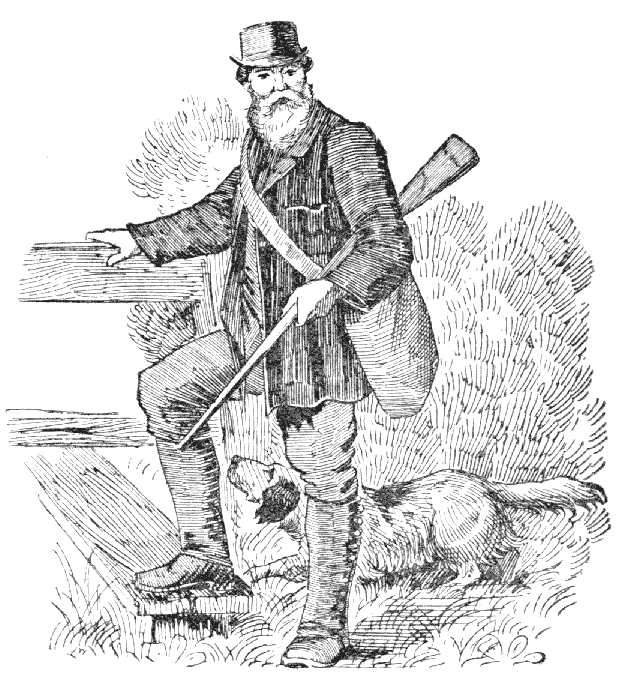
TRANSCRIBER'S NOTE.
Some pages of this work have been moved from the original sequence to enable
the contents to continue without interruption. The page numbering remains unaltered.
MR. PUNCH'S LIFE IN LONDON
[Pg 1]
PUNCH LIBRARY OF HUMOUR
Edited by J. A. Hammerton
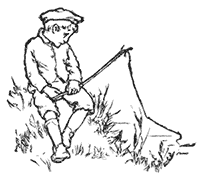
Designed to provide in a series of
volumes, each complete in itself,
the
cream of our national humour,
contributed by the masters of comic
draughtsmanship and the leading wits
of the age to "Punch," from its
beginning in 1841 to the present day.
[Pg 2]
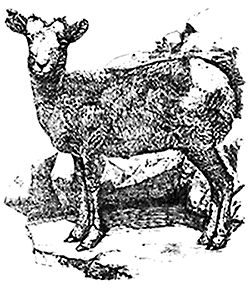
Fussy Old Lady. "Now, don't forget, conductor, I
want the Bank of England."
Conductor. "All right, mum." (Aside.) "She don't want much, do
she, mate?"
[Pg 3]
MR. PUNCH'S LIFE IN LONDON

AS PICTURED BY
PHIL MAY, CHARLES KEENE, GEORGE DU MAURIER, L. RAVEN-HILL,
J. BERNARD PARTRIDGE, E. T. REED, G. D. ARMOUR, F. H. TOWNSEND,
FRED PEGRAM, C. E. BROCK, TOM BROWNE, A. S. BOYD, A. WALLIS MILLS,
STARR WOOD, DUDLEY HARDY, AND MANY OTHER HUMORISTS.

PUBLISHED BY ARRANGEMENT WITH THE PROPRIETORS OF "PUNCH"
THE EDUCATIONAL BOOK CO. LTD.
[Pg 4]
THE PUNCH LIBRARY OF HUMOUR
Twenty-five volumes, crown 8vo. 192 pages
fully illustrated
LIFE IN LONDON
COUNTRY LIFE
IN THE HIGHLANDS
SCOTTISH HUMOUR
IRISH HUMOUR
COCKNEY HUMOUR
IN SOCIETY
AFTER DINNER STORIES
IN BOHEMIA
AT THE PLAY
MR. PUNCH AT HOME
ON THE CONTINONG
RAILWAY BOOK
AT THE SEASIDE
MR. PUNCH AFLOAT
IN THE HUNTING FIELD
MR. PUNCH ON TOUR
WITH ROD AND GUN
MR. PUNCH AWHEEL
BOOK OF SPORTS
GOLF STORIES
IN WIG AND GOWN
ON THE WARPATH
BOOK OF LOVE
WITH THE CHILDREN
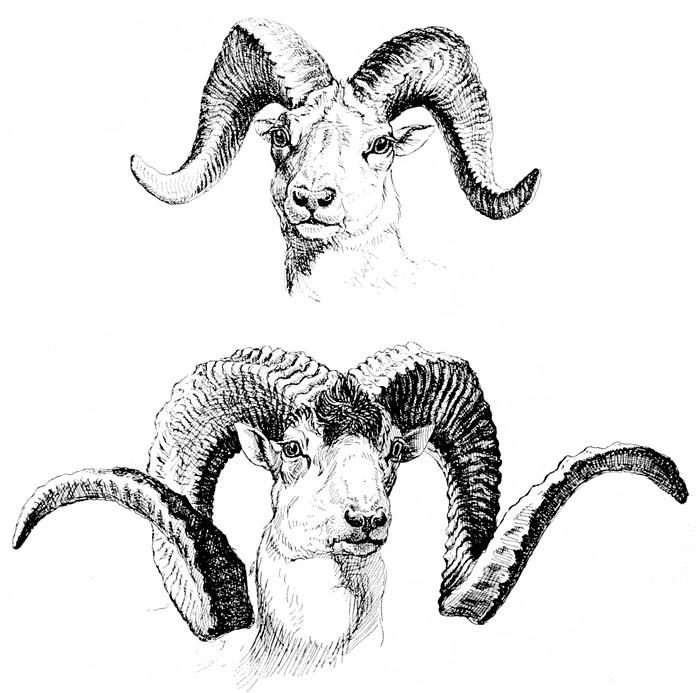
SHAKESPEARE ON THE STREETS
Glendower (to Hotspur). Cousin of many men, I do not bear these
crossings.
[Pg 5]
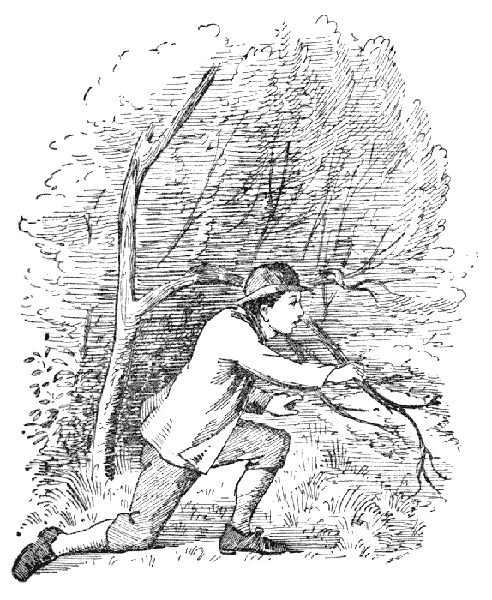
A Sketch in Regent Street.
ROUND THE TOWN
In the sixty-six years of his existence Mr. Punch has at one time or
another touched upon every phase of life in London. He has moved in high
society; he has visited the slums; he has been to the churches, the
theatres, the concert rooms; he has travelled on the railways, in the
'buses and the cabs; he has amused himself on 'Change; he has gone
shopping; he has lounged in the clubs, been a shrewd watcher and
listener at the Law Courts, dined in the hotels and restaurants, sat in
Parliament, made merry in the servants' hall, loitered along the
pavements with a quick eye and ear for the wit and humour of the
streets, and dropped in casually, a genial and observant visitor, at the
homes and haunts of all sorts and conditions of men and women.
[Pg 6]
Obviously it is impossible that the fruits of all this adventuring could
be gathered into a single volume; some of them are garnered already in
other volumes of this series, in books that deal particularly with Mr.
Punch's representations of what he has seen and heard of Society, of the
Cockney, of the Lawyers, of our Domestics, of Clubmen and Diners-out, of
the Theatres; therefore, in the present volume, we have limited him in
the main to his recollections of the actual civic life in London, to his
diversions on the Stock Exchange and in the Money Market generally, his
pictured and written quips and jests about London's businesses and
business men, with glimpses of what he knows of the variously dazzling
and more or less strenuous life that everywhere environs these.
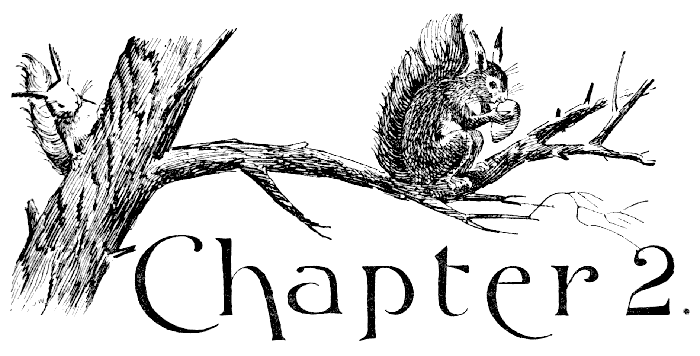
Subject for a Decorative Panel.
[Pg 7]
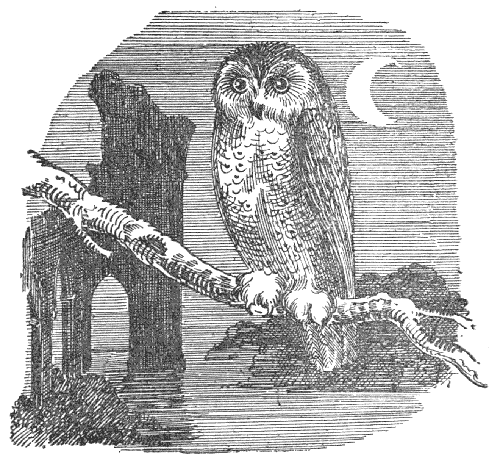
MR. PUNCH'S LIFE IN LONDON
From the Streets.—A street conjuror complained the other day that he
couldn't throw the knives and balls about, because he did not feel in
the vein.
"In what vein?" asked a bystander, weakly.
"The juggler vein, of course, stupid!" was the answer.
[Pg 8]
likewise anglers.
Just Off—the Bourse.—Stockbroker (to Client who has been pretty
well loaded with certain scrip). Well, it just comes to this. Are you
prepared to go the whole hog or none?
Client (timidly). I think I'd rather go the none.
HOUSEHOLD HINTS FOR ECONOMICAL MANAGERS
How to Obtain a good Serviceable Light Porter.—Take a pint of stout,
and add a quart of spring water. There you have him.
How to make Hats last.—Make everything else first.
How to Prevent Ale from Spoiling.—Drink it.
How to Avoid being Considered above your Business.—Never live over
your shop.
How to make your Servants rise.—Send them up to sleep in the attics.
[Pg 9]
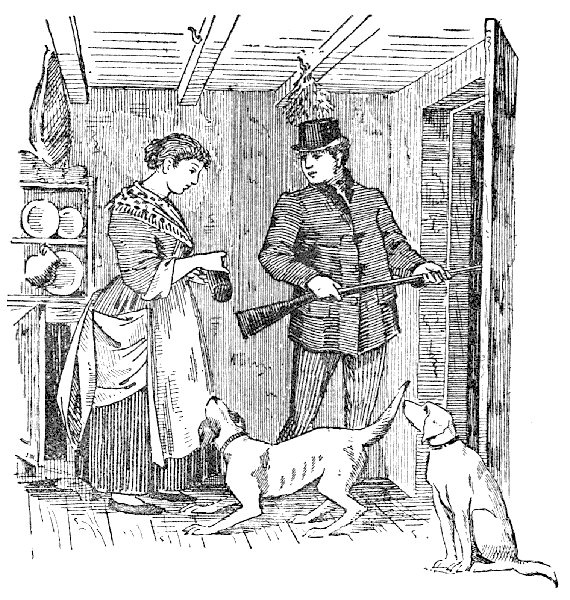
Bus Driver (to charioteer of broken-down motor-car).
"I've been tellin' yer all the week to taike it 'ome, an' now yer wants
to, yer cawn't!"
[Pg 10]
THE STREETS OF LONDON
The stately streets of London
Are always "up" in Spring,
To ordinary minds an ex-
traordinary thing.
Then cabs across strange ridges bound,
Or sink in holes, abused
With words resembling not, in sound,
Those Mrs. Hemans used.
The miry streets of London,
Dotted with lamps by night;
What pitfalls where the dazzled eye
Sees doubly ruddy light!
For in the season, just in May,
When many meetings meet,
The jocund vestry starts away,
And closes all the street.
The shut-up streets of London!
How willingly one jumps
From where one's cab must stop through pools
Of mud, in dancing pumps!
When thus one skips on miry ways
One's pride is much decreased,
Like Mrs. Gilpin's, for one's "chaise"
Is "three doors off" at least.
The free, fair streets of London
Long, long, in vestry hall,
May heads of native thickness rise,
When April showers fall;
And green for ever be the men
Who spend the rates in May,
By stopping all the traffic then
In such a jocose way!
[Pg 11]
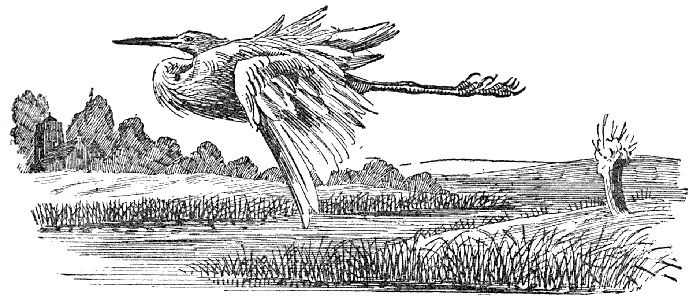
Straphanger (in first-class compartment, to
first-class passenger). "I say, guv'nor, 'ang on to this 'ere strap a
minute, will yer, while I get a light?"
[Pg 12]
Civic Wit.—A City friend of ours, who takes considerable interest in
the fattening of his fowls, alleges, as a reason, that he is an advocate
for widening the Poultry.
any bye laws.
Poetry and Finance.—Among all the quotations in all the money market
and City articles who ever met with a line of verse?
[Pg 13]
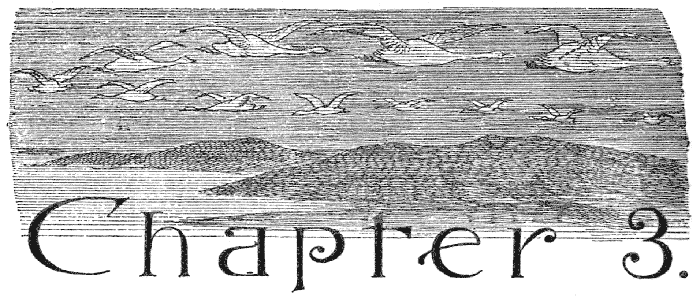
IN A TRAM-CAR
Lady (with smelly basket of fish). "Dessay you'd rather 'ave a
gentleman settin' a-side of you?"
Gilded Youth (who has been edging away). "Yes, I would."
Lady. "Same'ere!"
[Pg 14]

Inquisitive Guardian. "By the way, have you any
children?"
Applicant for Relief. "No."
Guardian. "But—er—surely I know a son of yours?"
Applicant. "Well, I don't suppose you'd call a child children!"
[Pg 15]
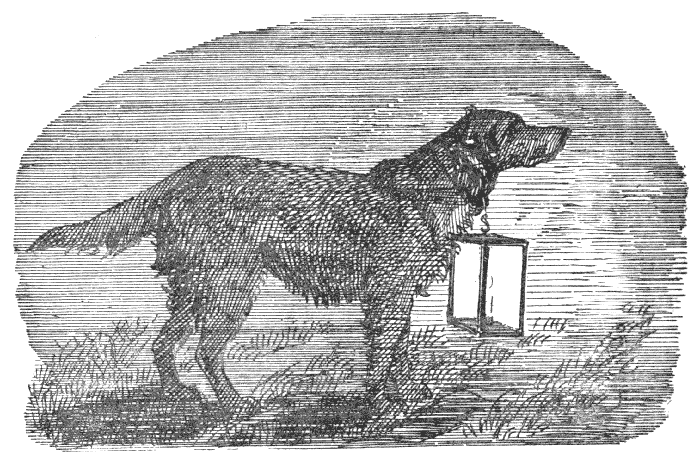
"Please, sir, tuppence worth of butter scrapin's, an'
mother says be sure they're all clean, 'cause she's expectin'
company."
[Pg 16]
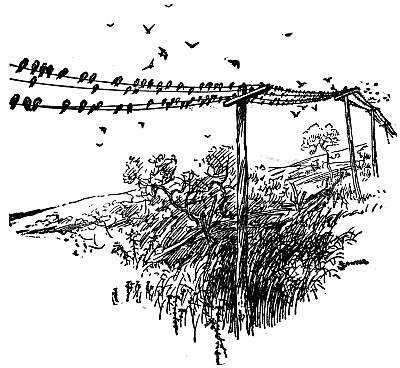
UNCONSCIONABLE
Head of the Firm. "Want a holiday!? Why, you've just been at home ill
for a month!"
[Pg 17]
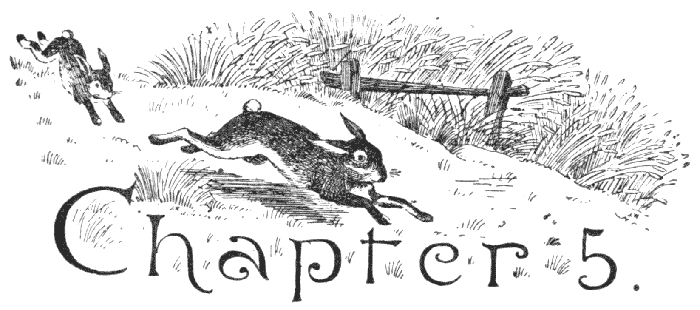
THE FORCE OF HABIT
Traveller (suffering from the Heat of Weather, &c.). "Wesh
Bromp'n—shingl'—cold 'th bit o' lemon—loo' sharp—'r else shan't kesh
my train!"
[Pg 18]
THE EXILED LONDONER
I roam beneath a foreign sky,
That sky is cloudless, warm and clear;
And everything is glad but I;—
But ah! my heart is far from here.
They bid me look on forests green,
And boundless prairies stretching far;
But I rejoice not in their sheen,
And longing turn to Temple Bar.
They bid me list the torrent's roar,
In all its foaming, bounding pride;
But I, I only think the more
On living torrents in Cheapside!
They bid me mark the mighty stream,
Which Mississippi rolls to sea;
But then I sink in pensive dream,
And turn my thoughts, dear Thames, to thee!
They bid me note the mountains high,
Whose snow-capp'd peaks my prospect end;
I only heave a secret sigh—
To Ludgate Hill my wishes tend.
They taunt me with our denser air,
And fogs so thick you scarce can see;
Then, yellow fog, I will declare,
Though strange to say, I long for thee.
And everything in this bright clime
But serves to turn my thoughts to thee!
Thou, London, of an earlier time,
Oh! when shall I return to thee?
[Pg 19]
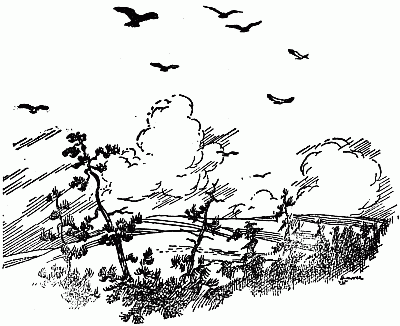
Customer. "That dog I bought last week has turned out
very savage. He's already bitten a little girl and a policeman, and——"
Dealer. "Lor'! how 'e's changed, mum! He wasn't at all particular what
he ate 'ere!"
[Pg 20]
Panic in the City
TIME—3.30 P.M.
Excited Stockbroker.—By Jove! it's serious now.
Other dittos. Hey? what?
Excited Stockbroker. Rothschild's "gone"—
Clients (new to City, thunderstruck). Gone! Rothschild!!—but—
Excited Stockbroker. Yes. Gone to Paris.
[Exit.
of the Spectacle-makers is to get up the Lord Mayor's Show. Glasses
round, and then they proceed to business.
But, "the happy mean"—oh no—impossible.
heather!"
[Pg 21]
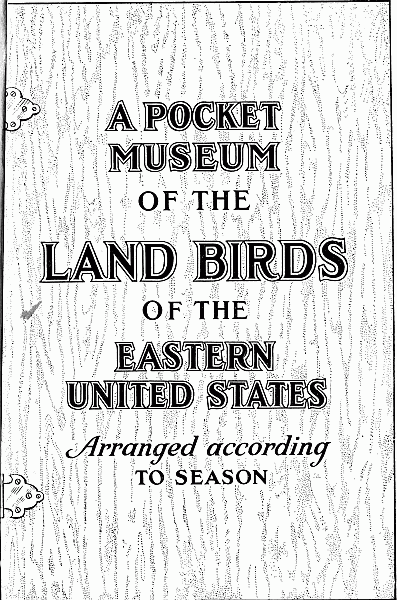
Progress.
Fair Club Member (lately married, to friend). "Bye, bye!
Can't stop! Must rush off, or I shall be scratched for the billiard
handicap!"
[Pg 22]
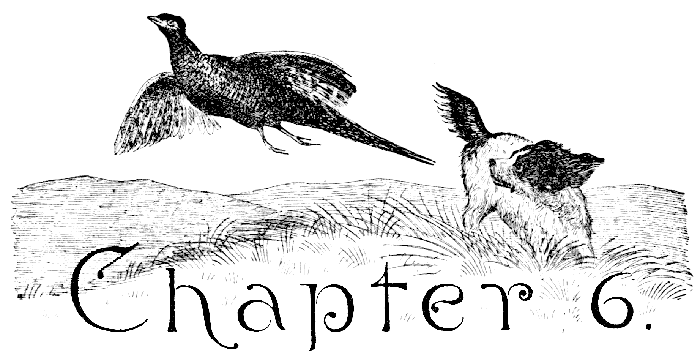
Policeman (to slightly sober individual, who is
wobbling about in the road amongst the traffic). "Come, old man, walk
on the pavement."
Slightly Sober Individual. "Pavement! Who do you take me for?
Blondin?"
[Pg 23]
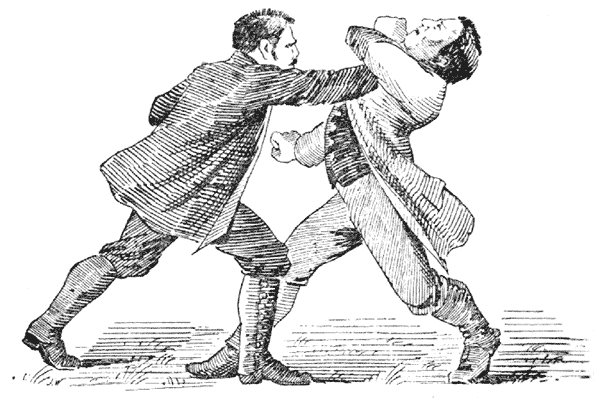
SKETCHED IN OXFORD STREET
[Pg 24]
for-bear."
The Price of Bread.—Twists have taken a turn; and cottages have come
down in some places, owing to the falls of bricks, which continue to
give way rapidly. A baker near one of the bridges has not had a roll
over, which is to be accounted for by his having come down in regular
steps to a level with the lower class of consumers. Plaster of Paris is
in some demand, and there have been some mysterious transactions in
sawdust by the baker who liberally deals with the workhouse.
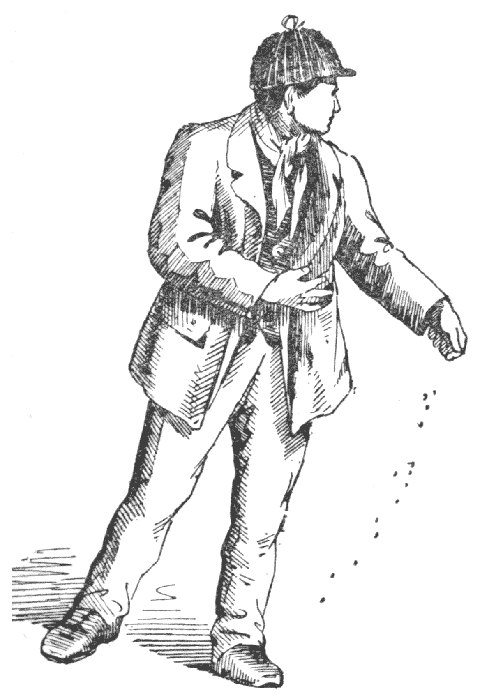
SYMPHONY IN BLACK
umbrellas by Government.
[Pg 25]
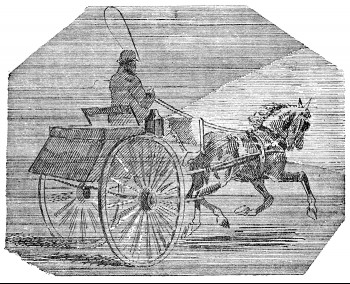
HE DIDN'T MEAN TO LOSE THAT
"Miffins, the book-keeper, tells me that you have lost the key of the
safe, and he cannot get at the books."
"Yes, sir, one of them. You gave me two, you remember."
"Yes; I had duplicates made in case of accident. And the other?"
"Oh, sir, I took care of that. I was afraid I might lose one of them,
you know."
"And is the other all right?"
"Yes, sir. I put it where there was no danger of it being lost. It is in
the safe, sir!"
[Pg 26]
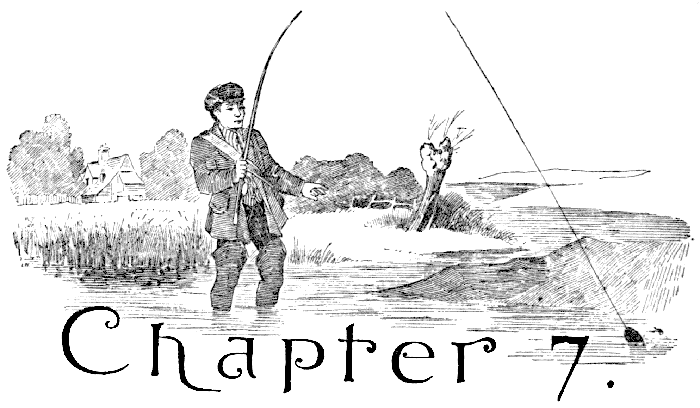
IN A NOVEMBER FOG
Frenchman (just arrived on his first visit to London). "Ha, ha! my
frien', now I understan' vot you mean ven you say ze sun nevaire set in
your dominion, ma foi! It does not rise!"
[Pg 27]
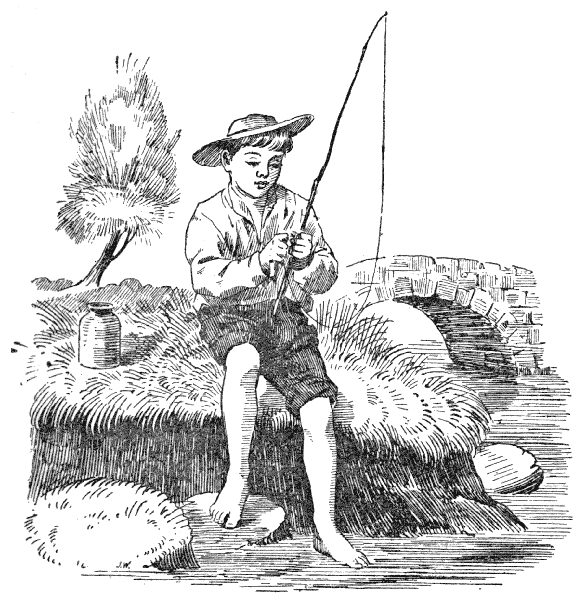
"NEVER TOO LATE TO MEND"
Thirsty Soul (after several gyrations round the letter-box). "I
sh'like t'know wha'-sh-'e good 'f gen'lem'n-sh turn'n tea-tot'ller 'f
gov'm'nt (hic) goes-h an' cut-sh th' shpouts-h o' th' bumpsh off!"
[Pg 28]
THE LONDONER'S DIARY
Monday.—Got up at nine o'clock. Lounged to the park. No one there.
Went to bed at twelve.
Tuesday.—Got up at ten o'clock. Walked to the House of Commons.
Closed. Went to bed at eleven.
Wednesday.—Got up at eleven o'clock. Looked in at Prince's. Deserted.
Went to bed at ten.
Thursday.—Got up at twelve o'clock. Strolled to the club. Shut up for
repairs. Went to bed at nine.
Friday.—Got up at one o'clock. Stayed at home. Dull. Went to bed at
eight.
Saturday.—Got up at five a.m. Went out of town at six.
The Reverse of the School for Scandal.—A school in which very few
members of society are brought up—a charity school.
[Pg 29]
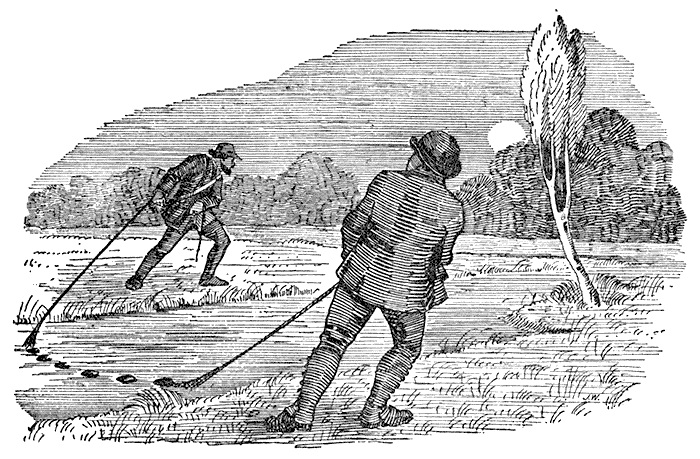
PAST RECLAIMING
Brixton Barber. "Revival seems to be in the hair, sir."
Customer. "Not in mine!"
[Pg 30]
FOG
Thou comest in familiar guise,
When in the morning I awake,
You irritate my throat and eyes,
I vow that life's a sad mistake.
You come to hang about my hair,
My much-enduring lungs to clog,
I feel you with me everywhere,
Our own peculiar London fog.
You clothe the City in such gloom,
We scarce can see across the street,
You seem to penetrate each room,
And mix with everything I eat.
I hardly dare to stir about,
But sit supine as any log;
You make it torture to go out,
Our own peculiar London fog.
spiritualism, wishes to try to turn the multiplication table.
[Pg 31]
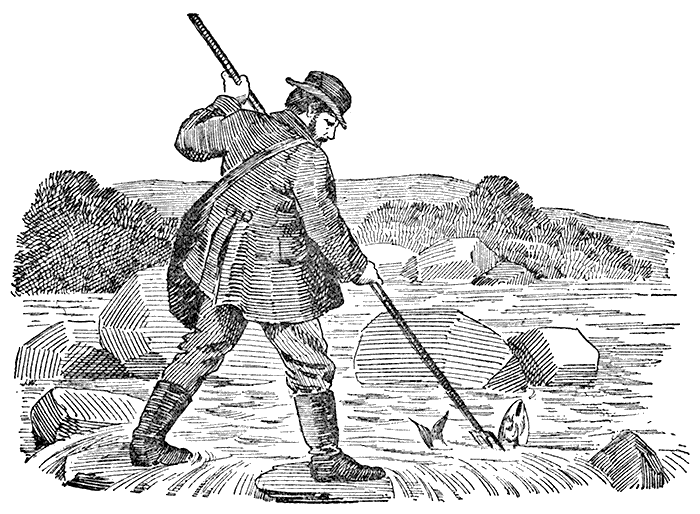
'Bus Driver (to Cabby, who is trying to lash his horse
into something like a trot). "Wot's the matter with 'im, Willum? 'E
don't seem 'isself this mornin'. I believe you've bin an' changed 'is
milk!"
[Pg 32]
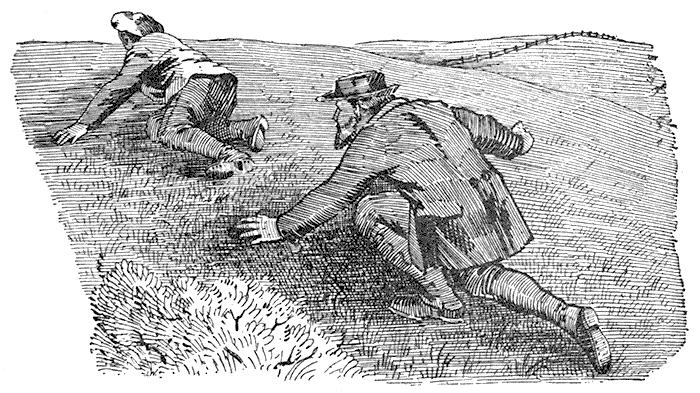
A SKETCH FROM LIFE
Chorus (slow music). "We're a rare old—fair old—rickety, rackety
crew!"
[Pg 33]
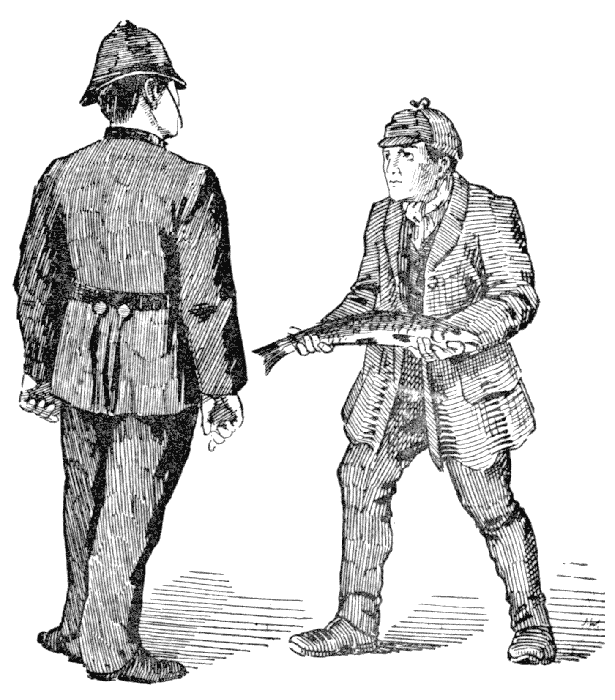
Scene—In a 'Bus.
First City Man. "D——d hot, isn't—— I—I beg your pardon, madam,
I—I quite forgot there was a lady pres——"
Stout Party. "Don't apologise. It's much worse than that!"
[Pg 34]
THE CAPITALISTS
"What, Brown, my boy, is that you?" said Smith, heartily.
"The same, and delighted to see you," was the reply.
"Have you heard the news, my dear fellow?" asked Smith.
"You mean about the position of the Bank of England? Why, certainly; all
the City is talking about it."
"Ah, it is absolutely grand! Never was the Old Lady of Threadneedle
Street in such a strong position. Marvellous! my dear friend; absolutely
marvellous!"
"Quite so. Never were we—as a people—so rich!"
"Yes, prosperity seems to be coming back by leaps and bounds."
"You never said anything so true," observed Smith.
"Right you are," cried Brown.
And then the two friends shook hands once[Pg 36] more with increased
cordiality, and passed on. They walked in different directions a few
steps, and both stopped. They turned round.
"Smith," said Brown, "I have to ask you a trifling favour."
"Brown, it is granted before I know its purport."
"Well, the truth is, I am penniless—lend me half-a-crown."
Smith paused for a moment.
"You surely do not wish to refuse me?" asked Brown in a tone of pained
surprise.
"I do not, Smith," replied his friend, with fervour. "Indeed, I do not!"
"Then produce the two-and-sixpence."
"I would, my dear fellow, if in the wide world I could raise it!"
And then the ancient comrades shook hands once again, and parted in
sorrow, but not in anger. They felt that after all they were only in the
fashion.
[Pg 35]
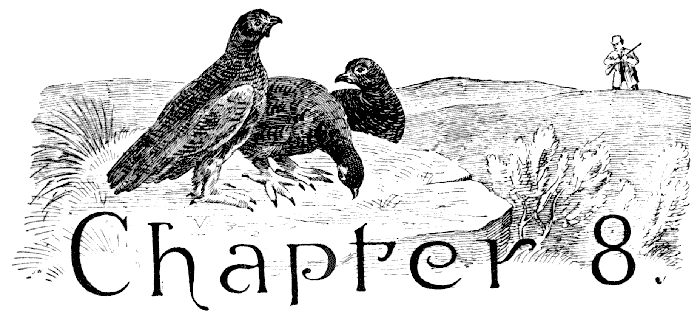
A NEGLECTED INDUSTRY
"'Ow are yer gettin' on, Bill?"
"Ain't gettin' on at all. I'm beginnin' to think as the publick doesn't
know what they wants!"
Too Common a Thing.
A member of a limited liability company in a bad way, said he should turn itinerant preacher.
He was asked why? He said he had had a call.
[Pg 37]
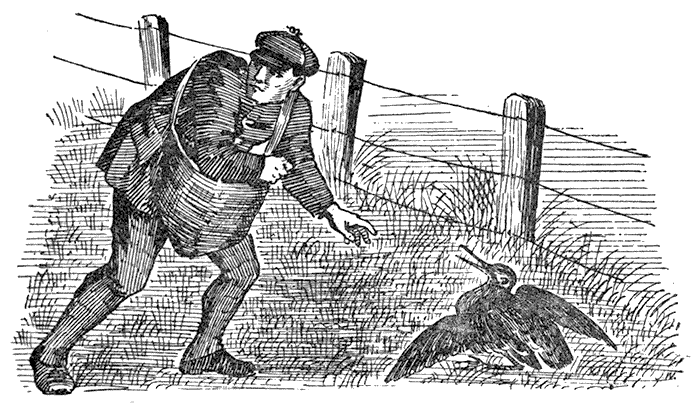
Country Cousin. "Do you stop at the Cecil?"
'Bus Driver. "Do I stop at the Cecil!—on twenty-eight bob a
week!"
[Pg 38]
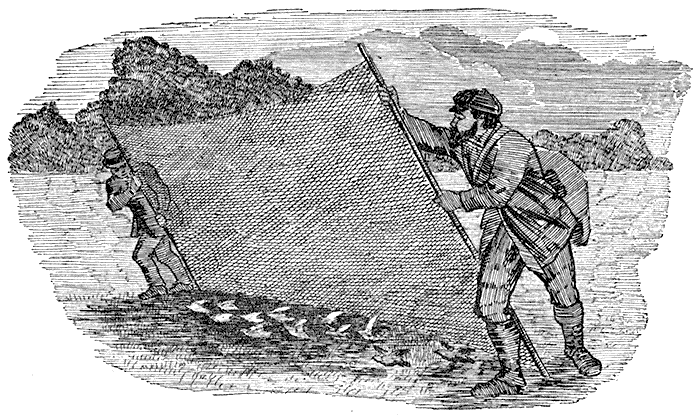
Frightful Levity.
Bus-Driver. "Hullo, gov'nour; got any room?"
Policeman, Driving Van (with great want of self-respect).
"Just room for one; saved a place a purpose for you, sir."
Bus-Driver. "What's yer fare?"
Policeman. "Bread and water; same as you had afore!"
[Pg 39]
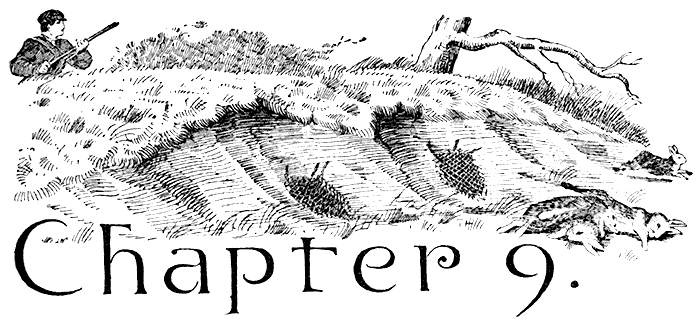
A Misunderstanding.
Old Gent. (evidently from the Shires). "Hi! hoy! stop!"
Conductor. "'Old 'ard Bill!" (To Old Gent.) "Where are yer for, sir?"
Old Gent. (panting in pursuit).
"Here!—let's have a—box o' them—safety matches!"
[Objurgations!
[Pg 40]
ON THE SPECULATIVE BUILDER
He's the readiest customer living,
While you're lending, or spending or giving;
But when you'd make profit, or get back your own,
He's the awkwardest customer ever you've known.
morning!"
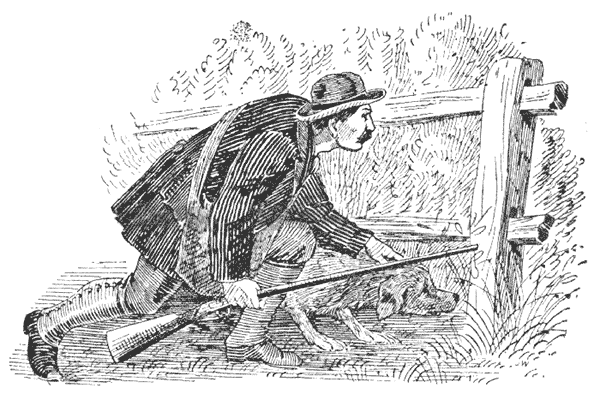
Thorough!
Hairdresser (to perspiring Customer during
the late hot weather). "'Hair cut, sir?"
Stout Party (falling into the chair, exhausted). "Ye——"
Hairdresser. "Much off, sir?"
Stout Party. "(Phew!) Cut it to the bone!"
[Pg 41]
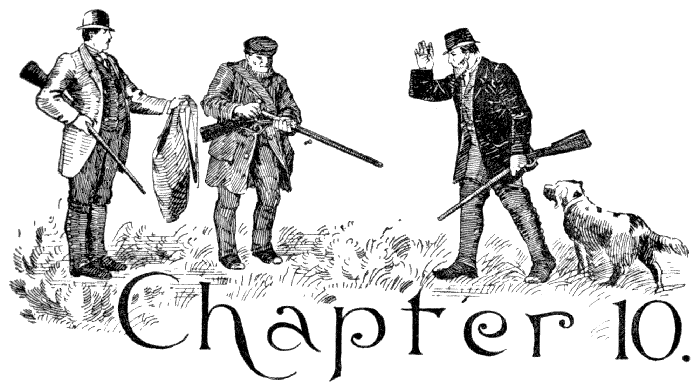
DIVERTING THE TRAFFIC!
that when he has nothing else to do he casts up his eyes.
[Pg 42]
NEW LONDON STREET DIRECTORY
Adam Street.—Antediluvian anecdotes and traditions still linger here.
Air Street.—Doctors send their patients to this locality for change.
Aldermanbury.—Visited by numbers of bereaved relatives.
Amwell Street.—Always healthy.
Barking Alley.—To be avoided in the dog days.
Boy Court.—Not far from Child's Place.
Camomile Street.—See Wormwood Street.
Coldbath Square.—Very bracing.
Distaff Lane.—Full of spinsters.
Farm Street.—Highly sensitive to the fluctuations of the corn market.
Fashion Street.—Magnificent sight in the height of the season.
First Street.—Of immense antiquity.
Friday Street.—Great jealousy felt by all the other days of the
week.
[Pg 44]
Garlick Hill.—Make a little détour.
Glasshouse Street.—Heavily insured against hailstorms.
Godliman Street.—Irreproachable.
Great Smith Street.—Which of the Smiths is this?
Grundy Street.—Named after that famous historic character—Mrs.
Grundy.
Hercules Buildings.—Rich in traditions and stories of the "Labours"
of the Founder.
Homer Street.—Literally classic ground. The house pointed out in
connection with "the blind old bard" has long since disappeared.
Idol Lane.—Where are the Missionaries?
Ivy Lane.—This, and Lillypot Lane, and Woodpecker Lane, and
Wheatsheaf Yard, and White Thorn Street, all sweetly rural. It is
difficult to make a selection.
Lamb's Conduit Street.—Touching description (by the oldest
inhabitant) of the young lambs coming to drink at the conduit.
Liquorpond Street.—See Philpot Lane.
Love Lane.—What sort of love? The "love of the turtle?"
[Pg 46]
| Lupus Street. | |||
| } | Both dangerous. | ||
| Maddox Street. |
Milk Street.—Notice the number of pumps.
Mincing Lane.—Mincing is now mostly done elsewhere, by machinery.
Orchard Street.—The last apple was gathered here about the time that
the last coursing match took place in Hare Court.
Paper Buildings.—Wonderfully substantial! Brief paper extensively
used in these buildings.
| Paradise Street. | ||
| } | Difficult to choose between the two. | |
| Peerless Street. |
| Poultry. | ||
| } | Crowded at Christmas. | |
| Pudding Lane. |
Quality Court.—Most aristocratic.
Riches Court.—Not a house to be had for love or money.
Shepherdess Walk.—Ought to be near Shepherds' Bush.
Trump Street.—Noted for whist.
Type Street.—Leaves a most favourable impression.
World's End Passage.—Finis.
[Pg 43]
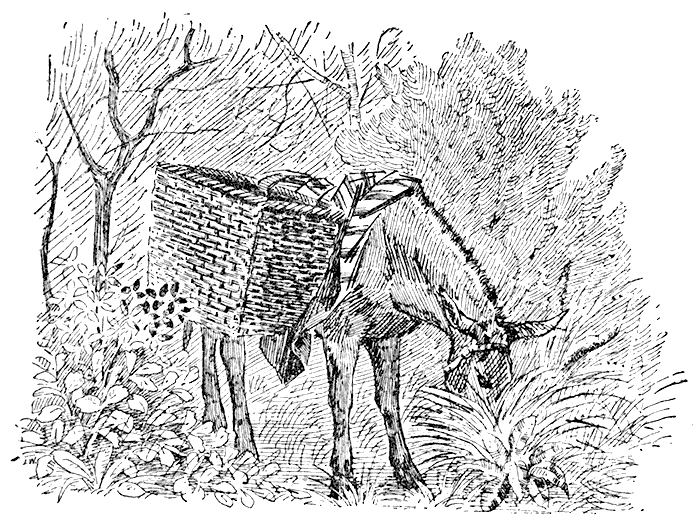
A Qualified Guide.
Befogged Pedestrian. "Could you direct me to the river, please?"
Hatless and Dripping Stranger. "Straight ahead. I've just come from it!"
[Pg 45]
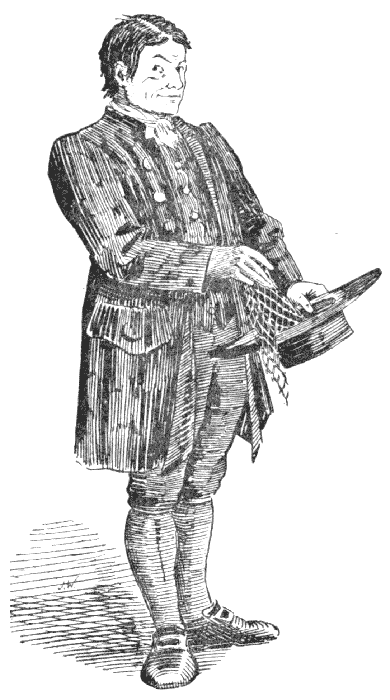
FASHIONABLE AND SEASONABLE.
Where to sup al fresco in the hottest weather. The "Whelkome Club"]
[Pg 47]
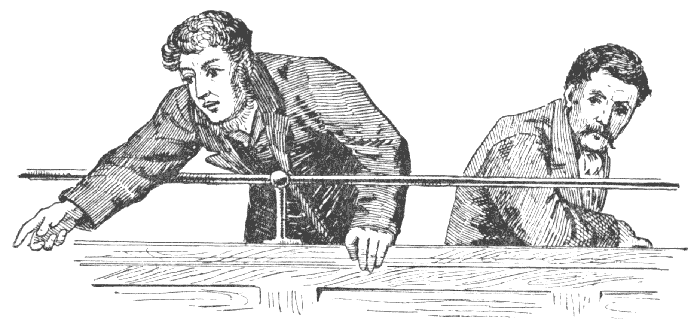
Sacrifice.
Good Templar. "Tut—t—t—really, Swizzle,
it's disgraceful to see a man in your position in this state, after the
expense we've incurred and the exertions we've used to put down the
liquor traffic!"
Swizzle. "Y' may preash as mush as y' like,
gen'l'm'n, bur I can tell y' I've made more persh'nal efforsh to (hic)
purrown liquor than any of ve!"
[Pg 48]
A LONDON FOG
A fog in London daytime like the night is,
Our fellow-creatures seem like wandering ghosts,
The dull mephitic cloud will bring bronchitis;
You cannon into cabs or fall o'er posts.
The air is full of pestilential vapours,
Innumerable "blacks" come with the smoke;
The thief and rough cut unmolested capers,
In truth a London fog's no sort of joke.
You rise by candle-light or gaslight, swearing
There never was a climate made like ours;
If rashly you go out to take an airing,
The soot-flakes come in black plutonian show'rs.
Your carriage wildly runs into another,
No matter though you go at walking pace;
You meet your dearest friend, or else your brother
And never know him, although face to face.
The hours run on, and night and day commingle,
Unutterable filth is in the air;
You're much depressed, e'en in the fire-side ingle,
The hag dyspepsia seems everywhere.
Your wild disgust in vain you try to bridle,
Mad as March hare or hydrophobic dog,
You feel, in fact, intensely suicidal:
Such things befall us in a London fog!
[Pg 49]
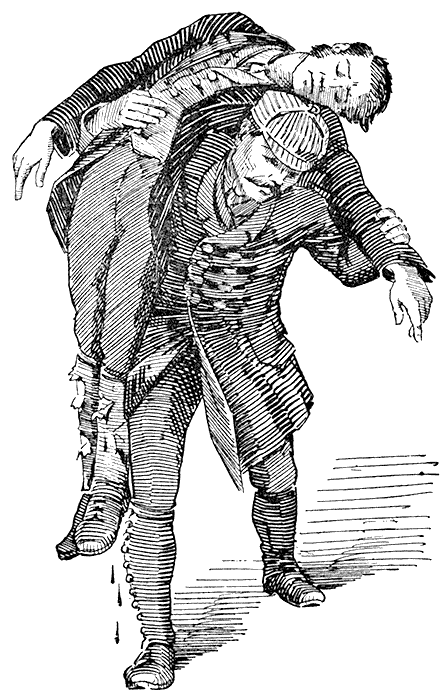
Not quite what he meant.
Joan (on her annual Spring visit to London). "There, John, I think
that would suit me."
Darby (grumblingly). "That, Maria? Why, a pretty figure it would
come to!"
Joan. "Ah, John dear, you're always so complimentary! I'll go and ask
the price."
[Pg 50]
STARTING A SYNDICATE
Scene—An Office in the City. Time—After Lunch.
Present—Members of a proposed Syndicate.
First Member. And now, gentlemen, to business. I suppose we may put
down the capital at fifty thousand?
Second Mem. Better make it five hundred thousand. Half a million is so
much easier to get.
Third Mem. Of course. Who would look at a paltry fifty?
First Mem. Perhaps you are right. Five pound shares, eh?
Fourth Mem. Better make them sovereigns. Simpler to manipulate.
First Mem. I daresay. Then the same solicitors as our last?
Fifth Mem. Yes, on the condition that they get a firm to undertake the
underwriting.
First Mem. Necessarily. The firm I propose, gentlemen, are men of
business, and quite recognise that nothing purchases nothing.
[Pg 52]
Second Mem. And they could get the secretary with a thousand to
invest.
First Mem. Certainly. Our brokers, bankers, and auditors as before.
Eh, gentlemen?
Fifth Mem. On the same conditions.
First Mem. That is understood. And now the prospectus is getting into
shape. Is there anything else anyone can suggest?
Fourth Mem. Oughtn't we to have some object in view?
First Mem. Assuredly. Making money.
Fourth Mem. Don't be frivolous. But what I mean is, should we not know
for what purpose we are going to expend the half million?
First Mem. Oh, you mean the name. Well, that comparatively unimportant
detail we might safely leave until our next pleasant gathering.
In Extremis.
good intentions.
"Walker!"
their business, when so few of them live over their shops!
[Pg 51]
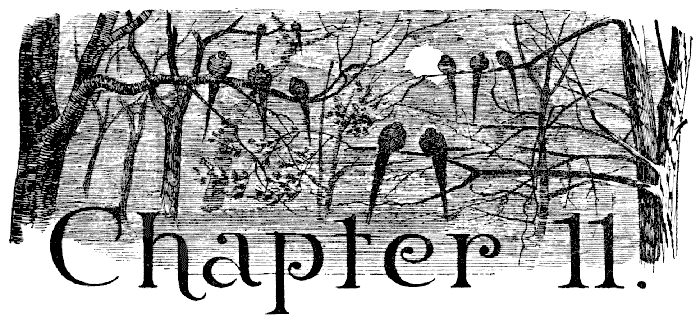
An early morning snapshot in the suburbs. Mr. Bumpus
dresses his window.
[Pg 53]
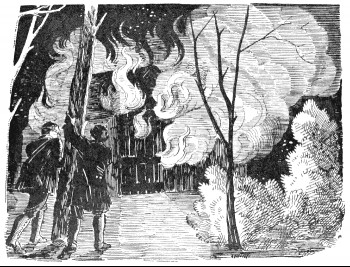
METROPOLITAN IMPROVEMENTS
[Pg 54]
EXAMINATION FOR A DIRECTORSHIP
Promoter. Are you a gentleman of blameless reputation?
Candidate. Certainly, and I share that reputation with a dozen
generations of ancestors.
Promoter. And no doubt you are the soul of honour?
Candidate. That is my belief—a belief shared by all my friends and
acquaintances.
Promoter. And I think, before taking up finance, you have devoted a
long life to the service of your country?
Candidate. That is so. My career has been rewarded by all kinds of
honours.
Promoter. And there is no particular reason why you should dabble in
Stock Exchange matters?
Candidate. None that I know of—save, perhaps, to serve a friend.
Promoter. Now, be very careful. Do you[Pg 56] know anything whatever about
the business it is proposed you should superintend?
Candidate. Nothing whatever. I know nothing absolutely about business.
Promoter. Then I have much pleasure in informing you that you have
been unanimously elected a member of the board of management!
[Pg 55]
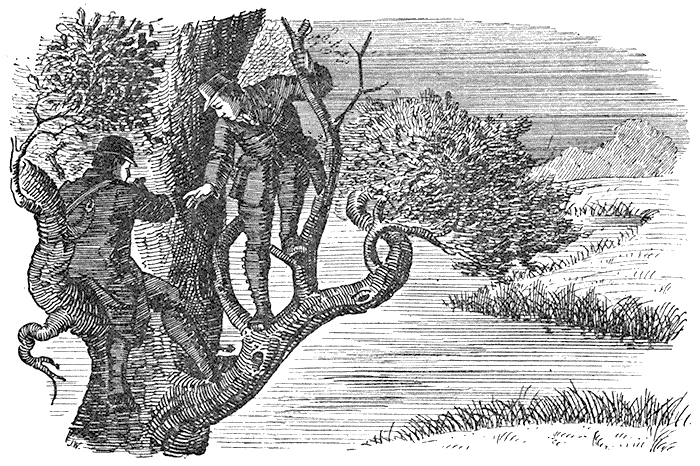
"Perfeck Lidy" (who has just been ejected). "Well,
next time I goes into a publickouse, I'll go somewhere where I'll be
respected!"
RIDDLE FOR THE CITY
Oh! why, my friend, is a joint stock
Concern like, yet unlike, a clock?
Because it may be wound up; when,
Alas! it doesn't go again.
always use a big, big D!"
immersed in business?—When he's giving a swimming lesson.
[Pg 57]
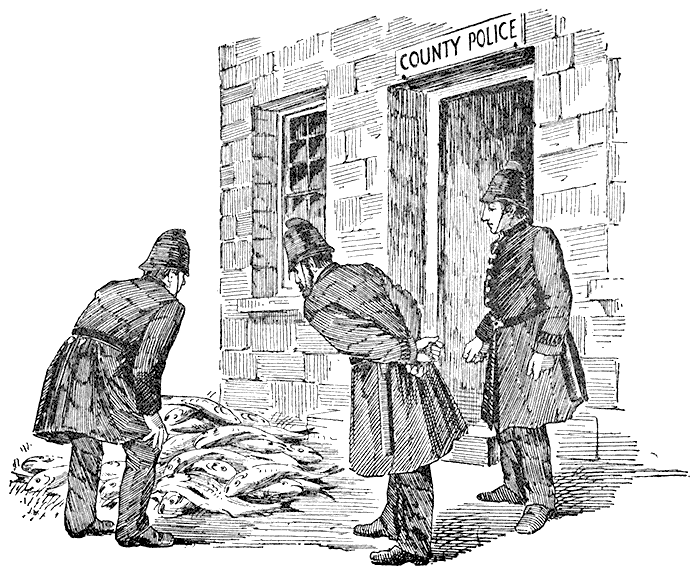
Baker. "I shall want another ha'penny. Bread's gone up
to-day."
Boy. "Then give us one of yesterday's."
[Pg 58]
WHY I AM IN TOWN
Because I have long felt a strong desire to know by personal experiment
what London is like at this season of the year.
Because the house requires some repairs, and I am anxious to be on the
spot to look after the workpeople.
Because the progress of my book on Universal Eccentricity renders it
necessary that I should pay frequent visits to the library of the
British Museum.
Because I have been everywhere, and know every place.
Because the sanitary condition of the only place I at all care to go to
is not altogether satisfactory.
Because my Uncle Anthony is expected home every day from Australia, and
I am unwilling to be absent from town when he arrives.
Because my cousin Selina is going to be married from her stepfather's at
Upper Clapton, and insists on my giving her away to the gentleman with
whom she is about to penetrate into the interior of Africa.
[Pg 60]
Because I am desirous to avail myself of this opportunity of completing
some statistical tables I am compiling, showing the comparative numbers
of horses, carriages, and pedestrians passing my dining-room windows on
the last Saturday in May and the last Saturday in August respectively.
Because my eldest son is reading with a private tutor for his army
examination, and I feel I am of some use to him in his studies.
Because my Aunt Philippa is detained in town by an attack of gout, and
expects me to call and sit with her three times a day.
Because I am determined to put into execution my long-cherished design
of thoroughly exploring the British Museum, the National Gallery, the
South Kensington Museum, St. Paul's, Westminster Abbey, the public
monuments, and the City churches.
Because it is pecuniarily inconvenient to me to be anywhere else.
Notice.
The gentleman who, the other day, ran away from home, without
stopping to take his breath, is requested to fetch it as quickly as
possible.
[Pg 59]
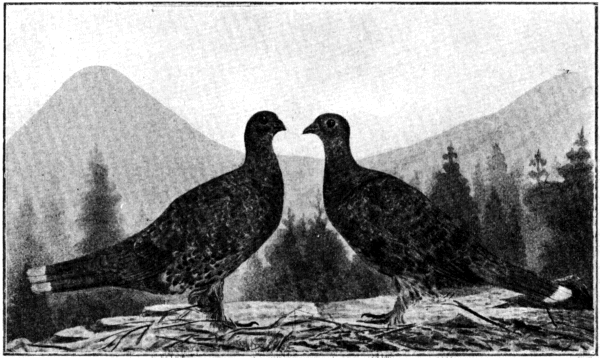
Fogged.
Cabman (who thinks he has been passing a line
of linkmen). "Is this right for Paddington?"
Linkman. "'Course it is!
First to the right and straight on. 'Aven't I told ye that three times
already? Why, you've been drivin' round this square for the last 'arf
hour!"
[Pg 61]
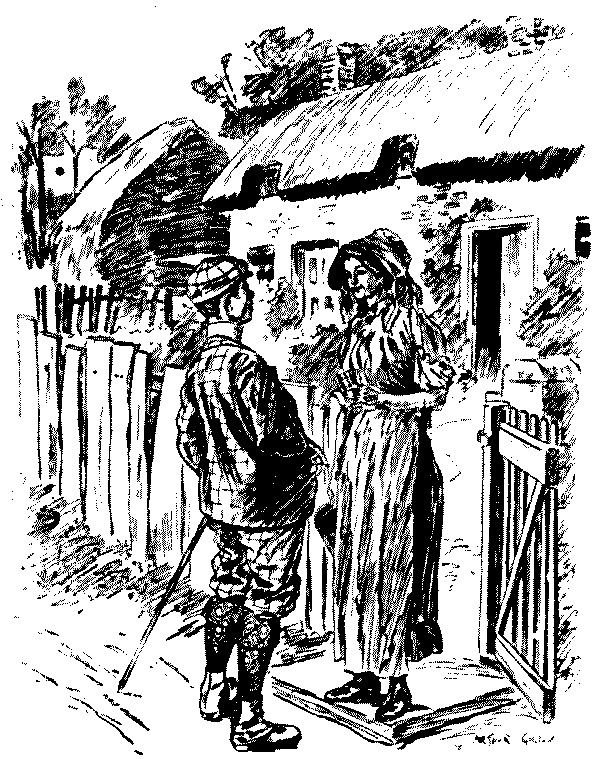
Virtuous Indignation.
Betting Man (to his Partner).
"Look 'ere, Joe! I 'ear you've been gamblin' on the Stock Exchange! Now,
a man must draw the line somewhere; and if that kind of thing goes
on, you and me will 'ave to part company!"
[Pg 62]
MISNOMERS
You start a company to make it go,
It fails, and so you drop it;
It didn't go but yet has gone, and so
You wind it up to stop it.
Stocks in your garden you will surely find
By want of rain are slaughtered;
Yet many stocks have languished and declined
Because they have been watered.
Suppose a company for brewing beer
Should come to a cessation—
That is—"dry up" 'tis curious to hear
It's called "in liquidation."
Prehistoric London.
Some archæologists have discovered an analogy
between the druidical worship and a form of semitic idolatry. It has
been surmised that the Old Bailey derives its name from having been the
site of a temple of Baal.
The Rule of Rome.—An "Inquiring City Clerk," fresh from his Roman
history, writes to ask if "S.P.Q.R." stands for "Small profits, quick
returns."
[Pg 63]
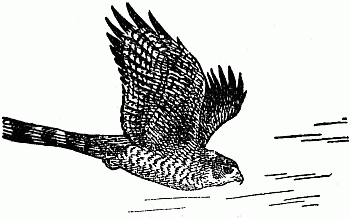
MELTING MOMENTS
Friend. "How does this weather suit you, old chap?"
Bankrupt Proprietor. "Oh, down to the ground! You see, I'm in
liquidation!
[Pg 64]
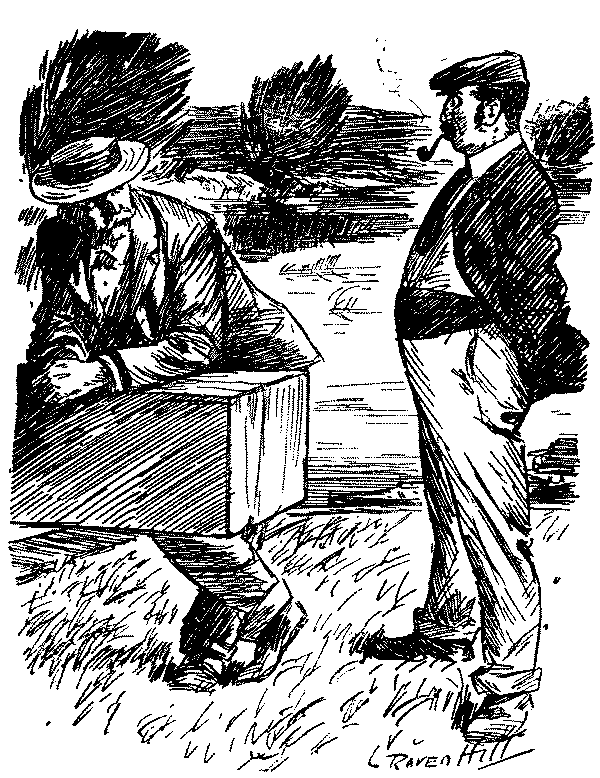
Johnny (who has to face a bad Monday, to Manager at
Messrs. R-thsch-ld's). "Ah! I—want to—ah!—see you about an
overdraft." Manager. "How much do you require?" Johnny. "Ah!—how
much have you got?"
[Pg 65]
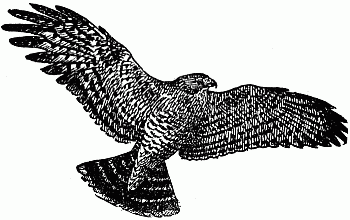
French Lady. "Picca-di-lee Circus." Obliging
Conductor. "All right. One pence." French Lady (who rather prides
herself on her English pronunciation). "I anterstond ze Engleeshe
langue." Obliging Conductor. "Oh, all right. Keep yer 'air on!"
lights of the metropolis?
[Pg 66]
notice one of "The Universal Disinfector Company." Our broker has
instructions to procure us some shares, if they are in good odour.
canons.
have your laundress's address, avoid asking her where she "hangs out."
the deposit of the banks of the Thames.
[Pg 67]
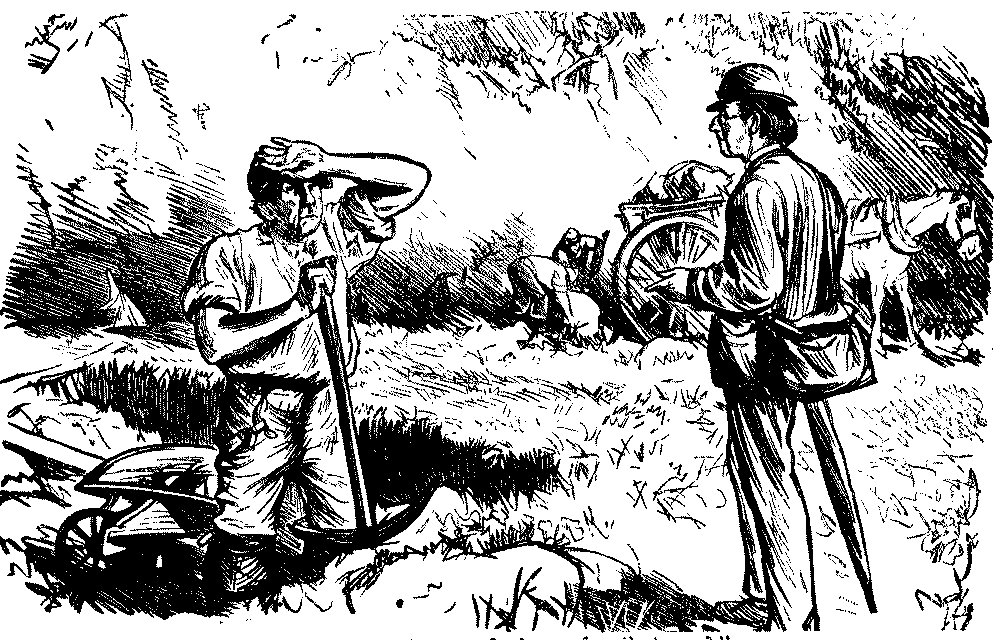
Bus-driver. "All right, ladies! You're quite safe.
They're werry partikler wot they eats!"
[Pg 68]
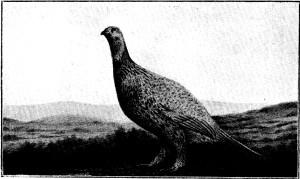
METROPOLITAN IMPROVEMENTS
The next sensational literary advertisement; or, things of beauty in our
streets.
Bank.
[Pg 69]
STOCK EXCHANGE
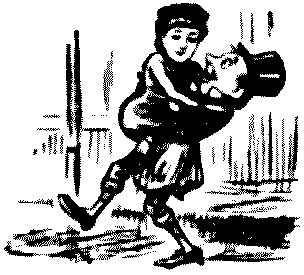 Carrying over | 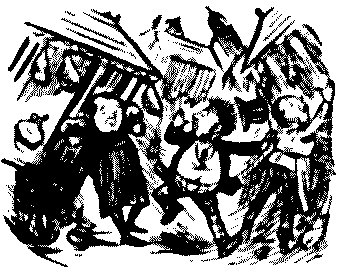 Market falling |
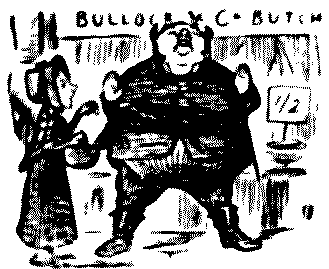 Market firm | 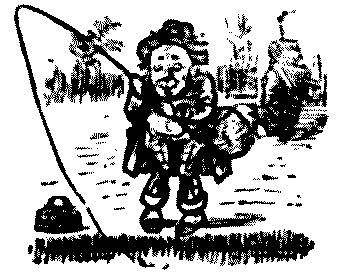 Preparing for a rise |
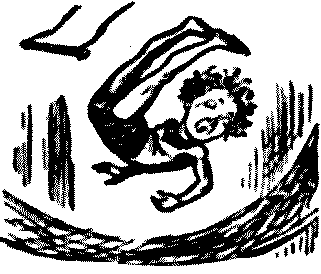 Arranging for a fall | 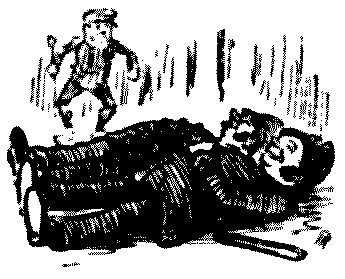 Home securities flat |
[Pg 70]
A NEW WAY TO GET A FRESH APPETITE
Young Visitor. Really, sir, you must excuse me. I am compelled to
refuse.
Old Alderman (with profound astonishment). What, refuse these
beautiful grouse? It's impossible!
Young Visitor. It is impossible, I can assure you, sir. I cannot eat
any more.
Old Alderman (tenderly). Come, come. I tell you what now. Just take
my advice, and try a cold chair.
Times.
did you call that man at the bar "the Microbe"?
Eminent Financier. Because he's "in everything."
[Pg 71]
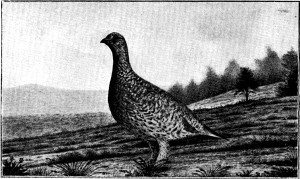
Following the Fashion.
Baked-Tater Merchant. "'Ow's
trade! Why fust-rate!! I'm a-goin' to conwert the bis'ness into a
limited liability comp'ny—and retire into private life!!!"
[Pg 72]
SONGS OF THE STREETS
Upon the kerb a maiden neat—
Her watchet eyes are passing sweet—
There stands and waits in dire distress:
The muddy road is pitiless,
And 'buses thunder down the street!
A snowy skirt, all frill and pleat;
Two tiny, well-shod, dainty feet
Peep out, beneath her kilted dress,
Upon the kerb!
She'll first advance and then retreat,
Half frightened by a hansom fleet.
She looks around, I must confess,
With marvellous coquettishness!—
Then droops her eyes and looks discreet,
Upon the kerb!
lift.
[Pg 73]
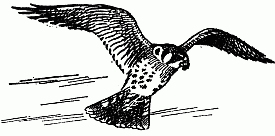
[Pg 74]
PUNCH'S COUNTRY COUSIN'S GUIDE
8 a.m.—Rise, as in the country, and stroll round the squares before
breakfast, to see the turn out of cooks and charwomen. Ask your way back
of the first policeman you meet.
9 a.m.—Breakfast. First taste of London milk and butter. Analyse, if
not in a hurry. Any policeman will show you the nearest chemist.
10 a.m.—To Battersea Park to see carpets beaten. Curious atmospheric
effects observable in the clouds of dust and the language of the
beaters. Inquire your road of any policeman.
11 a.m.—Take penny steamer up to Westminster Bridge, in time to arrive
at Scotland Yard, and inspect the police as they start on their various
beats. For any information, inquire of the inspector.
12 p.m.—Hansom cab races. These can be viewed at any hour by standing
still at a hundred yards from any cabstand and holding up a shilling.[Pg 76]
An amusing sequel may be enjoyed by referring all the drivers to the
nearest policeman.
1 p.m.—Observe the beauties of solitude among the flowers in Hyde Park.
Lunch at the lodge on curds and whey. Ask the whey of the park keeper.
2 p.m.—Visit the exhibitions of painting on the various scaffoldings in
Belgravia. Ask the next policeman if the house painters are Royal
Academicians. Note what he says.
3 p.m.—Look at the shops in Bond Street and Regent Street, and purchase
the dummy goods disposed of at an awful sacrifice.
4 p.m.—See the stickleback fed at the Westminster Aquarium. If nervous
at being alone, ask the policeman in waiting to accompany you over the
building.
5 p.m.—Find a friend still in town to give you five o'clock tea in her
back drawing-room—the front of the house being shut up.
6 p.m.—Back to the park. Imagine the imposing cavalcades in Rotten Row
(now invisible), with the aid of one exercising groom and the two
daughters of a riding-master in full procession.
7 p.m.—Wake up the waiters at the Triclinium[Pg 78] Restaurant, and persuade
them to warm up dinner for your benefit.
8 p.m.—Perambulate the Strand, and visit the closed doors of the
various theatres. Ask the nearest policeman for his opinion on London
actors. You will find it as good as a play.
9 p.m.—A Turkish bath may be had in Covent Garden Theatre. Towels or
programmes are supplied by the policemen at the doors.
10 p.m.—Converse, before turning in, with the policeman on duty or the
fireman in charge of the fire-escape. Much interesting information may
be obtained in this way.
11 p.m.—Supper at the cabmen's shelter, or the coffee stall corner of
Hyde Park. Get a policeman to take you home to bed.
[Pg 75]
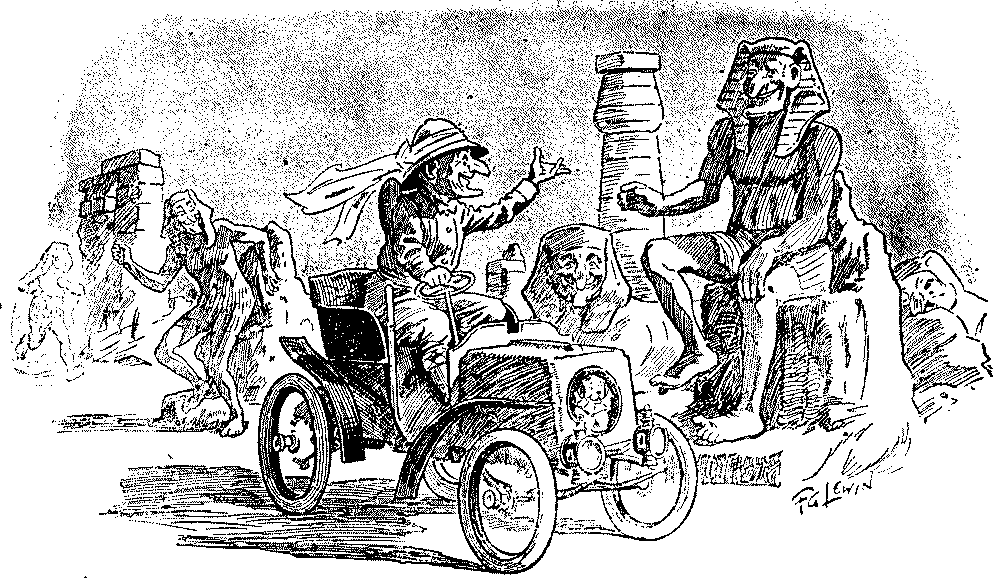
Benevolent Old Gentleman. "Poor little thing! Is it
hurt?"
[But it was only the week's washing.
[Pg 77]
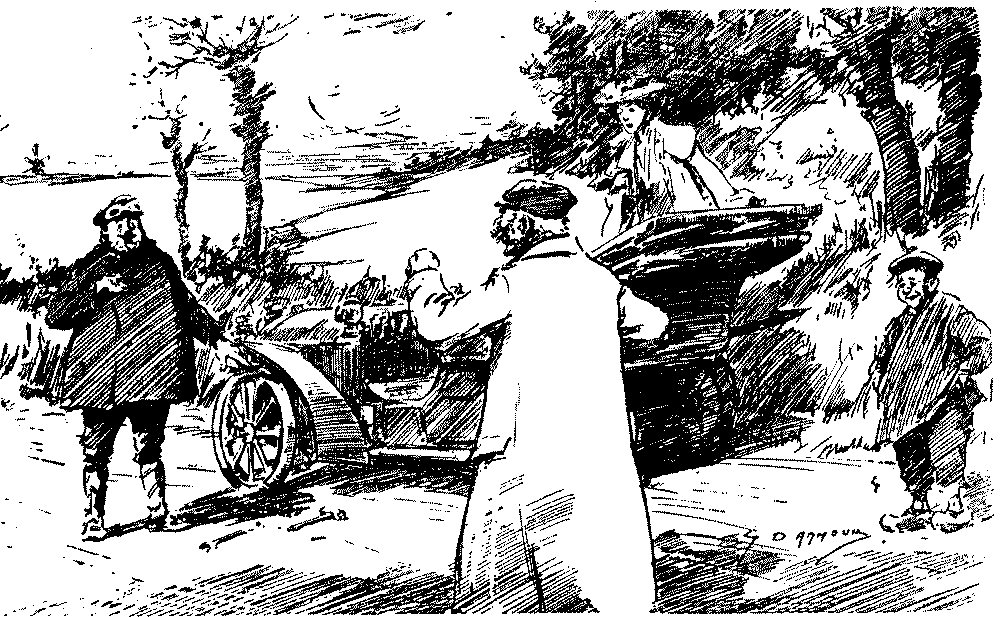
Amenities of the road.
Robert. "Now then, four-wheeler, why couldn't you pull up sooner? Didn't you see me 'old up
my 'and?"
Cabby (suavely). "Well, constable, I did see a kind of
shadder pass acrorst the sky; but my 'orse 'e shied at your feet!"
A. A Cab-ana.
for it is continually "taking up" and "putting down" people.
[Pg 79]
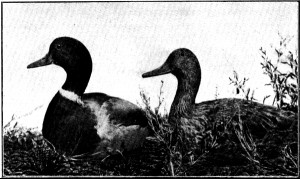
Groom (whose master is fully occupied with
unmanageable pair which has just run into rear of omnibus). "Well,
anyway, it wasn't the guv'nor's fault."
'Bus Conductor. "No—it was your fault, for letting 'im drive!"
[Pg 80]
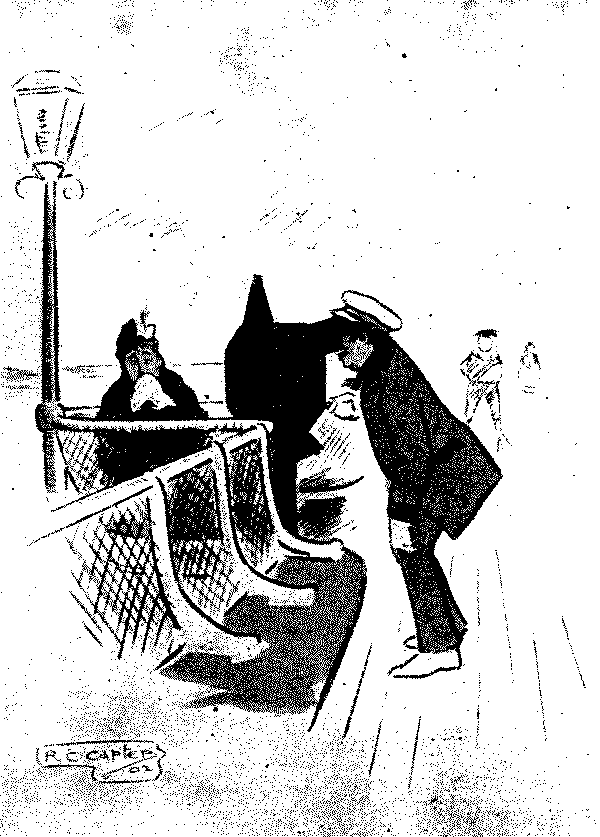
"The way we Build now."
Indignant Houseowner (he had heard it was so much cheaper, in the end,
to buy your house). "Wh' what's the—what am I!—wha' what do you suppose is the meaning of this,
Mr. Scampling!"
Local Builder. "'T' tut, tut! Well, sir, I 'spects
some one's been a-leanin' agin it!!"
[Pg 81]
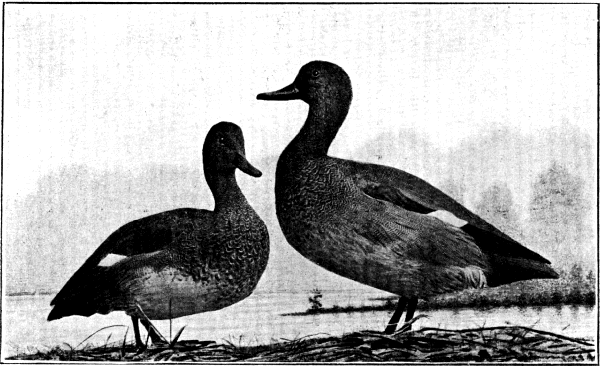
GETTING HIS ANSWER
Important Old Gent (from the country, who thinks the lofty bearing of
these London barmaids ought to be "taken down a bit"). "Glass of ale,
young woman; and look sharp, please!"
Haughty Blonde (blandly). "Second-class refreshments lower down,
sir!!"
[Pg 82]
THE MEAT MARKET
Legs were freely walked off, and there was a pressure on ribs owing to
the rush of beggars; but knuckles came down, while calves'-heads were
looking-up steadily. At Smithfield, there was a rush of bulls, but the
transactions were of such a hazardous nature as to appear more like a
toss-up than firm business. Any kind of security was resorted to, and
the bulls having driven a well-known speculator into a corner, he was
glad to get out as he could, though an attempt was made to pin him to
his position.
Pigs went on much at the old rates; and briskness could not be obtained,
though the coupons were freely offered.
The weather having been favourable to slaughtering, calves have not been
brought to the pen—but there is something doing in beef, for the "Last
of the Barons" is advertised.
[Pg 83]
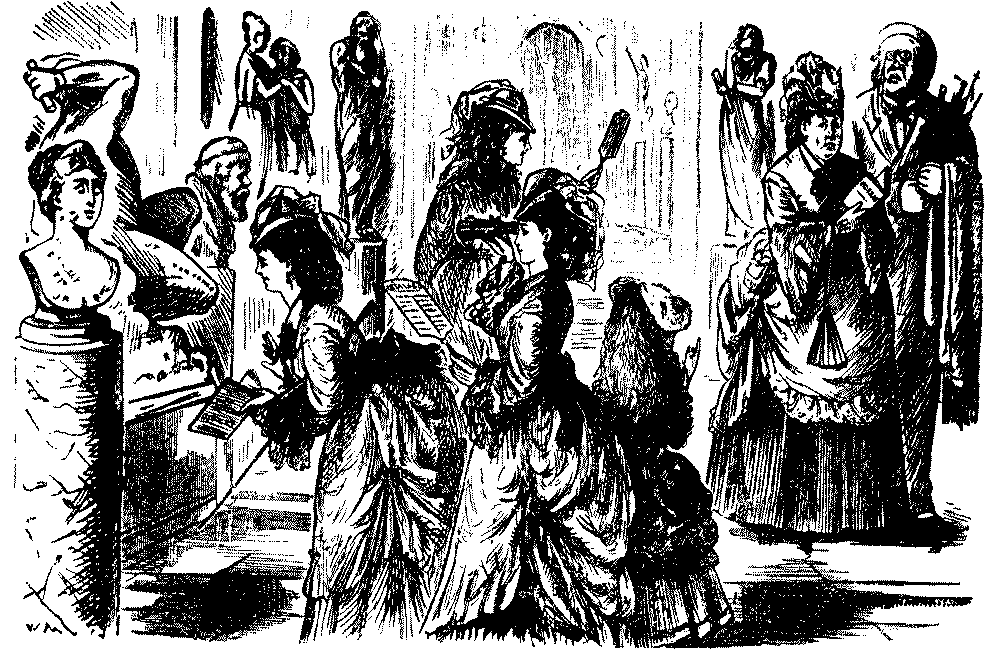
A CASE OF MISTAKEN IDENTITY
Old Gentleman (returning from City festivity). "Pleashm'n, where'sh
M'sht'r Brown live?"
Constable (recognising him). "Why, dear me, sir, you are Mr. Brown!"
Mr. B. "Aw right! Bu'—where do I live?"!
[Pg 84]
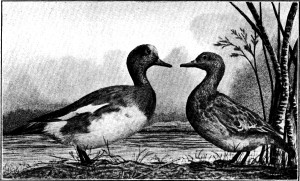
Cheap Jack.
"I will make a present of this genooine
gold watch—none of your carrots—to henny lady or gentleman for fifteen
shillings an' sixpence. Why am I doin' this? To hencourage trade, that
is why I am givin' it away for fourteen shillings an' sixpence. Look at
it for yourselves, for fourteen shillings! If yer don't believe it's
gold, jump on it?"
[Pg 85]
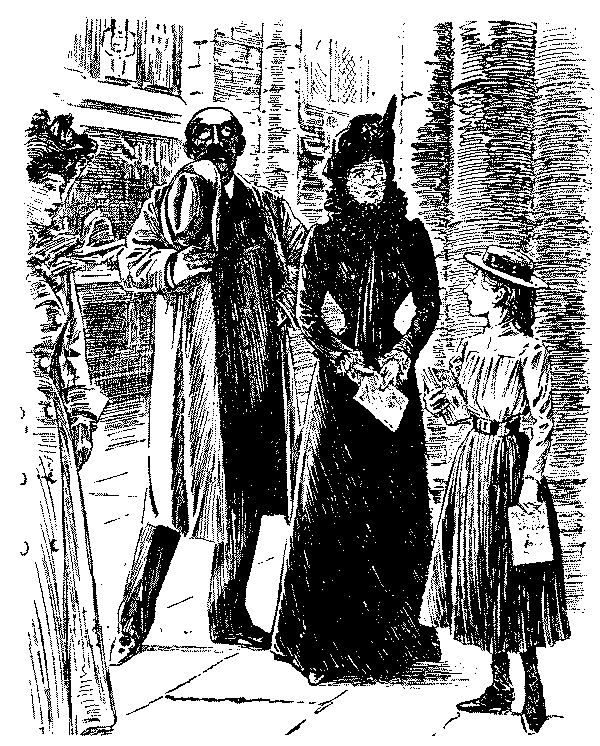
At the Diamond Jubilee.
First Doubtful Character. "My eye, mate, this is a squash!"
Second D. C. "Squash! Why, s'elp me, if I ain't 'ad my 'and in this cove's pocket for the larst twenty minits,
an' can't get it out!"
[Pg 86]
BACK TO TOWN
Back to town, and it certes is rapture to stand,
And to hear once again all the roar of the Strand;
I agree with the bard who said, noisy or stilly,
By gaslight or daylight, he loved Piccadilly;
The wanderer's heart with emotion doth swell,
When he sees the broad pavement of pleasant Pall Mall.
Some folks like the City; wherever they range,
Their hearts are still true to the Royal Exchange;
They've beheld alpine summits rise rank upon rank,
But the Matterhorn's nothing compared with the Bank;
And they feel quite rejoiced in the omnibus ride,
As that hearse for the living rolls up through Cheapside.
The mind of a man is expanded by travel,
But give me my house on the Kensington gravel:
The wine of the Frenchman is good, and his grub,
But he isn't devoted to soap and the tub;
Though it may be my prejudice, yet I'll be shot,
If I don't think one Englishman's worth all the lot!
With Germans I've no disposition to quarrel,
Though most of their women resemble a barrel;
And, as for myself, I could never make out
The charms of their schnitzel and raw sauer-kraut;
While everyone owns, since the last mighty war,
Your average Teuton's too bumptious by far.
I think it's been stated before, that you roam
To prove to yourself that there's no place like home,
Though lands that are lovely lie eastward and west,
Our "tight little island," believe me, 's the best;
Through Paris, Berlin, and Vienna you've passed,
To find that there's nothing like London at last!
[Pg 87]
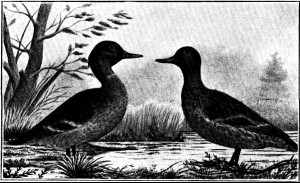
New Assistant (after hair-cutting, to Jones, who has
been away for a couple of weeks). "Your 'air is very thin be'ind, sir.
Try singeing!"
Jones (after a pause). "Yes, I think I will."
N. A. (after singeing). "Shampoo, sir? Good for the 'air, sir."
Jones. "Thank you. Yes."
N. A. "Your moustaches curled?"
Jones. "Please."
N. A. "May I give you a friction?"
Jones. "Thank you."
N. A. "Will you try some of our——"
Manager (who has just sighted his man, in stage whisper). "You idiot!
He's a subscriber!!"
[Pg 88]
Mrs. R. was in an omnibus lately. The streets were so badly paved, she
says, that the osculations were most trying to elderly people, though
the younger ladies did not seem to object to them.
Signs of a Severe Winter in London
Early departure of swallows from Swallow Street.
Poet's Corner covered with rime.
Wild ducks on the Stock Exchange.
Coals raised.
Cynic's Motto for Kelly's Directory (by the kind permission of the
Author of "Dead Men whom I have known.")—Living men whom I don't want
to know.
City Intelligence.—Should the proposed asylum for decayed bill brokers,
jobbers, and others on 'Change be ultimately built, it will probably be
at Stock-holm.
[Pg 89]
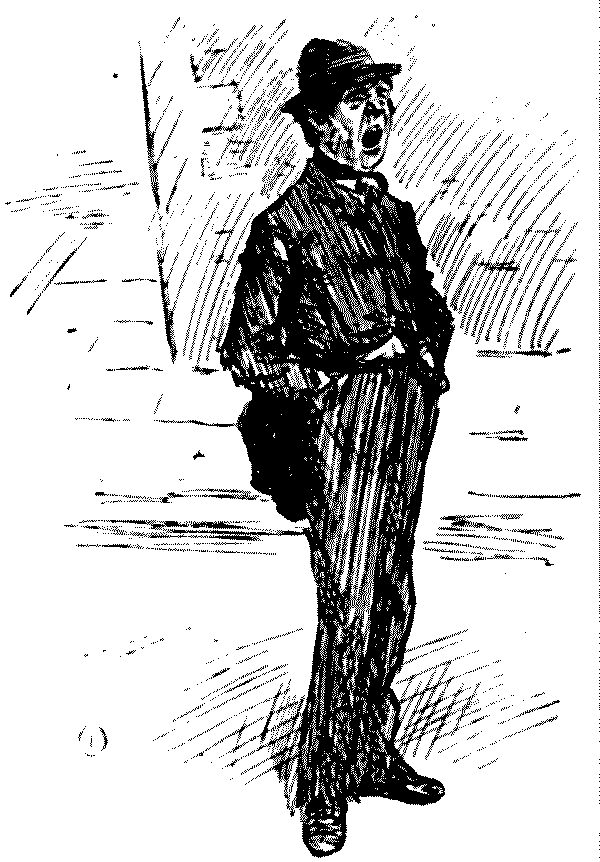
Convenient.
Lodger (who has been dining). "D' you have
any 'bjecks'n t' my 'shcaping up into my rooms shec'nd floor? F'got my
la'ch-key!!"
[Pg 90]
Fashionable Intelligence.—A new club, composed entirely of aristocratic
literary ladies, is in course of formation; it is to be called "The Blue
Lights."
NURSERY RHYME FOR THE TIME
Bye baby bunting,
Daddy's gone a hunting
On the Stock Exchange, to catch
Some one who is not his match;
If he has luck,
As well as pluck,
A coach he'll very likely win
To ride his baby bunting in.
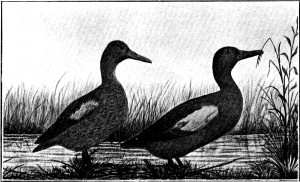
"CASTING ACCOUNTS"
[Pg 91]
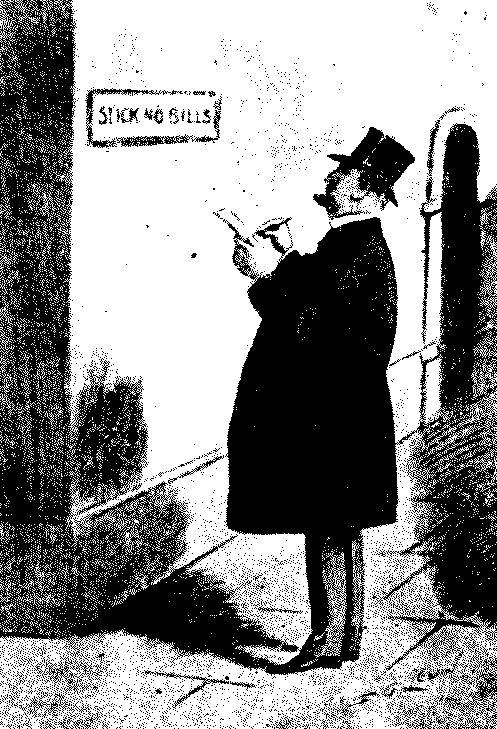
Our French Visitors.
First Frenchman (his first time in London). "Tiens, Alphonse! Qui est cet
homme-là?"
Second Frenchman (who, having been here once before is
supposed to know all about it). "Chut! Plus bas, mon ami." (Whispers
in reverential tone.) "Ce monsieur-là—c'est le Lor' Maire!"
[Pg 92]
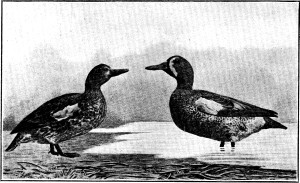
BULL AND BEAR
Of this establishment how can we speak?
Its cheese is mitey and its ale is weak.
prefer?
A Cit's bath.
[Pg 93]
MONEY MARKET
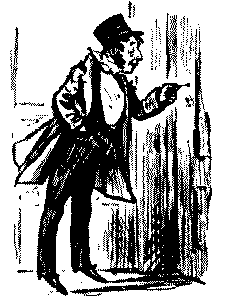 Tightness observable at the opening | 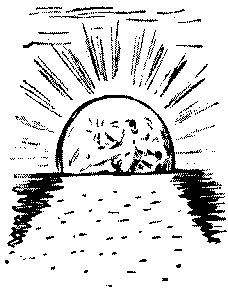 A decline at the close |
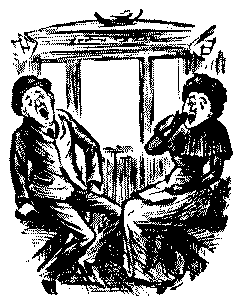 Railways were dull | 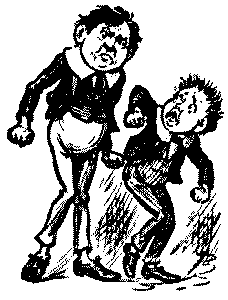 Bullyin' movements |
[Pg 94]
of next week.
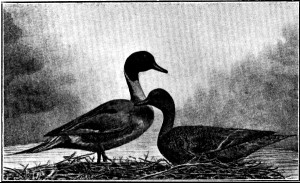
A NEW TERROR FOR THE UNPUNCTUAL CLERK
Switzerland phonographic clocks and watches, which pronounce the hour
most distinctly.]
[Pg 95]
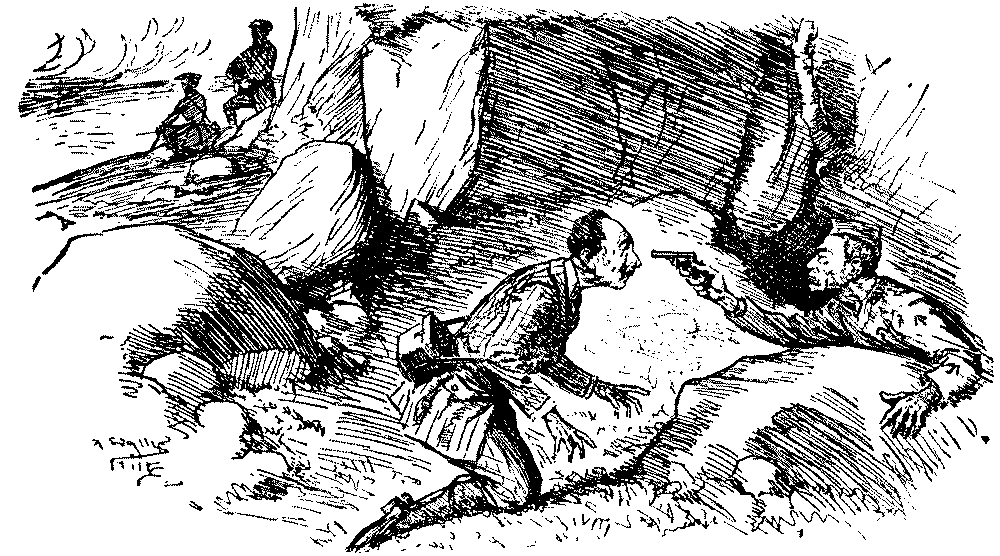
THE OBSTINACY OF THE PARENT
Emily Jane. "Yes, I'm always a-sayin' to father as 'e oughter retire
from the crossin', but keep at it 'e will, though it ain't just no more
'n the broom as 'olds 'im up!"
[Pg 96]
THE MONEY MARKET
The scarcity of money is frightful. As much as a hundred per cent., to
be paid in advance, has been asked upon bills; but we have not yet heard
of any one having given it. There was an immense run for gold, but no
one got any, and the whole of the transactions of the day were done in
copper. An influential party created some sensation by coming into the
market late in the afternoon, just before the close of business, with
half-a-crown; but it was found, on inquiry, to be a bad one. It is
expected that if the dearth of money continues another week, buttons
must be resorted to. A party, whose transactions are known to be large,
succeeded in settling his account with the bulls, by means of
postage-stamps; an arrangement of which the bears will probably take
advantage.
A large capitalist in the course of the day attempted to change the
direction things had taken, by throwing an immense quantity of paper
into the market; but as no one seemed disposed to have anything to do
with it, it blew over.
The parties to the Dutch loan are much irritated[Pg 98] at being asked to take
their dividends in butter; but, after the insane attempt to get rid of
the Spanish arrears by cigars, which, it is well known, ended in smoke,
we do not think the Dutch project will be proceeded with.
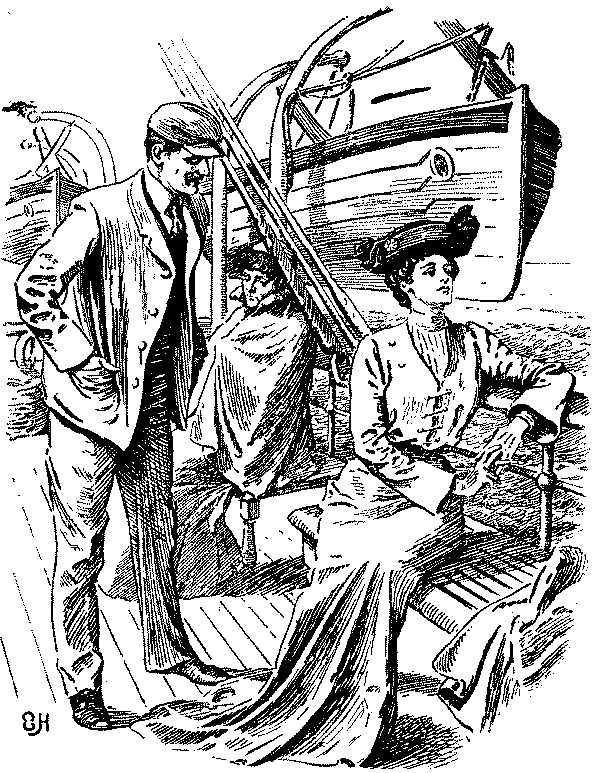
A MAN OF LETTERS
[Pg 97]
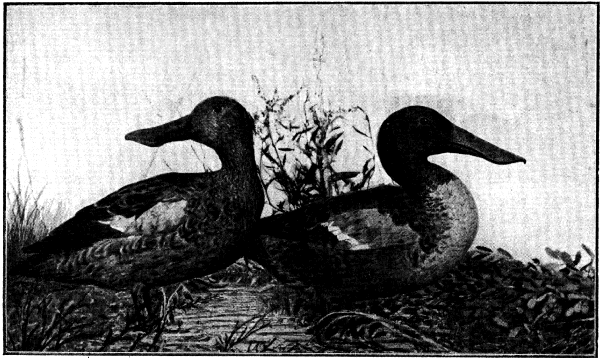
Most Assuring.
Brown (who is nervous about sanitary matters, and detects something). "Hum"—(sniffs)—"surely—this
system of yours—these pipes now—do they communicate with your main
drain?"
Hairdresser (with cheery gusto). "Direct, sir!"
[Tableau.
[Pg 99]
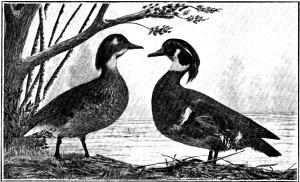
Gilded Johnny. "How long will it take your bally cab to
get to Victoria?"
Cabby. "Oh, just about the same time as an ordinary keb, sir."
[Pg 100]
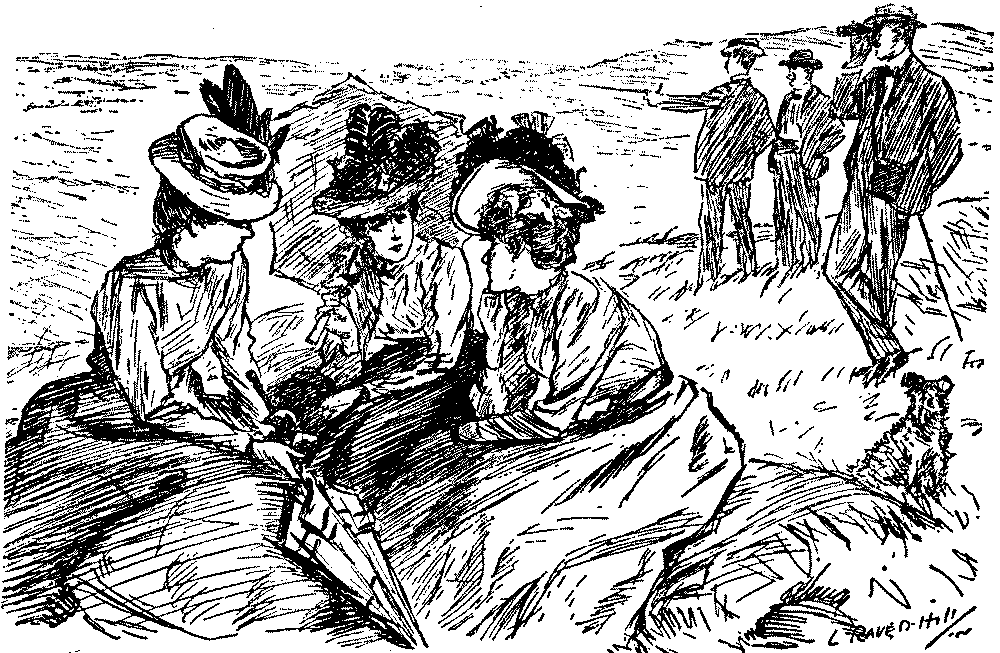
"NEVER TOO LATE TO MEND"
Respectable Man. "Dear me! I'm sorry to see this, Muggles! I heard
you'd left off drinking!"
Disreputable Party. "Sho I 'ave, shir—(hic)—jesh 'ish very
minute!"
[Pg 101]
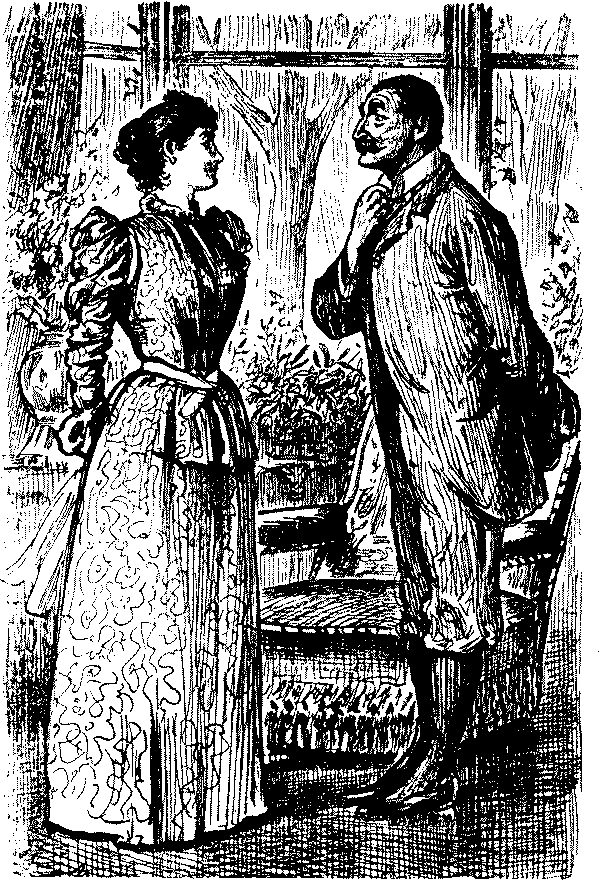
Obvious.
Stingy Uncle (to impecunious Nephew). "Pay as you go, my boy!—Pay as you go!"
Nephew (suggestively). "But suppose I haven't any money to pay with,
uncle——"
Uncle. "Eh?—Well, then, don't go, you know—don't go!"
[Exit hastily.
[Pg 102]
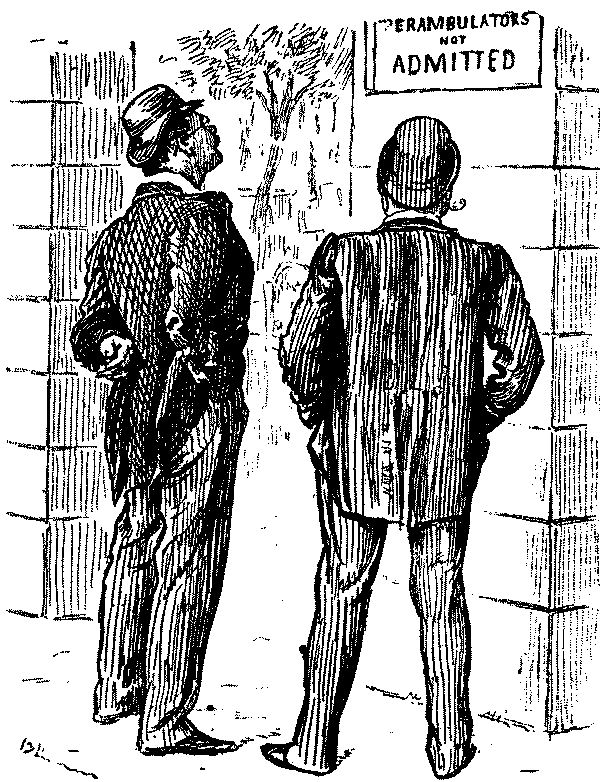
Street Serio (singing).
"Er—yew will think hov me and love me has in dies hov long ago-o-o!"
[Pg 103]
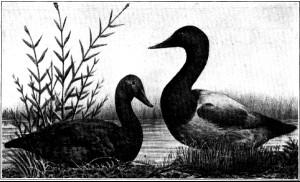
SHEWERFIT & Co.
[Pg 104]
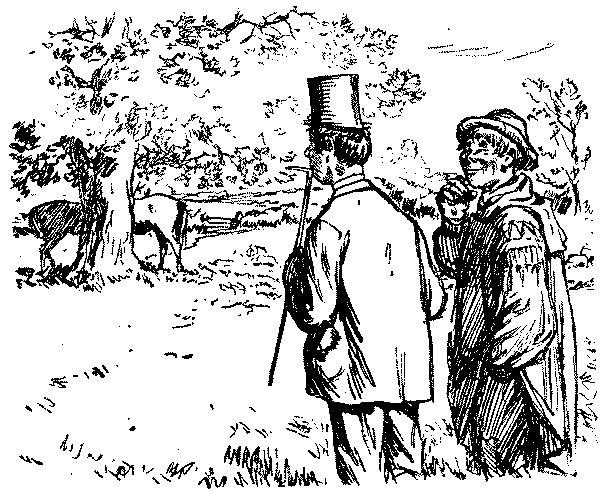
REAL GRATITUDE
Tramp (to Chappie, who has just given him a shilling). "I 'ope as 'ow
some day, sir, you may want a shillin', an' that I'll be able to give
it to yer!"
[Pg 105]
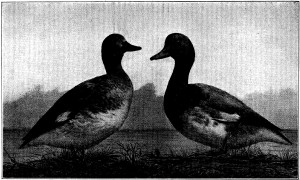
Vendor of Cheap Music.
"'Ere y' are, lidy! 'I'll be yer Sweet'art.' One penny!"
[Pg 106]
CORRESPONDENCE
If you please, sir, as a young visitor to the metropolis, and well
acquainted with history, I want to ask you—
Who is the Constable of the Tower?
What is his number?
Is he dressed like other constables?
Can he run anyone in, and make them move on if found loitering on
his beat?Is his beat all round the Tower?
Is he a special? one of the force de tour, empowered to use a
tour de force? (You see I am well up in French.)I saw a very amiable-looking policeman cracking nuts in the
vicinity of the Tower. Do you think this was the constable in
question?
Rusty Cuss in Urbe.
P.S.—Pantheon means a place where all the gods are. I know Greek.
The Pantheon in Regent Street I find is now a wine merchant's. Is
England exclusively devoted to Bacchus, and is temperance a heresy?
[Pg 107]
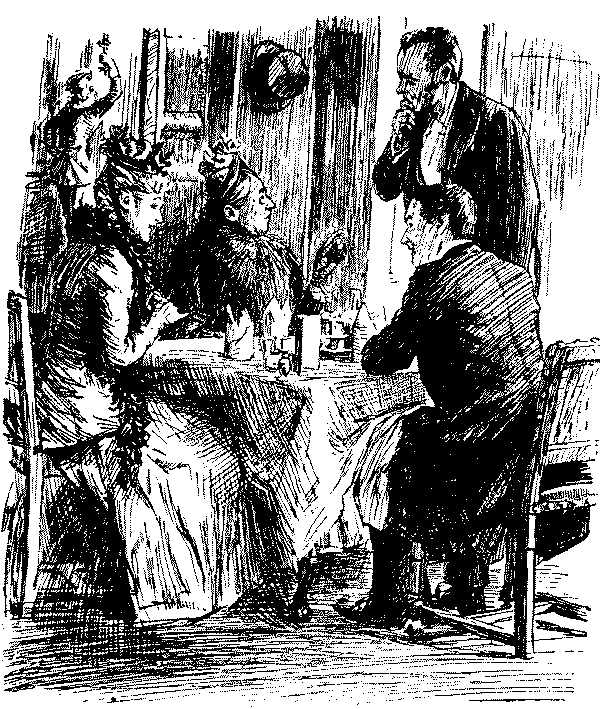
On the Ninth.
Freddy. "And do they have a new Lord Mayor every year, mummie?"
Mother. "Yes, dear."
Freddy. "Then what do they do with the old Lord Mayors when they've
done with 'em?"
[Pg 108]
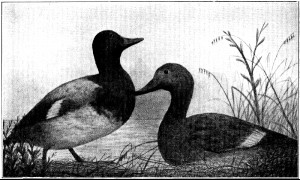
Clerk. "Lady been here this morning, sir, complaining
about some goods we sent her."
Employer. "Who was she?"
Clerk. "I quite forgot to ask her name, sir, but she's a little woman—with a
full-sized tongue!"
[Pg 109]
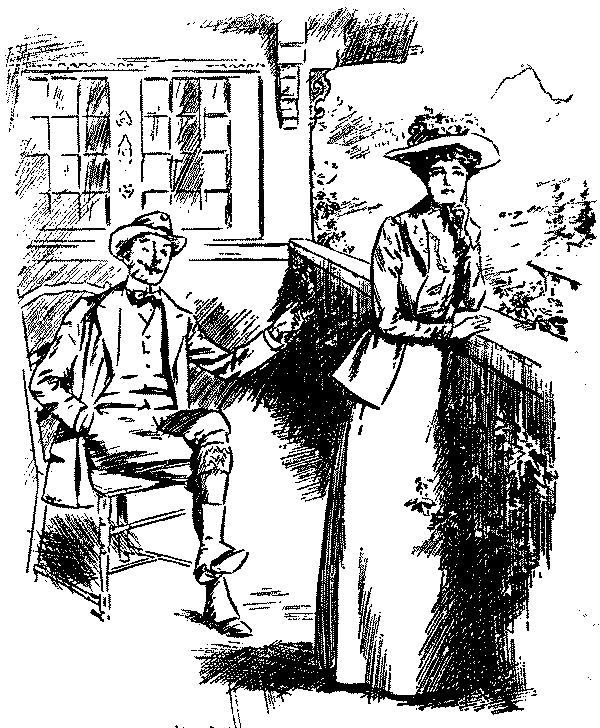
Little Boldwig (he had been dining with his Company,
and had let himself in with his latchkey—to gigantic stranger he finds
in his hall). "Come on. I'll fight you!" (Furiously.) "Put your
shtick down!!"
[But his imaginary foe was only the new umbrella-stand—a present
from Mrs. B.!
[Pg 110]
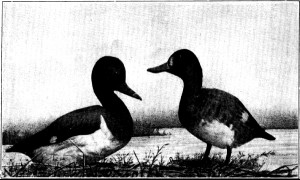
MAKING THE MOST OF IT
[Pg 111]
ADVERTISEMENT INADVERTENCIES
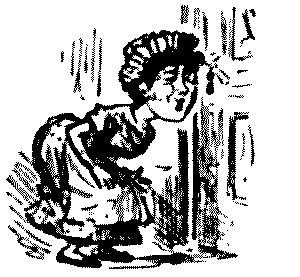 "Suitable opening for a pupil" | 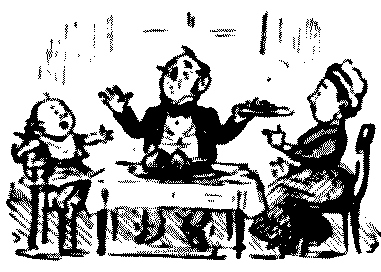 "Mother's help wanted" |
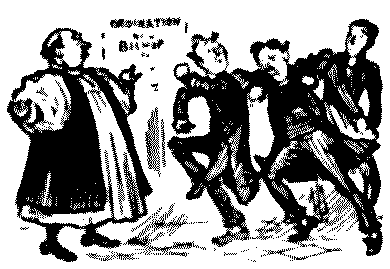 "Pushing man to take orders" | 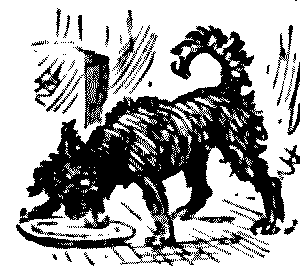 "A good plate cleaner" |
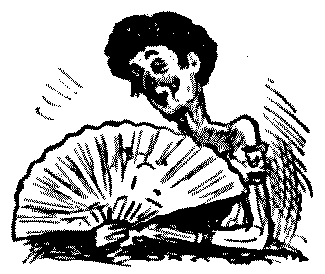 "No reasonable offer refused" | 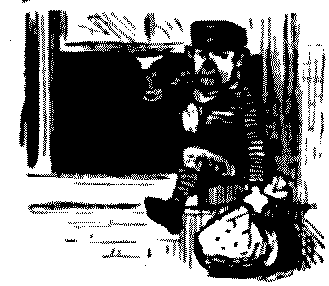 "Goods carefully removed (in town or country)" |
[Pg 112]
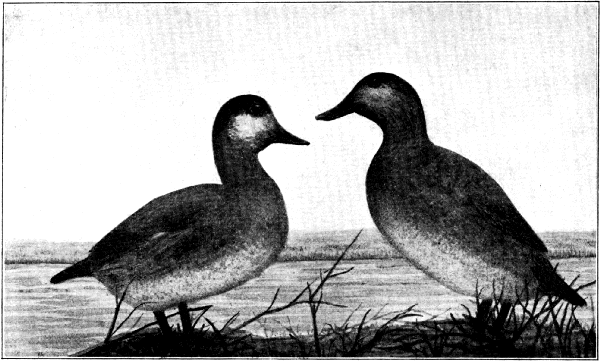
Passing Amenities.
Growler. "Hi! Hi! Carn't yer look out wher' yer a-comin'?"
Omnibus. "Garn! Shut up, jack-in-the-box!"
[Pg 113]
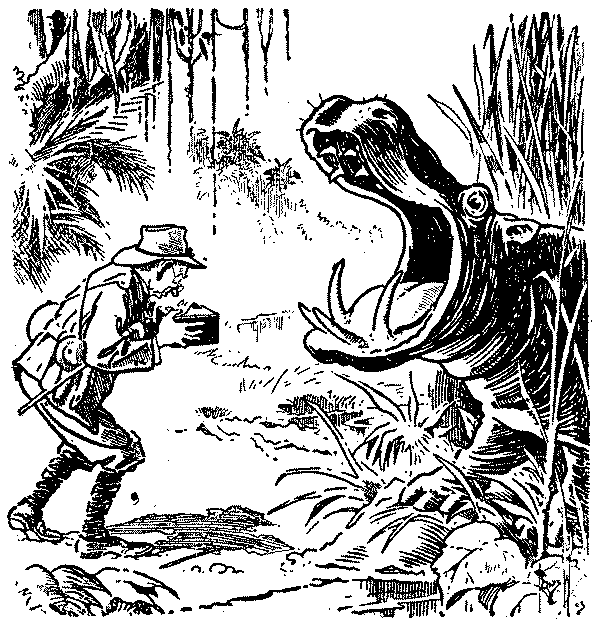
"I wonder when that A. B. C. girl is going to serve us?
I've called her half-a-dozen times."
"Perhaps she's D. E. F."
Somer's Town.
[Pg 114]
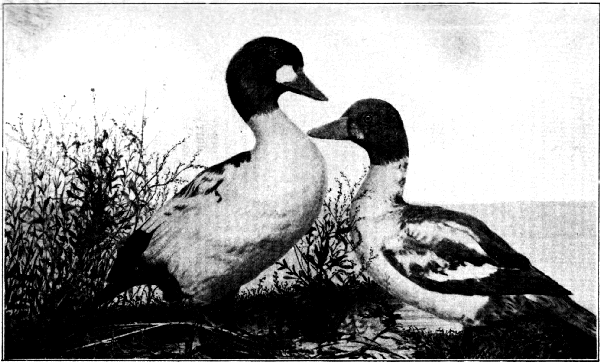
SO INVITING!
[Pg 115]
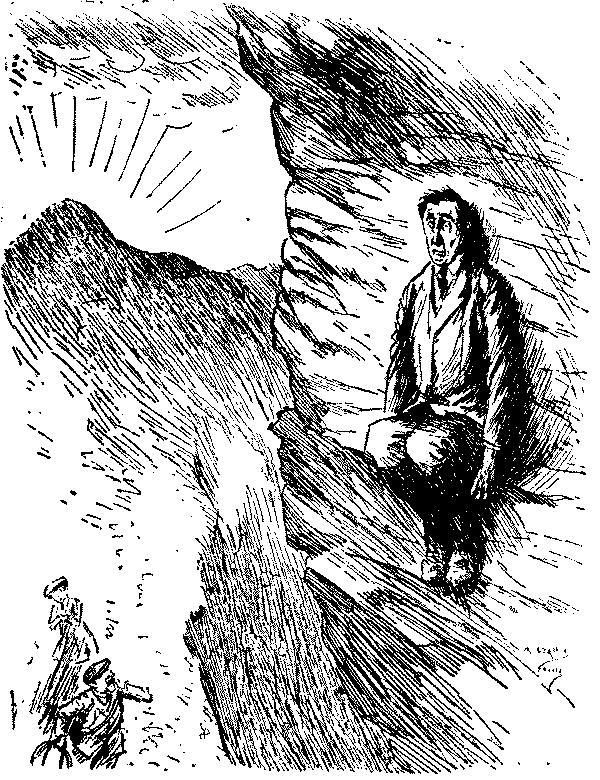
Passenger (rising politely). "Excuse me, mum, but do
you believe in woman's rights?"
New Woman. "Most certainly I do."
Passenger (resuming seat). "Oh well, then stand up for 'em!"
[Pg 116]
DESPERATE RESOLVES OF THE LAST MAN LEFT IN TOWN
To visit the National Gallery (for the first time), as an Englishman
should really know something about the art treasures of his native
country.
To spend an hour at the Tower (also for the first time), because there
you will be able to brighten up your historical recollections which have
become rather rusty since you took your B.A. degree just fifteen years
ago.
To enter St. Paul's Cathedral with a view to thinking out a really good
plan of decoration for the benefit of those who read letters addressed
to the editor of the Times.
To take a ride in an omnibus from Piccadilly to Brompton to see what the
interior of the vehicle in question is like, and therein to study the
manners and customs of the English middle classes.
To walk in Rotten Row between the hours of twelve (noon) and two (p.m.)
to see how the place looks without any people in it.
To have your photograph taken in your militia[Pg 118] uniform, as now there is
no one in town to watch you getting out of a cab in full war paint.
To stroll into Mudie's Library to get all the new novels, because after
reading them you may suddenly find yourself inspired to write a critique
that will make your name (when the article has been accepted and
published) as a most accomplished reviewer.
To read all the newspapers and magazines at the hairdresser's while your
head is being shampooed (for the fourth time), as now is the time for
improving your mind (occupied with so many other things during the
season) with popular current literature.
To walk to your club (closed for repairs, &c.) to see how the workmen
are progressing with the stone scraping of the exterior, as you feel
yourself responsible to hundreds of your fellow-creatures as a member of
the house committee.
To write a long letter to your friend Brown, of the 121st Foot, now in
India with his regiment, to tell him how nothing is going on anywhere,
because you have not written to him since he said "Good-bye" to you at
Southampton.
To go home to bed at nine o'clock, as early[Pg 120] hours are good for the
health, and because there is really nothing else to do.
And last, but not least, to leave London for the country by the very
first train to-morrow morning!
MUCH ADO ABOUT NOTHING IN THE CITY
Sigh no more dealers, sigh no more,
Shares were unstable ever,
They often have been down before,
At high rates constant never.
Then sigh not so,
Soon up they'll go,
And you'll be blithe and funny,
Converting all your notes of woe
Into hey, money, money.
Write no more letters, write no mo
On stocks so dull and heavy.
At times on 'Change 'tis always so,
When bears a tribute levy.
Then sigh not so,
And don't be low,
In sunshine you'll make honey,
Converting all your notes of woe,
Into hey, money, money.
[Pg 117]
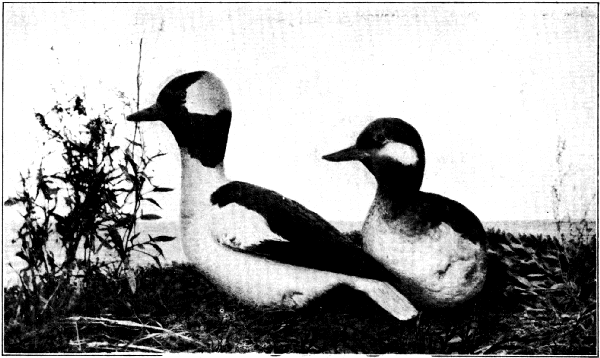
Studies in Evolution.
Alderman Brownjones senior explains to his son, Alderman Brownjones
junior, that there is a lamentable falling-off since his day, in the
breed of aldermen-sheriffs—not only in style and bearing, but even
in "happetite"!
[Pg 119]
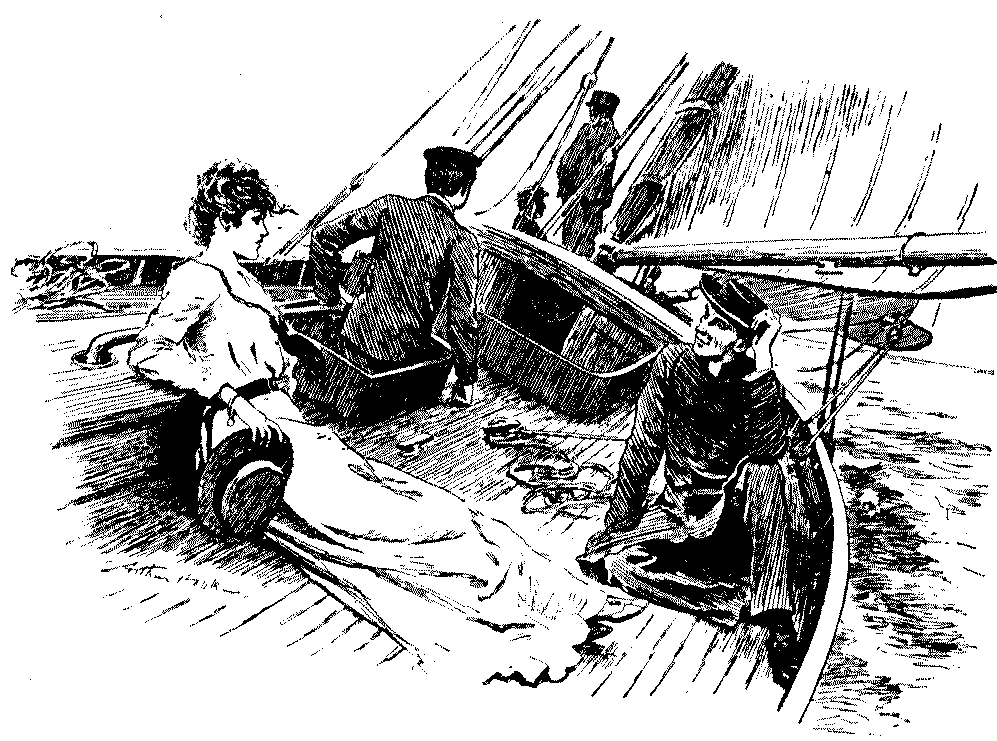
Gent (rushing out of club in a terrific hurry). "I
say, cabby, drive as fast as you can to Waterloo—Leatherhead!"
Cabby. "'Ere, I say, not so much of your leather'ed, if you please!"
[Goes off grumbling.
[Pg 121]
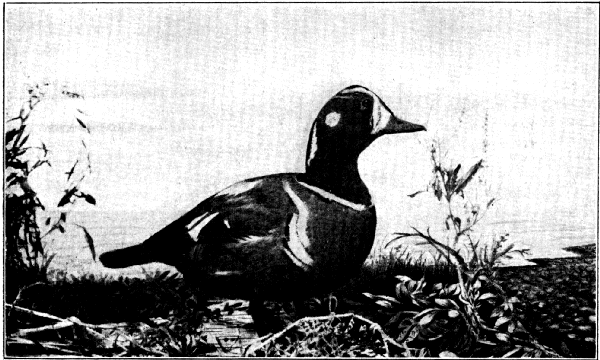
Mrs. Snobson (who is doing a little slumming for the
first time and wishes to appear affable, but is at a loss to know how to
commence conversation). "Town very empty!"
[Pg 122]
NEW EDITION OF WALKER
The baker rolls.
The butcher shambles.
The banker balances himself well.
The cook has a mincing gait.
The livery-stable keeper has a "musing gait."
The excursionist trips along.
The fishmonger flounders on.
The poulterer waddles like a duck.
The gardener does not allow the grass to grow under his feet.
The grocer treads gingerly.
The indiarubber manufacturer has an elastic step.
The rogue shuffles, and
The doctor's pace is killing.
[Pg 123]
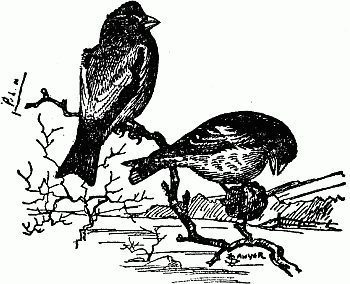
"THE ABSENT-MINDED BEGGAR"
[Pg 124]
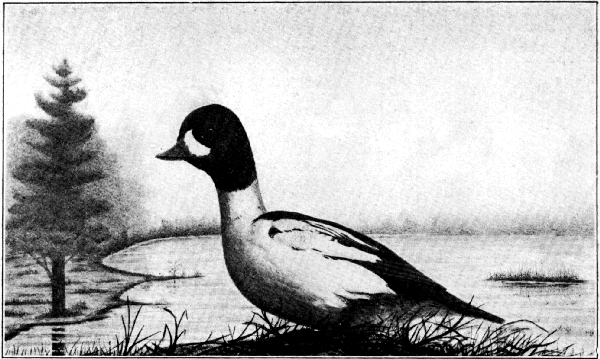
Talkative Old Lady (drinking a glass of milk, to
enthusiastic teetotaler, who is doing ditto). "Yes, sir, since they're
begun poisoning the beer, we must drink something, mustn't we?"
[Pg 125]
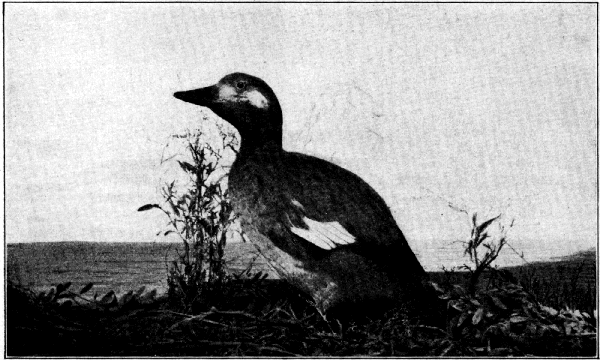
Small Boy (who is somewhat cramped for room). "Are
you still there, Billy? I thought you wos lost."
[Pg 126]
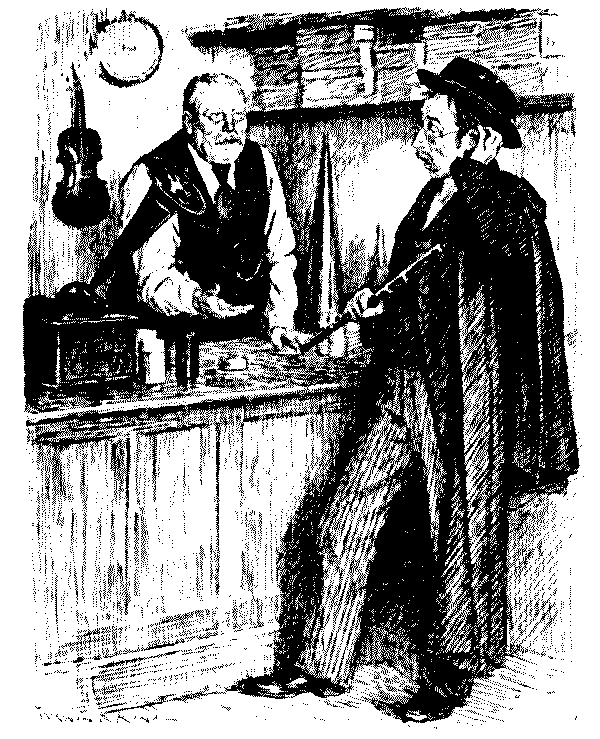
Irate Old Gentleman. "Here, I say, your beast of a dog
has bitten a piece out of my leg!"
Dog's Owner. "Oh, bother! And I wanted to bring him up a vegetarian!"
[Pg 127]
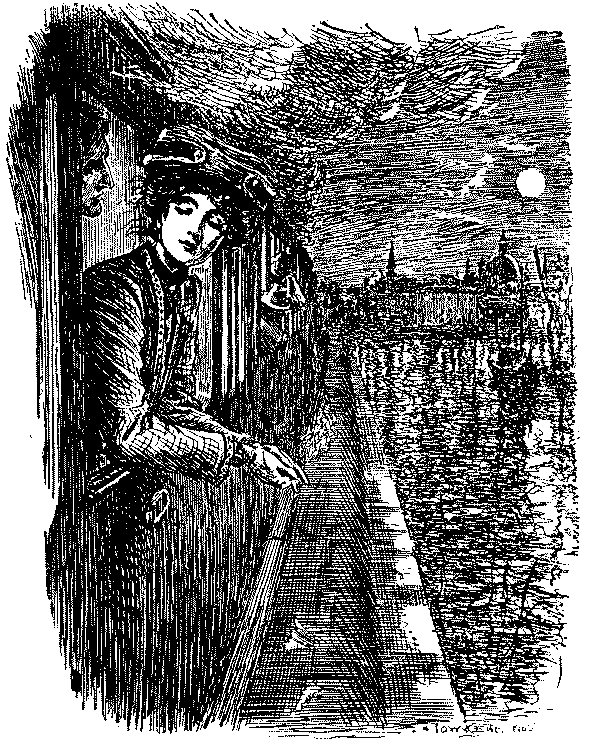
"'Ad any breakfus' 's mornin'?" "Not a drop!"
[Pg 128]
THE INFANT'S GUIDE TO KNOWLEDGE
Question. What is cash?
Answer. Cash may be described as comfort in the concrete.
Q. Is it not sometimes called "the root of all evil"?
A. Yes, by those who do not possess it.
Q. Is it possible to live without cash?
A. Certainly—upon credit.
Q. Can you tell me what is credit?
A. Credit is the motive power which induces persons who have cash, to
part with some of it to those who have it not.
Q. Can you give me an instance of credit?
A. Certainly. A young man who is able to live at the rate of a
thousand a-year, with an income not exceeding nothing a month, is a case
of credit.
Q. Would it be right to describe such a transaction as "much to his
credit"?
A. It would be more precise to say, "much by[Pg 130] his credit"; although
the former phrase would be accepted by a large class of the community as
absolutely accurate.
Q. What is bimetallism?
A. Bimetallism is a subject that is frequently discussed by amateur
financiers, after a good dinner, on the near approach of the coffee.
Q. Can you give me your impression of the theory of bimetallism?
A. My impression of bimetallism is the advisability of obtaining
silver, if you cannot get gold.
Q. What is the best way of securing gold?
A. The safest way is to borrow it.
Q. Can money be obtained in any other way?
A. In the olden time it was gathered on Hounslow Heath and other
deserted spots, by mounted horsemen wearing masks and carrying pistols.
Q. What is the modern way of securing funds, on the same principles,
but with smaller risk?
A. By promoting companies and other expedients known to the members of
the Stock Exchange.
[Pg 129]
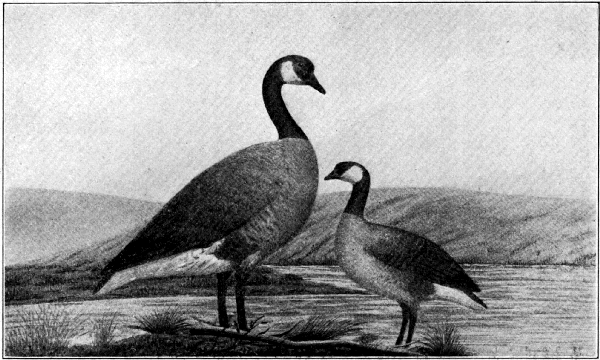
An Empty Embrace.
"'Ere y'are! Humberella rings, two a penny!"
[Pg 131]
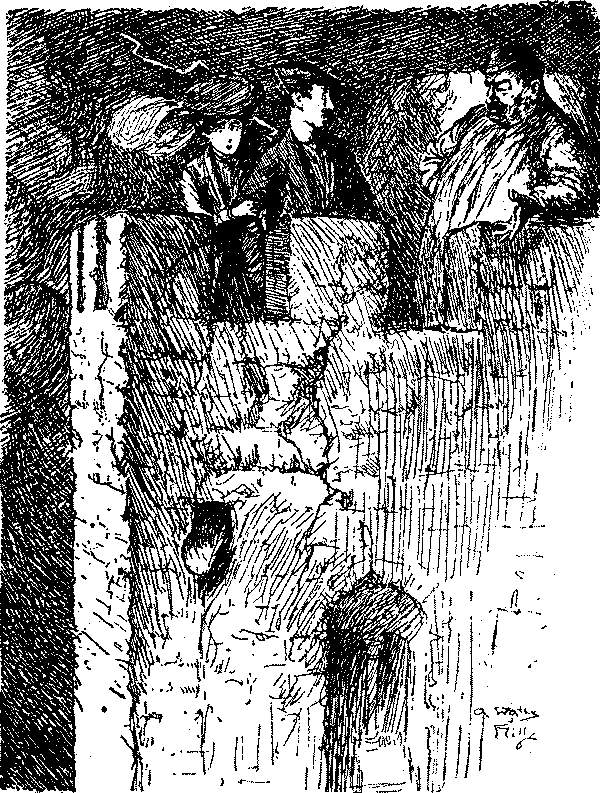
Conductor (on "Elephant and Castle" route). "Fares,
please!"
Fare. "Two elephants!"
[Pg 132]
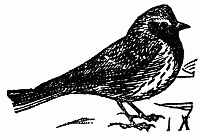
ONE OF "LIFE'S LITTLE IRONIES"
[Pg 133]
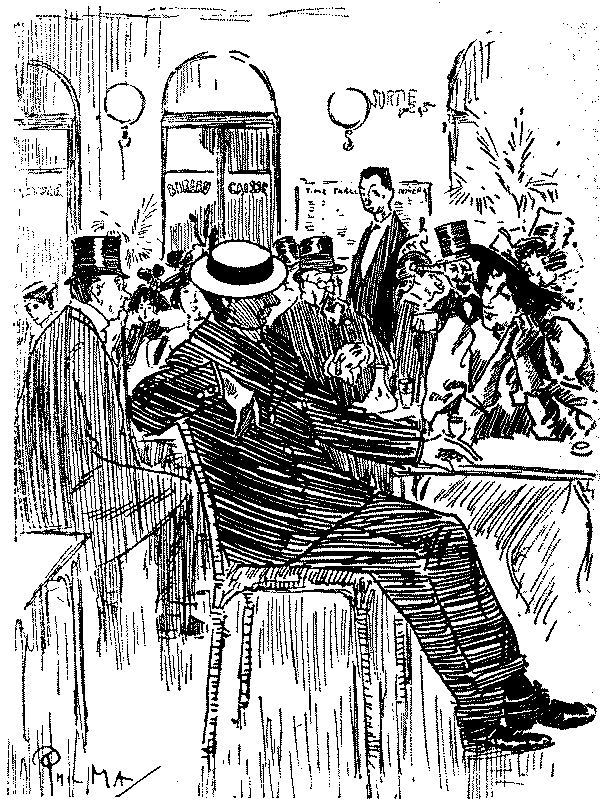
OVERHEARD OUTSIDE A FAMOUS RESTAURANT
"Hullo, Gus! What are you waiting about here for?"
"I'm waiting till the banks close. I want to cash a cheque!"
[Pg 134]
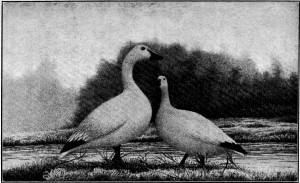
Working Man, sitting on the steps of a big house in,
say, Russell Square, smoking pipe. A mate passes by with plumbing tools,
&c.
Man with tools. "Hullo, Jim! Wot are yer doin' 'ere? Caretakin'?"
Man on steps. "No. I'm the howner, 'ere."
Man with tools. "'Ow's that?"
Man on steps. "Why, I did a bit o' plumbing in the 'ouse, an' I took
the place in part payment for the job."
[Pg 135]
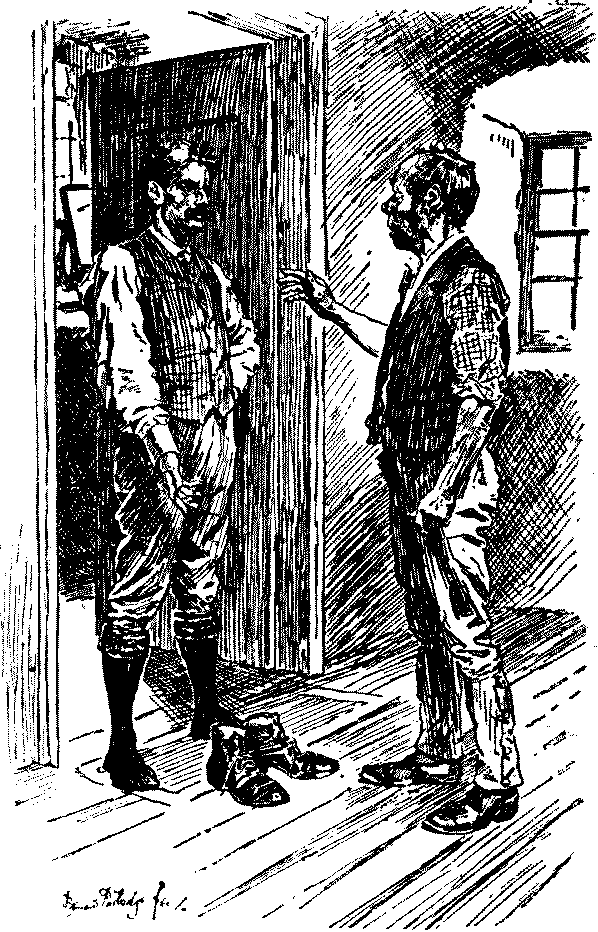
THE GLORIOUS FIFTH
Benevolent Lady (fond of the good old customs). "Here, my boy, is
something for your guy."
Conscientious Youth. "We ain't got no guy, mum; this 'ere's
grandfather!"
[Pg 136]
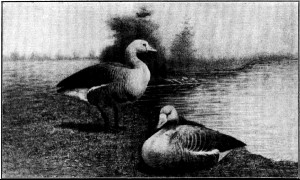
After "The Slump" in the City.
Weak Speculator in South African market (about to pay the barber who has been shaving him). "A
shilling! eh? Why, your charge used to be only sixpence."
City Barber. "Yes, sir; but you've got such a long face, we're obliged to increase
the price!"
[Pg 137]
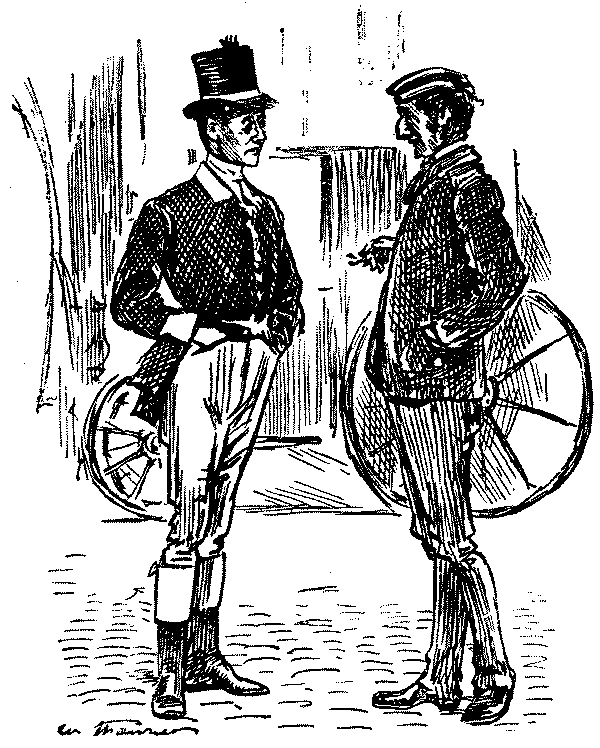
"I don't arst yer fer money. I don't want money. Wot I
wants is bread. 'Ave yer got such a thing as a bit o' bread about yer,
me lord?"
[Pg 138]
THE PROMOTER'S VADE MECUM
Question. What is meant by the promotion of a company?
Answer. The process of separating capital from its possessor.
Q. How is this end accomplished?
A. By the preparation and publication of a prospectus.
Q. Of what does a prospectus consist?
A. A front page and a statement of facts.
Q. Define a front page.
A. The bait covering the hook, the lane leading to the pitfall, the
lath concealing the quagmire—occasionally.
Q. Of what is a front page composed?
A. Titles, and other suggestions of respectability.
Q. How are these suggestions obtained?
A. In the customary fashion.
Q. Can a banking account be put to any particular service in the
promotion of a company?
[Pg 140]
A. Certainly; it eases the wheels in all directions.
Q. Can it obtain the good-will of the Press?
A. Only of questionable and usually short-lived periodicals.
Q. But the destination of the cash scarcely affects the promoter?
A. No; for he loses in any case.
Q. How much of his profits does he sometimes have to disgorge?
A. According to circumstances, from three-fifths to
nineteen-twentieths of his easily-secured takings.
Q. And what does promotion do for the promoter?
A. It usually bestows upon him temporary prosperity.
Q. Why do you say "temporary"?
A. Because a pleasant present is frequently followed by a disastrous
future.
Q. You mean, then, that this prosperity is like the companies
promoted, "limited"?
A. Yes, by the Court of Bankruptcy.
[Pg 139]
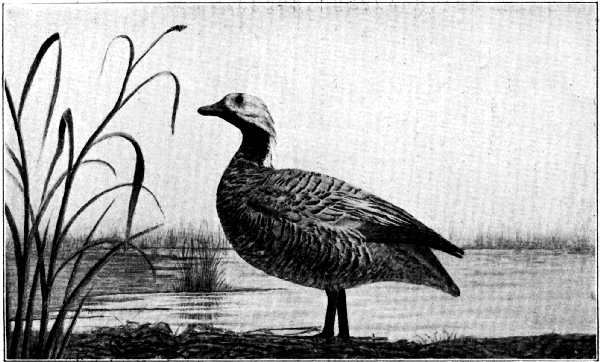
"ON 'CHANGE"
Brown. "Mornin'. Fresh mornin', ain't it?"
Smith. "'Course it is. Every morning's a fresh morning! By-bye!"
[Brown's temper all day is quite unbearable.
[Pg 141]
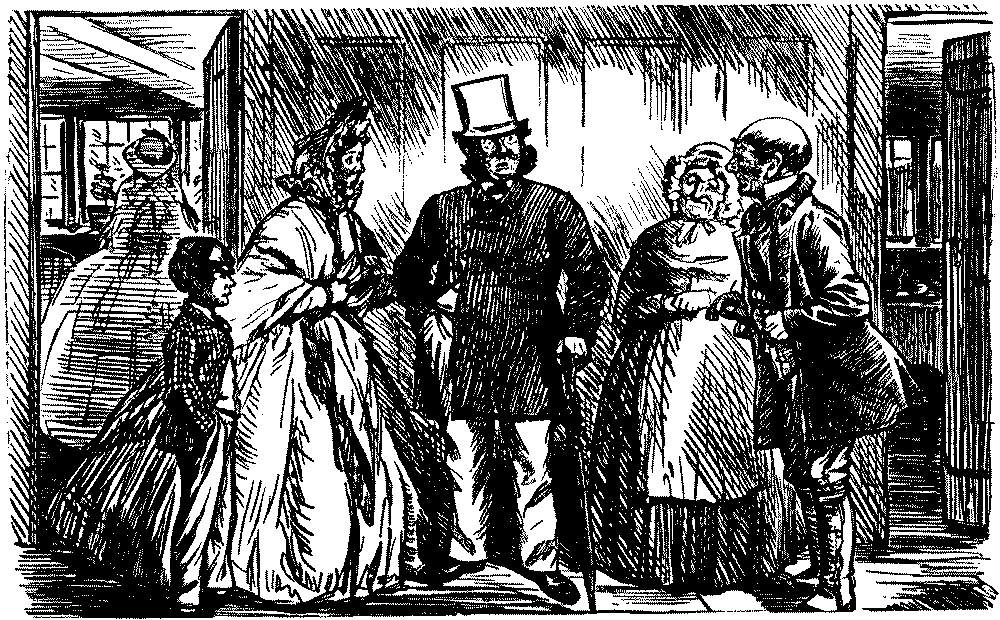
Sympathetic Passer-by. "But if he's badly hurt, why
doesn't he go to the hospital?"
British Workman. "Wot! In 'is dinner-time!!"
[Pg 142]
ADVERTISEMENT PERVERSIONS
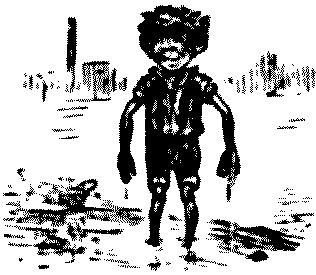 Washing wanted | 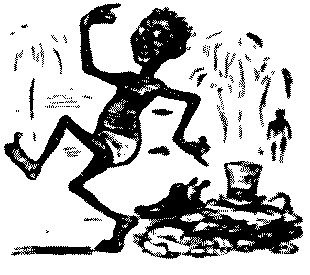 Left-off clothing |
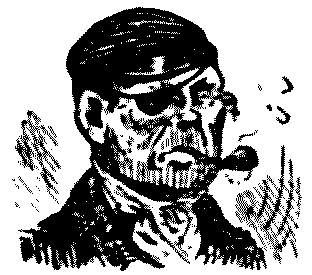 Vacancy for one pupil | 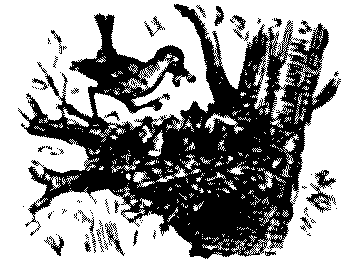 Branch establishment |
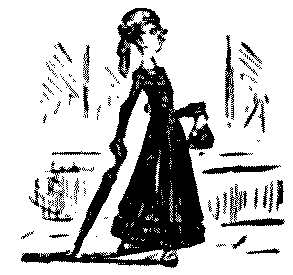 Improver wanted in the dressmaking | 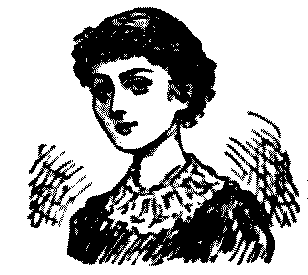 Engagement wanted, as housekeeper. Highly recommended |
[Pg 143]
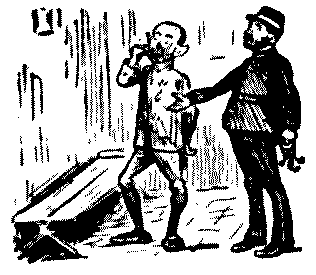 Board and residence | 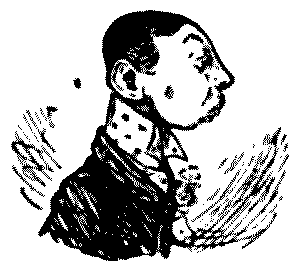 Unfurnished flat |
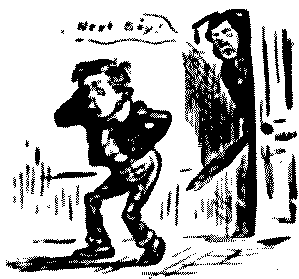 Smart youth wanted | 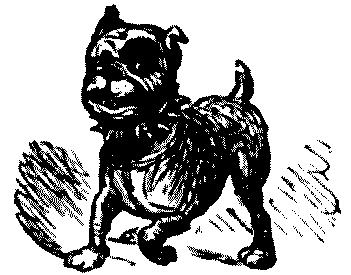 Mangling done on the shortest notice |
hit the happy medium.
[Pg 144]
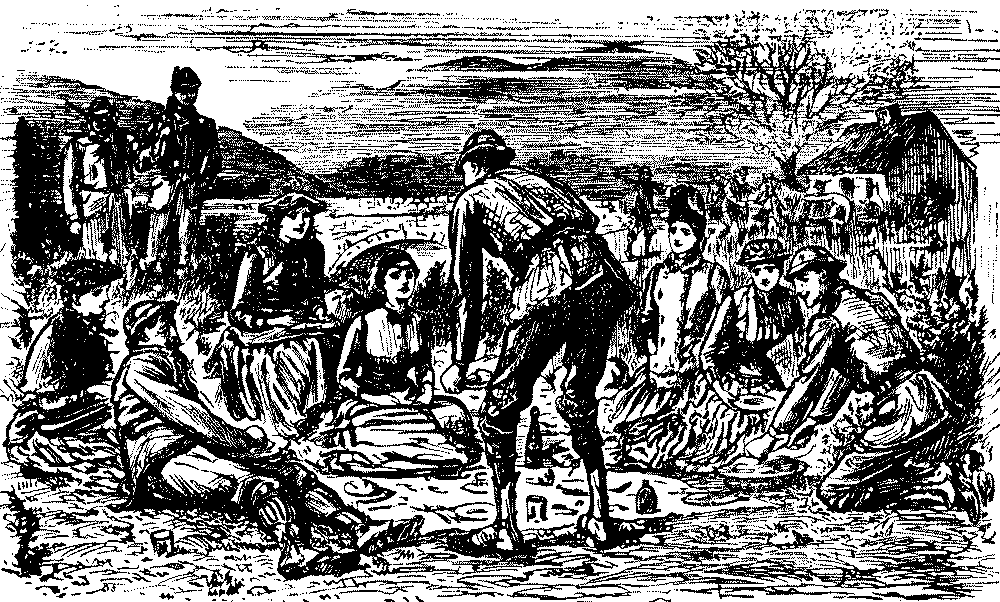
LORD MAYOR'S SHOW AS IT OUGHT TO BE
[Pg 145]
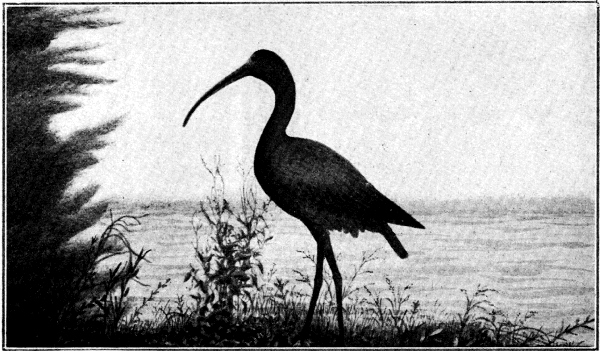
ANOTHER SUGGESTION FOR THE LORD MAYOR'S SHOW AS IT OUGHT
TO BE
[Pg 146]
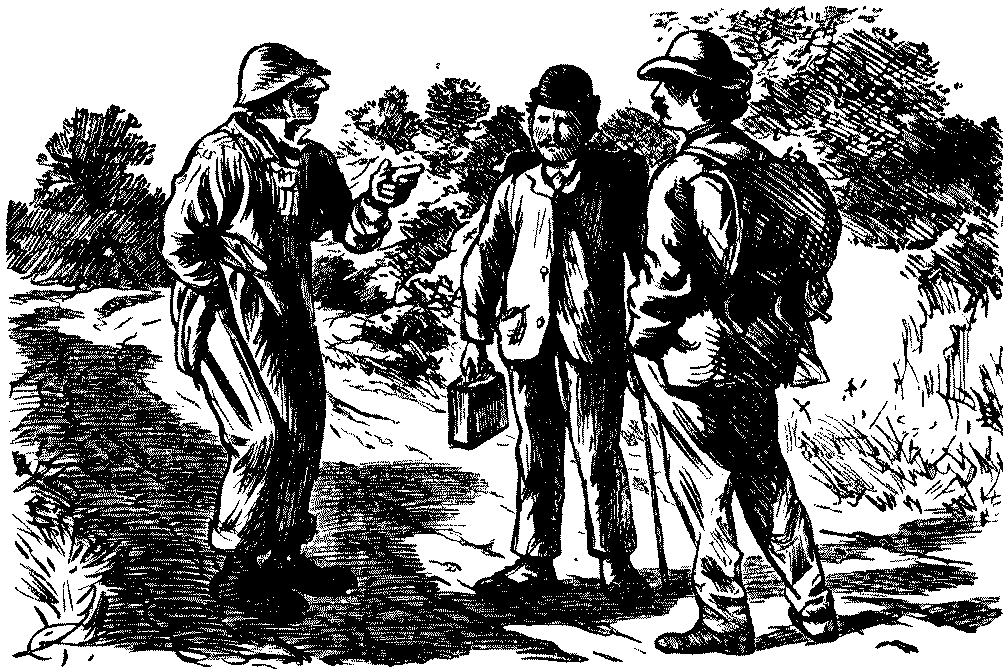
"'Nuts for the monkeys, sir? Buy a bag o' nuts for the
monkeys!"
"I'm not going to the Zoo."
"Ah, well, sir, have some to take home to the children!"
[Pg 147]
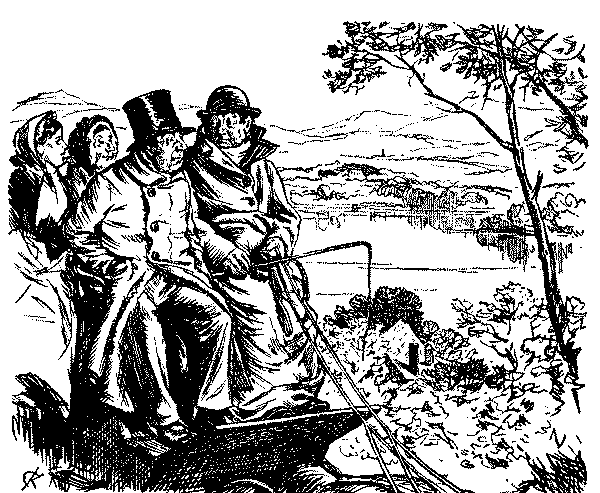
HYDE PARK, MAY 1
Country Cousin. "What is the meaning of this, policeman?"
Constable. "Labour day, miss."
[Pg 148]
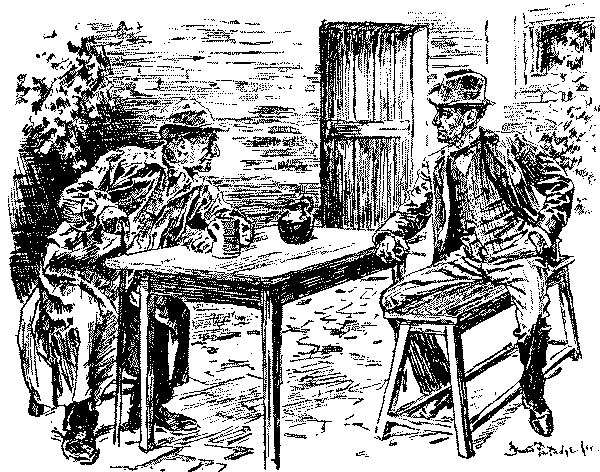
Boy (to Cabby with somewhat shadowy horse). "Look
'ere, guv'nor, you'd better tie a knot in 'is tail afore 'e gets wet, or
'e might slip through 'is collar!"
[Pg 149]
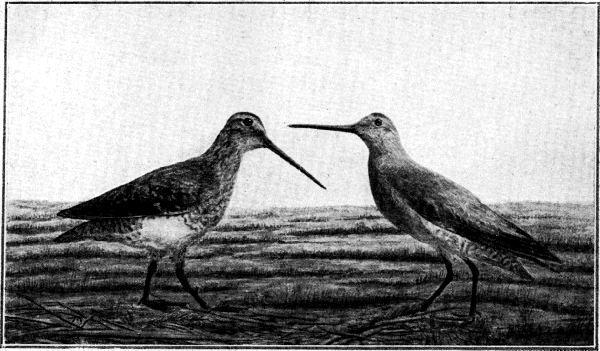
Indignant Cabby. "Shockin' bad 'orse, 'ave I? And wot's
this hextra tuppence for?—to buy a new 'un with, eh?"
[Pg 150]
Quiddities.
A tea-party without scandal is like a
knife without a handle.
Words without deeds are like the husks without the seeds.
Features without grace are like a clock without a face.
A land without the laws is like a cat without her claws.
Life without cheer is like a cellar without beer.
A master without a cane is like a rider without the rein.
Marriage without means is like a horse without his beans.
A man without a wife is like a fork without a knife.
A quarrel without fighting is like thunder without lightning.
joy, "his delight knows no bounds."
[Pg 151]
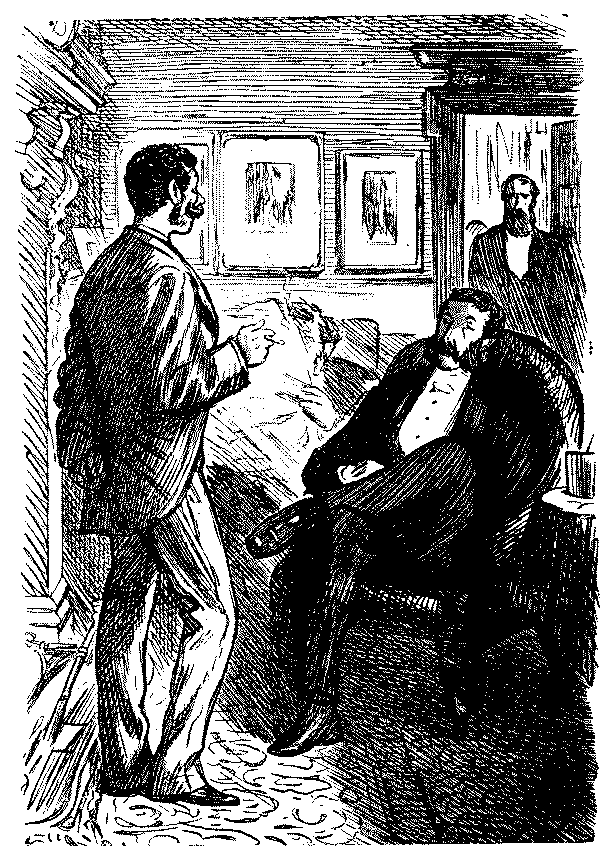
THE TIP-CAT SEASON HAS NOW COMMENCED
Street Urchin. "Now then, old 'un——Fore!"
[Pg 152]
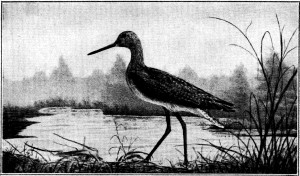
Crossing-Sweeper (to Brown, whose greatest pride is
his new brougham, diminutive driver, &c.). "'Igh! Stop! You've lost
somethin'—the coachman!"
[Pg 153]
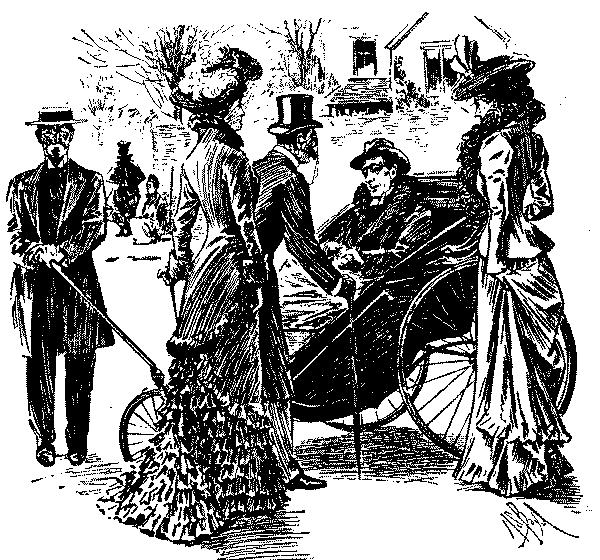
Irate Bus Driver. "You wouldn't do that for me, would
yer?"
[Pg 154]
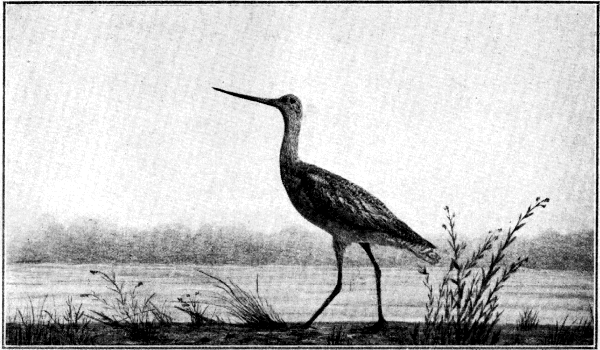
AT THE STORES. BUY—OUR TAPESTRY ARTIST
[Pg 155]
CATTLE-SHOW WEEK
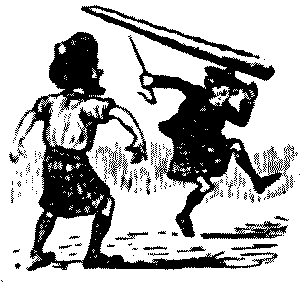 Scotch polled | 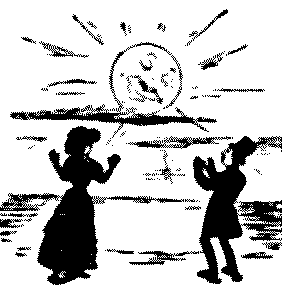 Best wether |
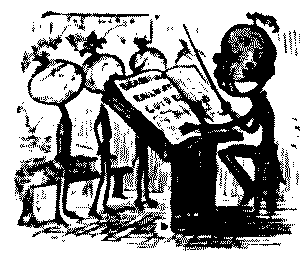 Class for roots | 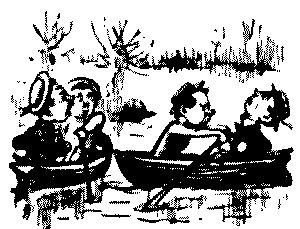 Steers |
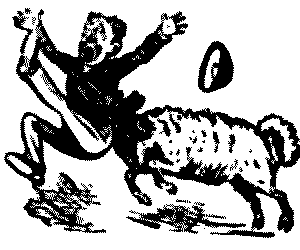 Best butter | 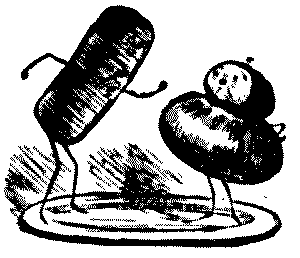 Cross bred |
[Pg 156]
The Linen Trade.
There have been a few transactions in rags at
threepence a pound, and an extensive bone-grubber caused considerable
excitement by bringing a quantity of waste-paper into the market which
turned the scale in his own favour.
investing goose.
The Vegetable Market.
Asparagus is looking up, and radishes are taking
a downward direction. Peas were almost nothing at the opening; and new
potatoes were buoyant in the basket, but turned out rather heavy at the
settling. A rush of bulls through the market had a dreadful effect upon
apple-stalls and other minor securities; but all the established houses
stood their ground, though the run occasioned a panic among some of the
proprietors.
[Pg 157]
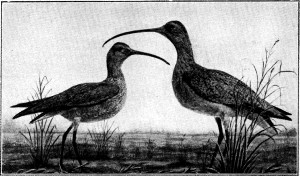
The Quarterly Accounts.—Clerk. "Sorry to say, sir,
there's a saddle we can't account for. Can't find out who it was sent
to."
Employer. "Charge it on all the bills."
[Pg 158]
A LOVE SONG OF THE MONEY-MARKET
I will not ask thee to be mine,
Because I love thee far too well;
Ah! what I feel, who thus resign
All hope in life, no words can tell.
Only the dictate I obey
Of deep affection's strong excess,
When, dearest, in despair, I say
Farewell to thee and happiness.
Thy face, so tranquil and serene,
To see bedimmed I could not bear,
Pinched with hard thrift's expression mean,
Disfigured with the lines of care,
I could not brook the day to see
When thou would'st not, as thou hast now,
Have all those things surrounding thee
That light the eye and smooth the brow.
Thou wilt smile calmly at my fear
That want would e'er approach our door;
I know it must to thee appear
A melancholy dream: no more.
Wilt thou not be with riches blest?
Is not my fortune ample too?
Must I not, therefore, be possessed,
To feel that dread, of devils blue?
Alas! my wealth, that should maintain,
My bride in glory and in joy,
Is built on a foundation vain,
Which soon a tempest will destroy.[Pg 160]
Yes, yes, an interest high, I know
My capital at present bears;
But in a moment it may go:
It is invested all in shares.
The company is doomed to fall,
Spreading around disaster dire,
I hear that the directors all
Are rogues—the greatest rogue thy sire!
Go—seek a happier, wiser mate,
Who had the wit to be content
With the returns of his estate,
And with Consols at three per cent!
not a bird called the ditto ditto. Is he not thinking of our old
acquaintance, the do-do?
[Pg 159]
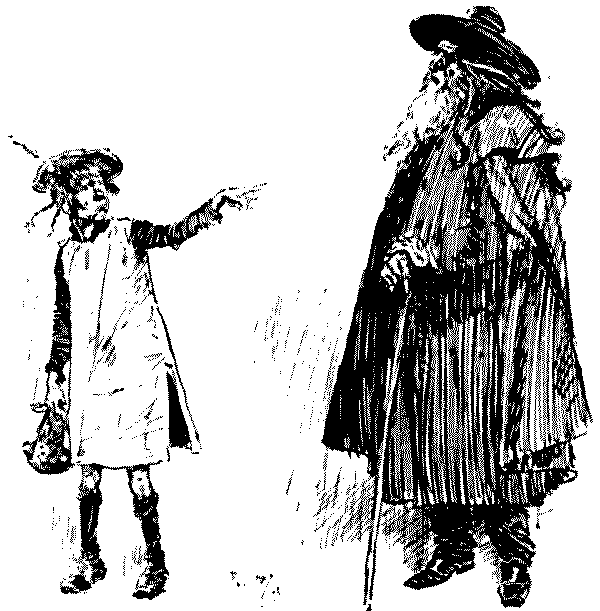
The Momentous Question.
Paterfamilias (who is just
beginning to feel himself at home in his delightfully new suburban
residence) interrupts the wife of his bosom. "'Seaside!' 'Change of
air!!' 'Out of town!!!' What nonsense, Anna Maria! Why, good gracious
me! what on earth can you want to be going 'out of town' for, when
you've got such a garden as this!"
[Pg 161]
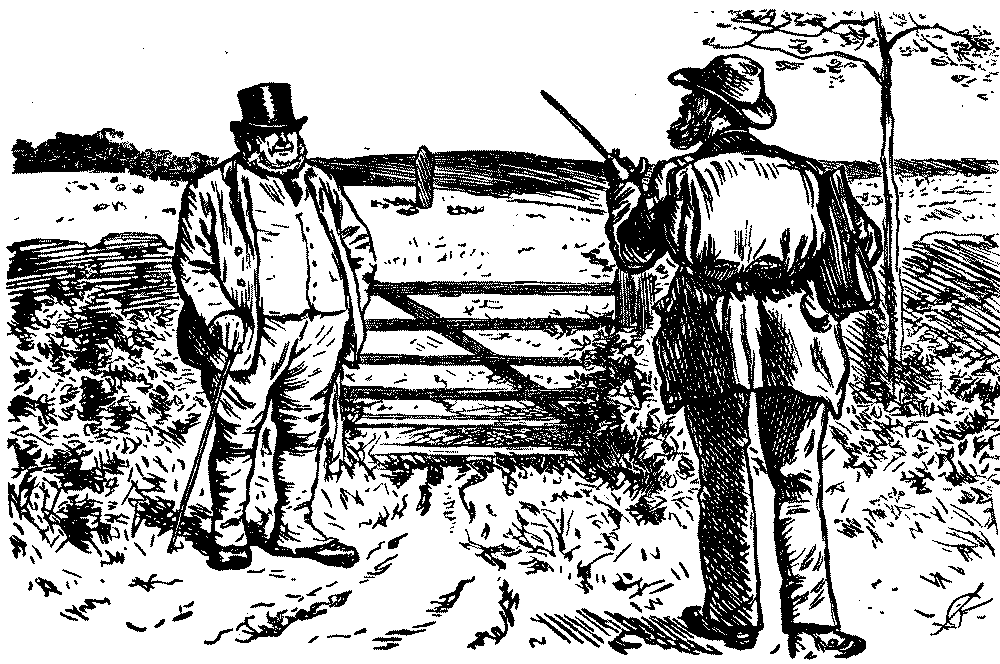
SUGGESTIVE
Dissipated Ballad Howler. "Sweet spirit, 'ear my prayer!"
[Pg 162]
Strand, because it is always being picked up.
of strangers, who seemed to act together, took off the contents of all
the pockets they could lay hold of. There was little doing in corn,
and what barley came in was converted into barley-water for a large
consumer. Peas were distributed freely in small samples through the
market, by means of tin tubes; and as usual there was a good deal of
roguery in grain, which it was found necessary to guard against.
dinner is on the tapis." The tapis alluded to is, of course,
Gob'lin?
[Pg 163]
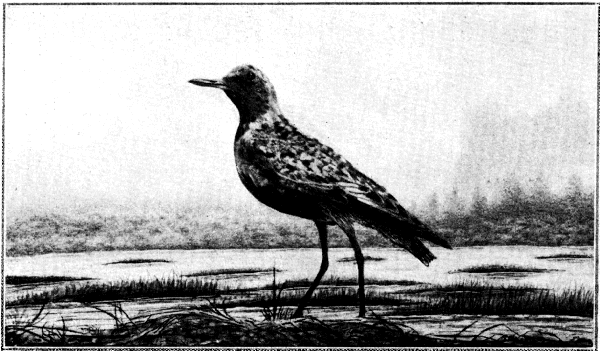
THE RESULT OF CARELESS BILL-POSTING
[Pg 164]
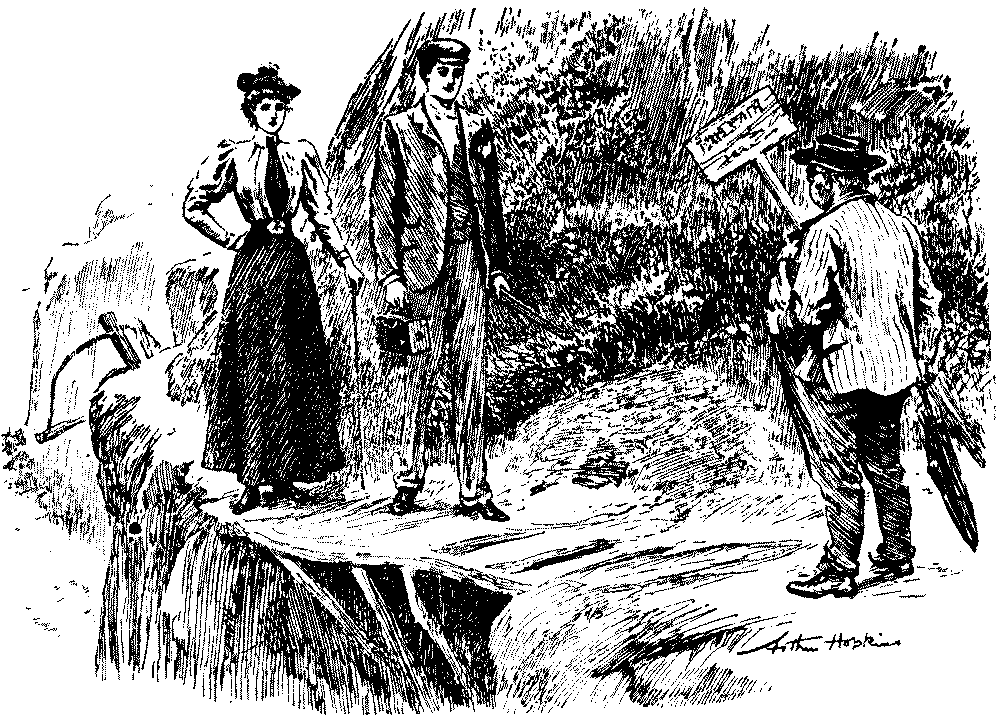
A SKETCH NEAR PICCADILLY
[Pg 165]
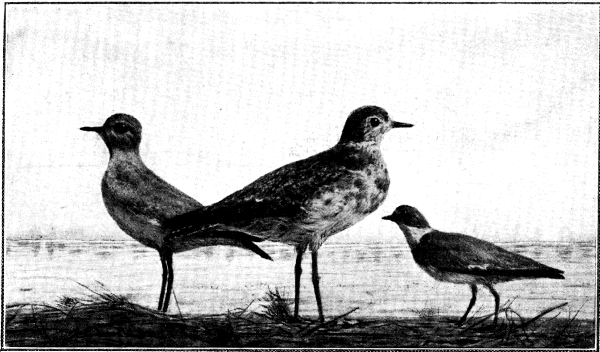
MADAME CHRYSANTHÈME
[Pg 166]
A Satisfactory Explanation.
Mrs. Griddleton. What are those square
things, coachman, you put over the poor horse's eyes?
Driver. Blinkers, ma'am.
Mrs. G. Why do you put them on, coachman?
Driver. To prevent the 'orse from blinking, ma'am.
[Inquiry closed.
HOW THE TRUTH LEAKS OUT!
Scene—Hyde Park. Time: Five o'clock.
Friend. Any news? Anything in the papers?
Government Clerk. Can't say. Haven't been to the office to-day, my
boy.
following soot.
Business.—Inquirer (drawing up prospectus). Shall I write "Company"
with a big C?
Honest Broker. Certainly, if it's a sound one, as it represents
"Company" with a capital.
[Pg 167]
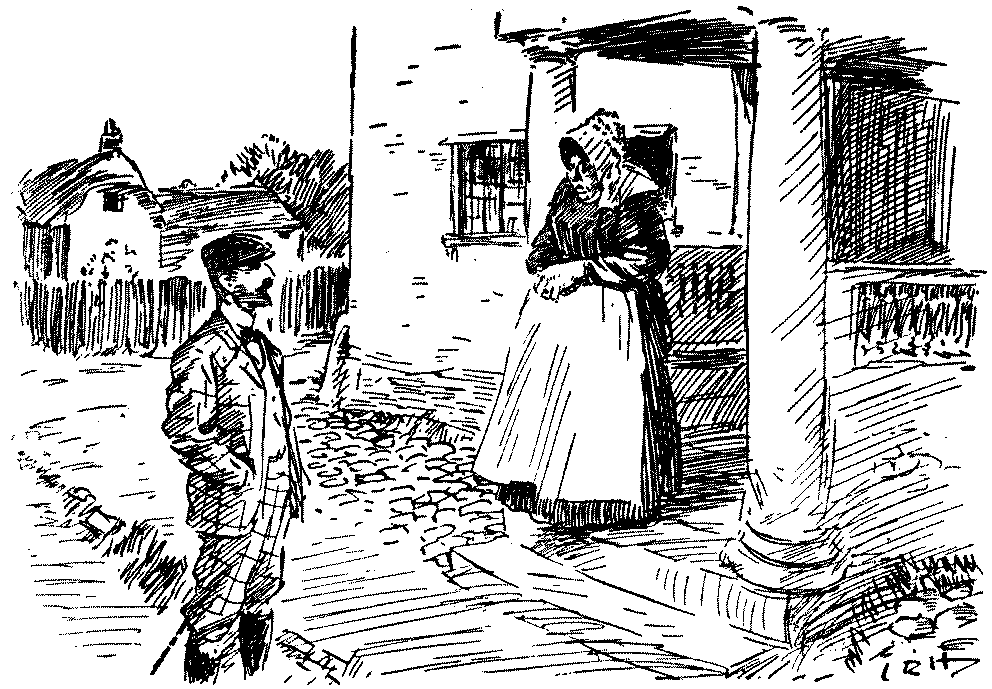
"Shave, or hair cut, sir?"
"Corns, you fool!"
[Pg 168]
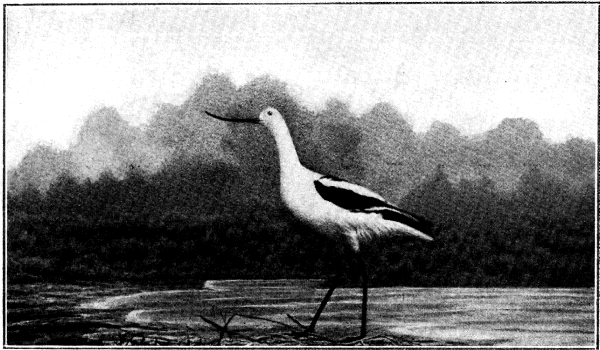
NOT FOR JOSEPH!
[Pg 169]
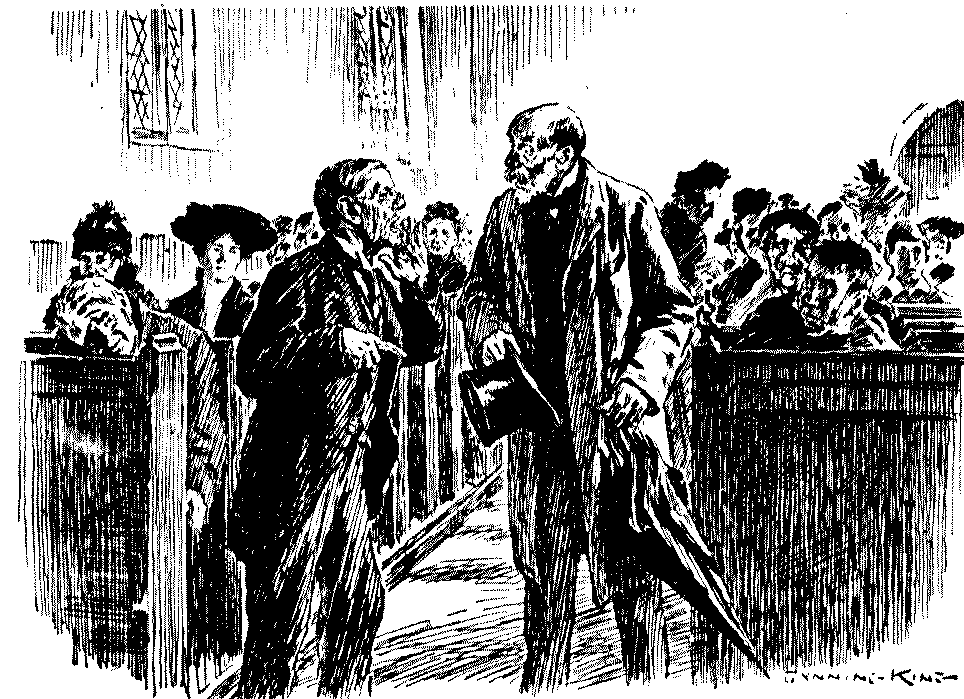
PROOF POSITIVE
Old Lady. "Do they sell good 'sperrits' at this 'ouse, mister?"
'Spectable-looking Man (But—). "Mos' d'schid'ly, look't (hic) me,
mad'm—for shev'n p'nsh a'penny!!"
[Pg 170]
to dinner, that it is one of his fast days.
of next week.
[Pg 171]
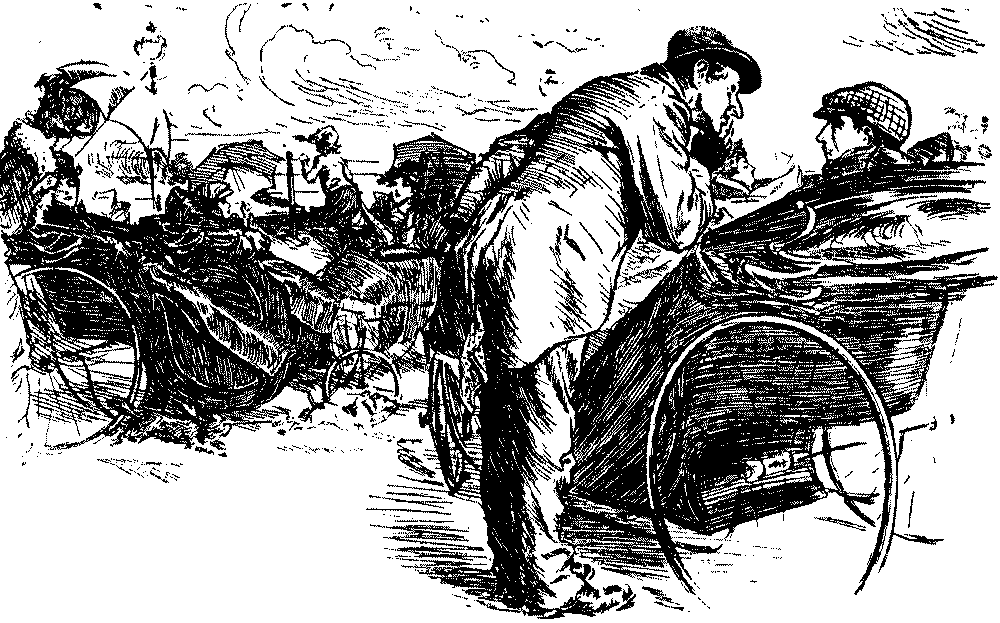
ZOOLOGY
"That's a porkypine, Sarah."
"No, it ain't, Bill. It's a orstridge!"
[Pg 172]
The Fish Market.
Flounders were of course flat, but to the surprise of
everyone they showed an inclination to come round towards the afternoon,
and there were one or two transactions in whelks, but they were all of a
comparatively insignificant character. Lobsters' claws were lazy at the
opening, but closed heavily; and those who had a hand in them would
gladly have been released if such a course had been possible.
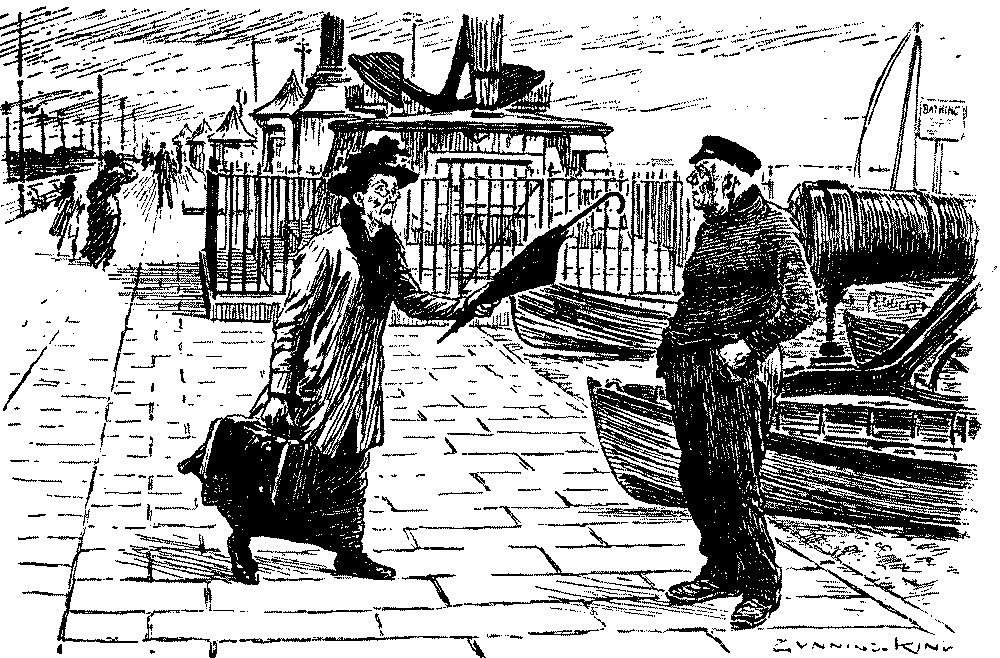
AN UNUSUAL FLOW OF SPIRITS
have tried to eat the article at home.
[Pg 173]
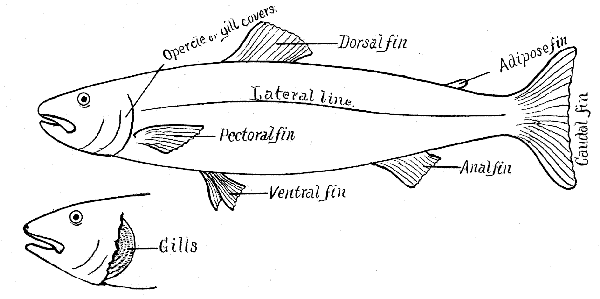
A Horrible Business.
Master Butcher. "Did you take old
Major Dumbledore's ribs to No. 12?" Boy. "Yes, sir." Master Butcher.
"Then, cut Miss Wiggles's shoulder and neck, and hang Mr. Foodle's legs
until they're quite tender!"
[Pg 174]
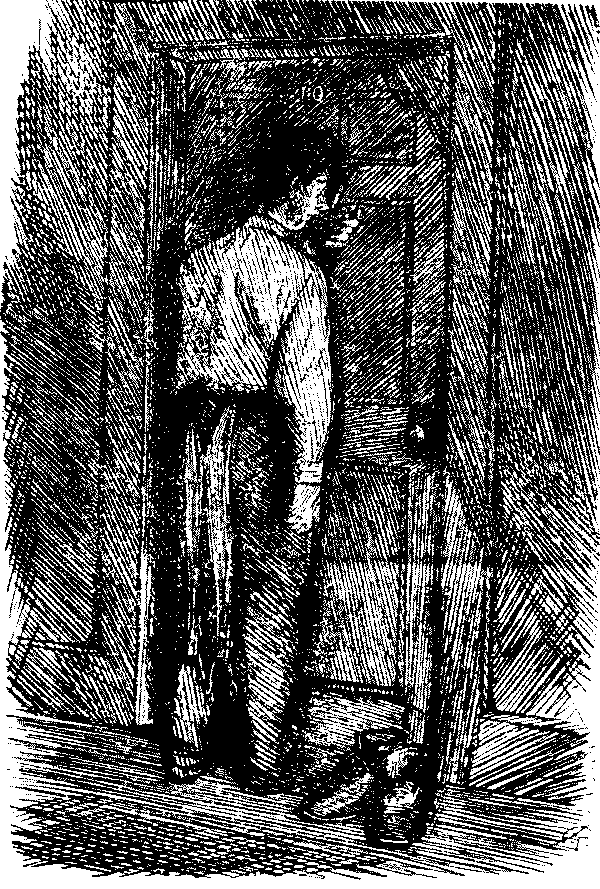
Little Girl (to Newsvendor, from whom she has just
purchased the latest war special). "'Ere's your paper! Father says,
if you don't mind 'e 'd rather 'ave the bill, 'cos there's more news in
it."
[Pg 175]
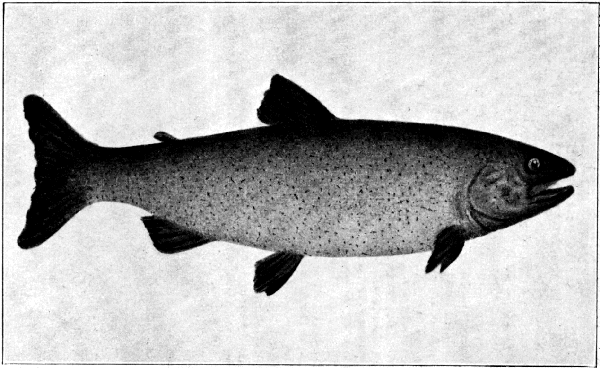
Old Lady (from the country). "Well, I never! And to
think burglary should have become a regular respectable trade!"
[Pg 176]
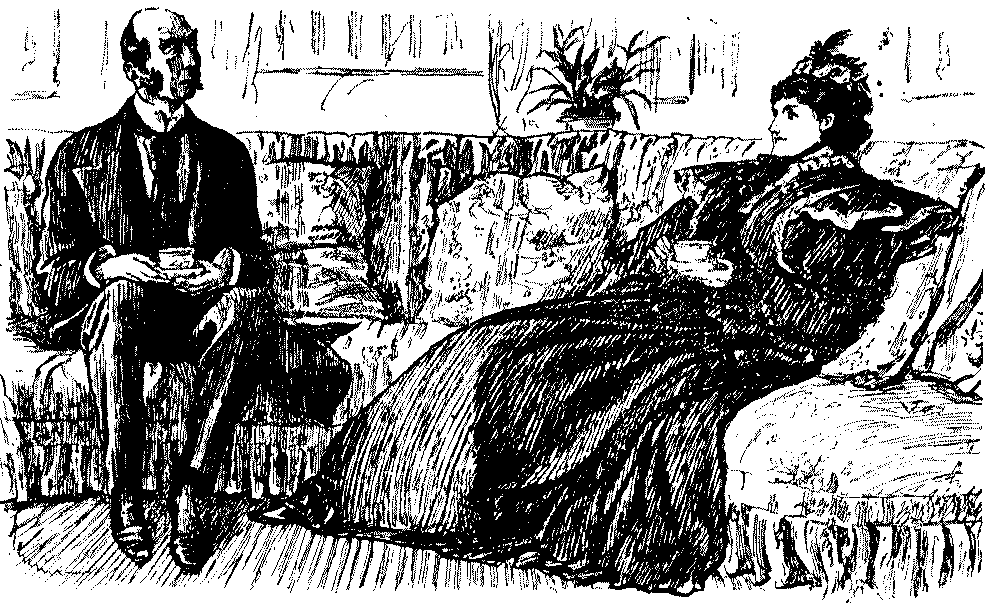
ARMS FOR THE PROPOSED NEW WEST-END STOCK EXCHANGE
On a chevron vert, a pigeon plucked proper, between three rooks
peckant, clawed and beaked gules. Crest: a head Semitic grimnant,
winkant, above two pipes laid saltier-wise, argent, environed with a
halo of bubbles or. Supporters: a bull and bear rampant sable,
dented, hoofed and clawed gules. Motto: "Let us prey."
[Pg 177]
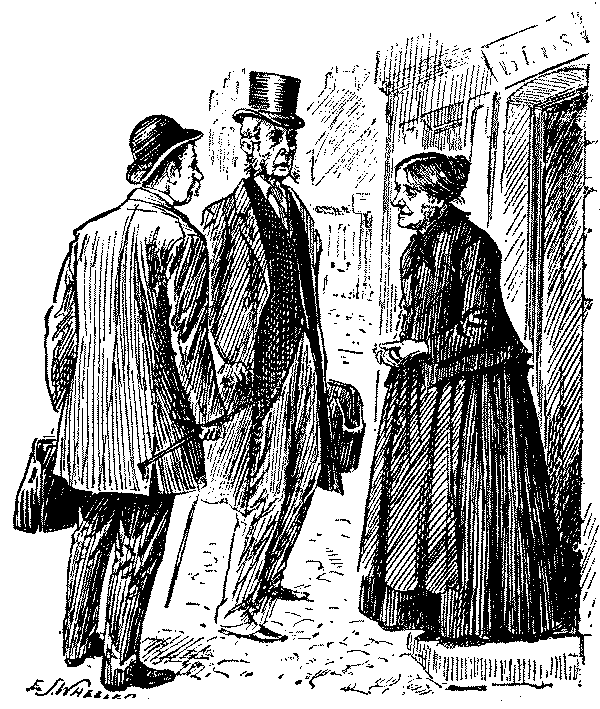
A Sensitive Plant.
"What, back in town already, old chappie?"
"Yes, old chappie. Couldn't stand the country any longer. Cuckoo gave me
the headache!"
[Pg 178]
COMMERCIAL NEWS
Policeman O, No. I, has got such an accumulation of corn in bond, under
a tight boot, that it is expected he will be allowed the benefit of
nominal or fixed duty. He is one of the most extensive growers of corn
in the kingdom, and always has on foot a prodigious quantity, which,
when he is in competition with those who try to take advantage of his
position, must naturally prevent him from striking the average.
Onions were dull at fourpence a rope, and wild ducks were heavy, with
sand inside, at three and sixpence a couple.
A considerable deal of business was done in flat-irons on New Year's
Day, and there was a trifling advance upon them everywhere.
The dividends on pawnbrokers' stock were payable last week, but the
defaulters were very numerous. A highly respectable party in the City,
in order to provide for interest coming due, is understood to have
funded the greater part of his summer wardrobe.
[Pg 180]
Long fours, in the candle-market, were dull, but the ten and a half
reduced rushlights brightened up towards the close of the day
surprisingly.
do not wish to be reminded of their distressing malady, should avoid
going down Long Acre.
i.e., We Wear.
magistrate instrumental to his rapacity is that vulture's beak.
[Pg 179]
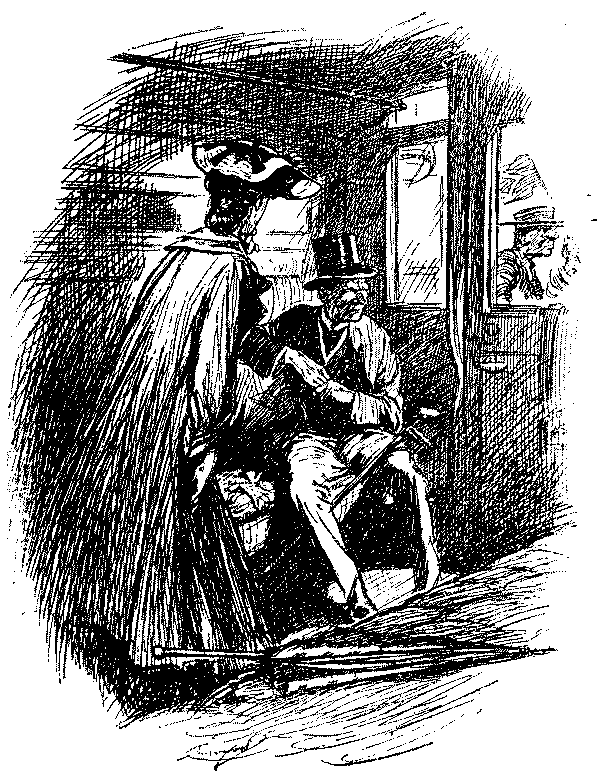
CHRISTMAS COMES BUT ONCE A YEAR
Cabby (to Gent who has been dining out). "'Ere y'are, sir. This is
your 'ouse—get out—be careful, sir—'ere's the step?"
Gent. "Yesh. Thash allri, but wersh my feet?"
[Pg 181]
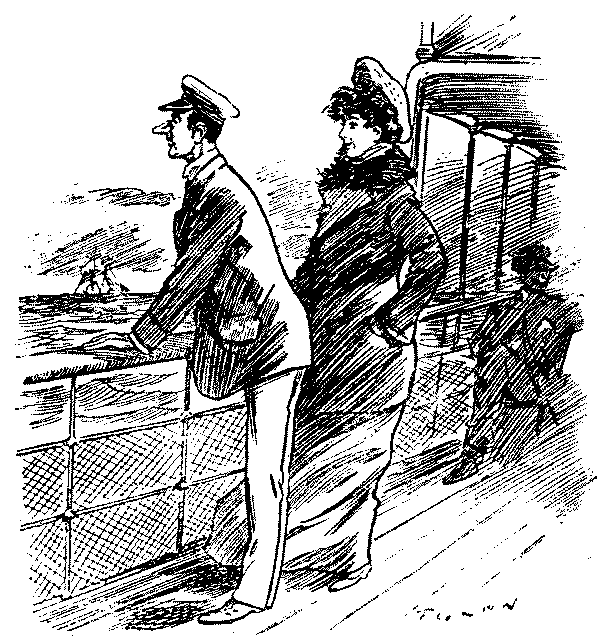
Employer (who simply WON'T take any excuse for
unpunctuality). "You are very late, Mr. Jones. Go back at once, and
come at the proper time!"
[Pg 182]
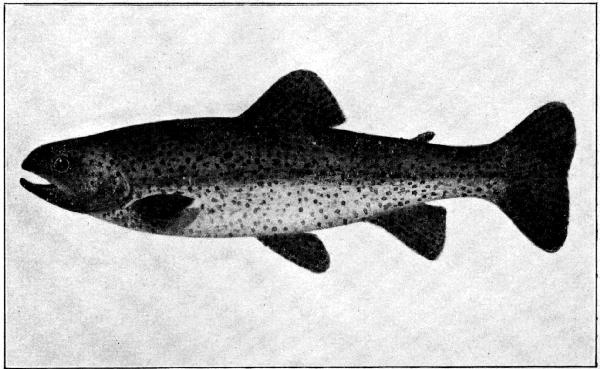
Hairdresser. "Hair begins to get very thin, sir."
Customer. "Yes."
Hairdresser. "Have you tried our tonic lotion?"
Customer. "Yes. That didn't do it though."
[Pg 183]
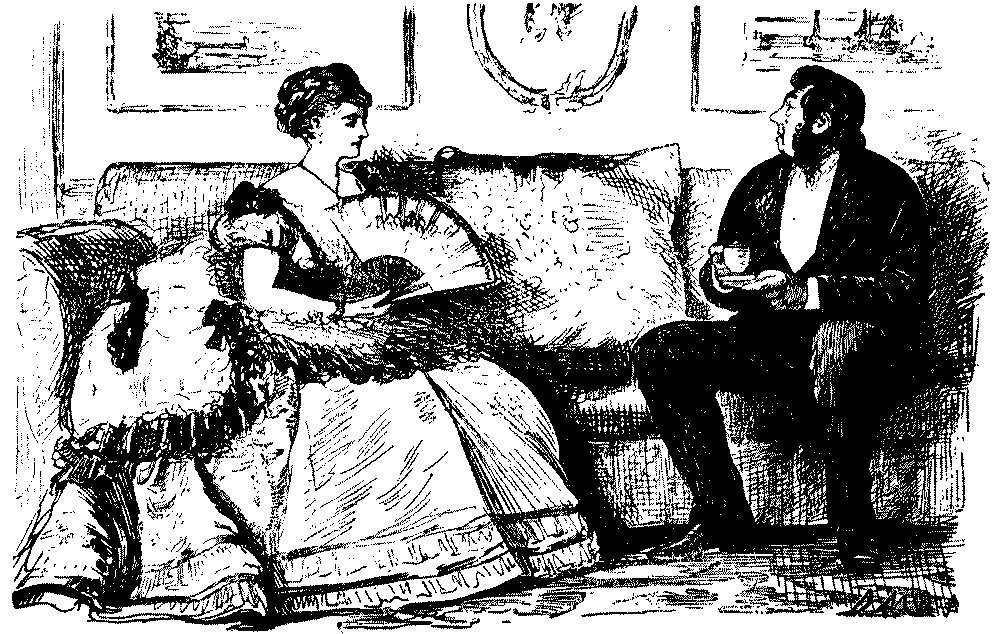
"I 'ear that Tholomon Arons 'as 'ad 'is shop burnt out!"
"Well, 'e 'th a very good feller, Aronth ith. 'E detherves it!"
[Pg 184]
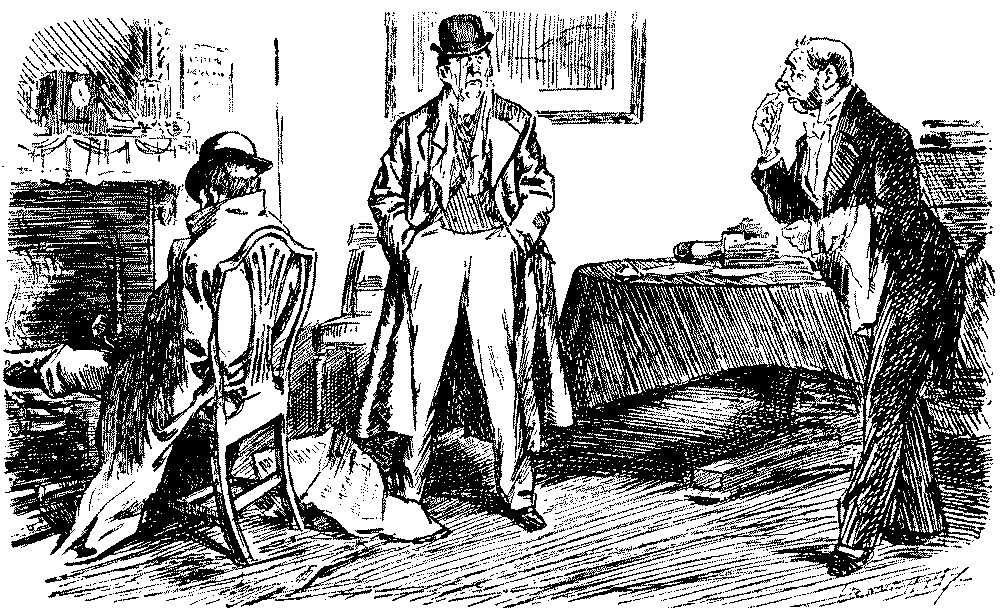
HOW THE POOR LIVE
The Rev. Mr. Smirk has brought an American millionaire friend to see for
himself the distressed state of the poor of his parish.
[He'll give them a little notice next time.
[Pg 185]
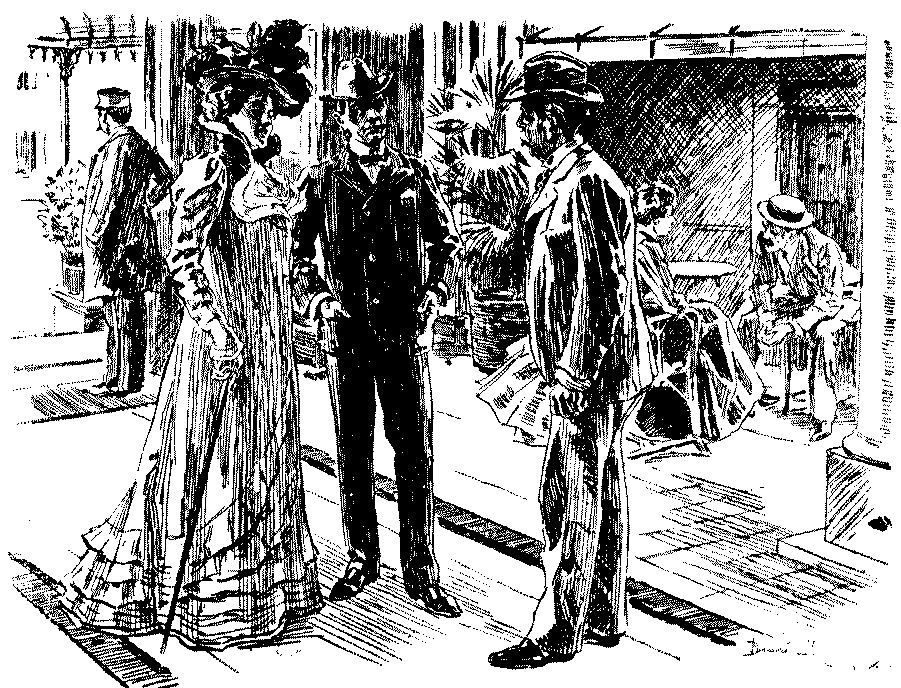
First Workman. "Wot's it say, Bill, on that old
sun-dial?"
Second Workman (reading deliberately). "It says,
'Do—to—day's-work—to—day.'"
First W. "'Do TWO days' work
to-day!' Wot O! Not me!"
[Pg 186]
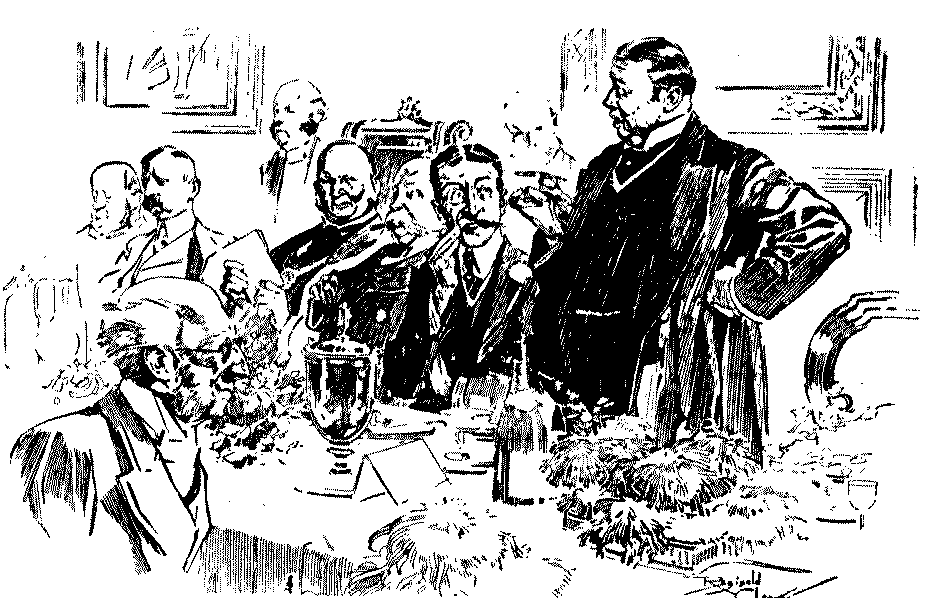
Social Evolution.
Tramp (to benevolent but inquisitive lady).—"Well, you see, mum, it were like this. I were a
'addick smoker by profession; then I got ill, and 'ad to go to the
'orspital; then I sold cats meat; but some'ow or other I got into low
water!"
[Pg 187]
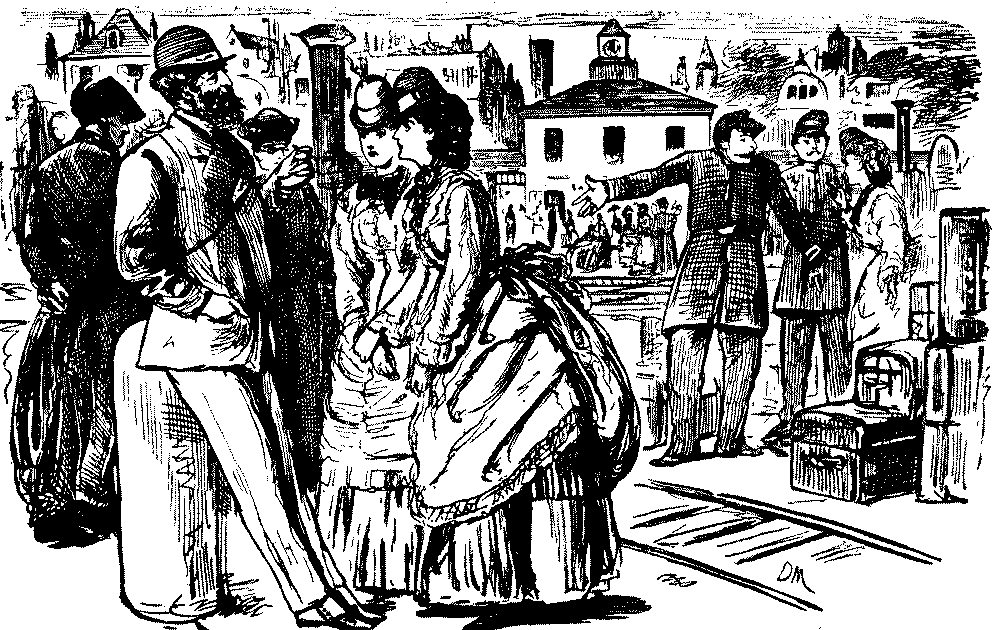
Miss Smith. "We've just come from Tannhauser, doctor."
The Doctor (very deaf). "Indeed! I hope you had better weather than
we've been having!"
[Pg 188]
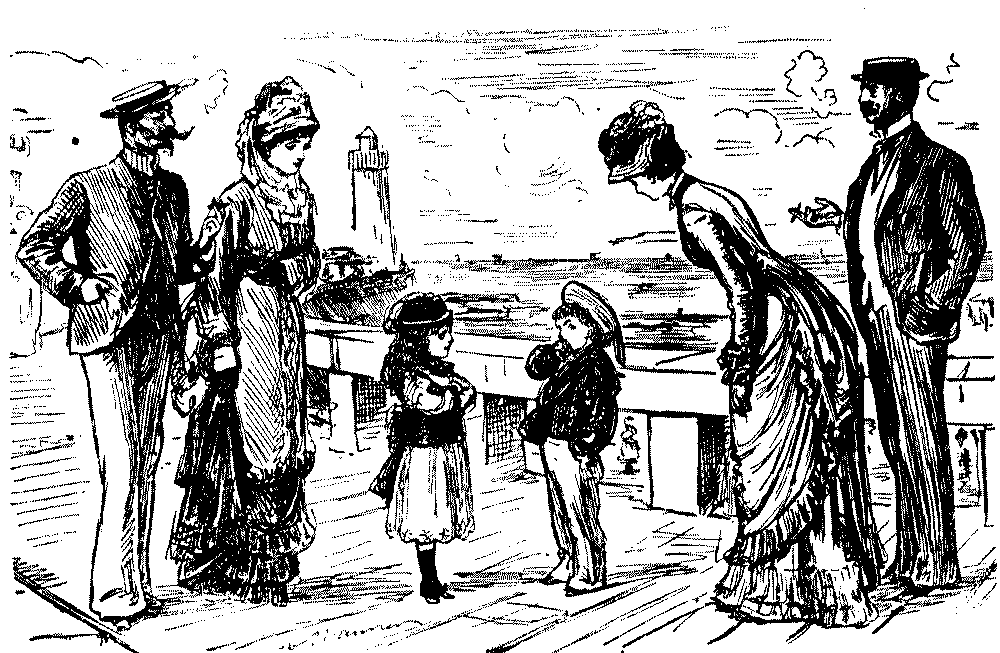
Familiar Phrase Explained.
Robinson. "Well, old chap, how did you sleep last night?"
Smith (who had dined out). "'Like a top.' As soon as my head touched
the pillow, it went round and round!"
[Pg 189]
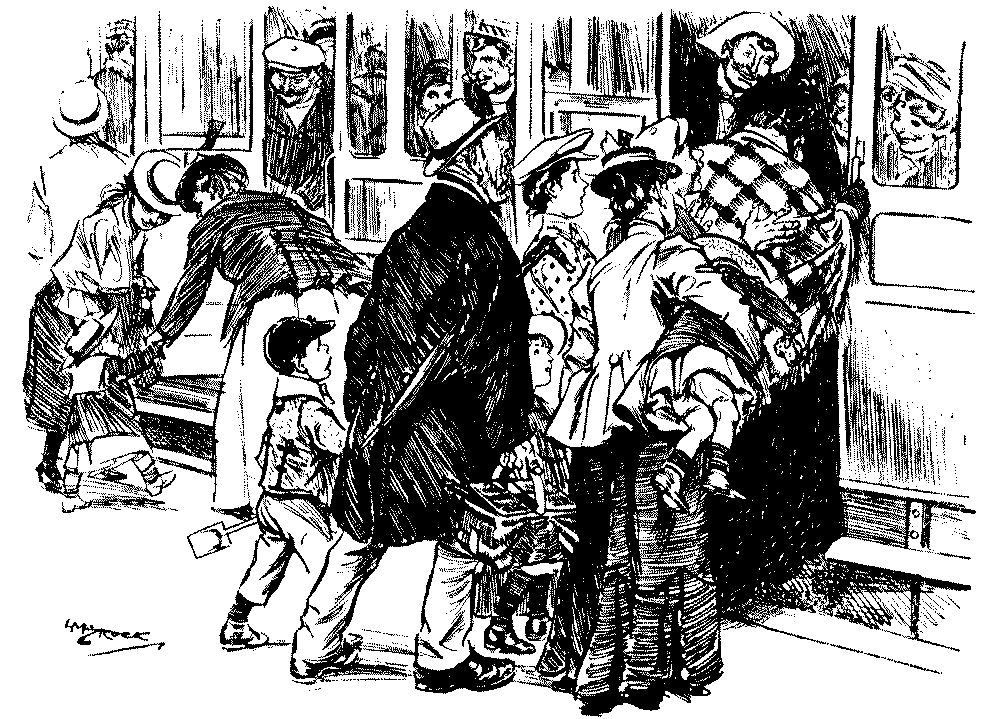
Cab Tout. "I say, Bill, lend me sixpence."
Cabby. "I can't; but I can lend you fourpence."
Cab Tout. "All right. Then you'l owe me twopence."
[Pg 190]
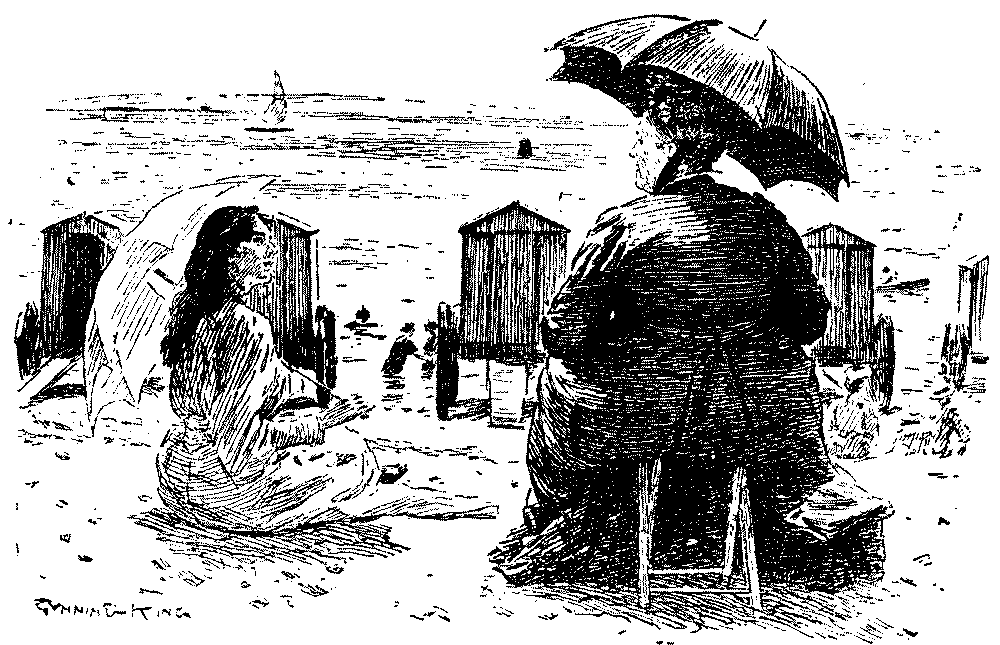
Barber. "Your 'air's getting very thin on the top, sir.
I should recommend our wash."
Customer. "May I ask if that invigorating liquid is what you have
been in the habit of using?"
[Dead silence.
[Pg 191]
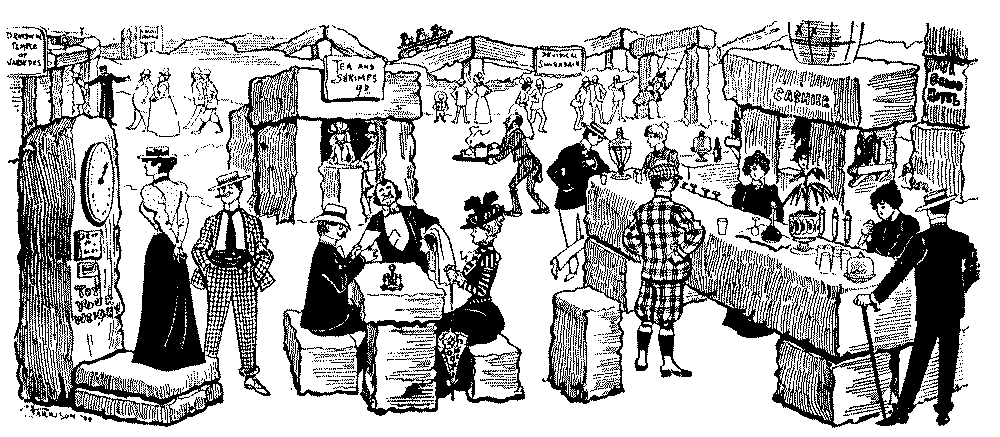
Foggy Weather.
"Has Mr. Smith been here?"
"Yes; he was here about an hour ago."
"Was I with him?"
[Pg 192]
meat, the Beef-eaters at the Tower have all turned vegetarians.
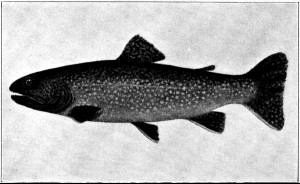
Featured Books

The Roots of the Mountains
William Morris
se Mountain-dwellers39VII.Face-of-god talketh with the Friend on theMountain50VIII.Face-of-god comet...

The Eight Strokes of the Clock
Maurice Leblanc
ed."Well, I had a great argument with my uncle and aunt last night. Theyabsolutely refuse to sign th...

The Pursuit of the House-Boat
John Kendrick Bangs
The hard features of Captain Kidd were thrust through70“Here’s a kettle of fish!” said Kidd74�...

Not that it Matters
A. A. Milne
lid black; /* a thin black line border.. */ padding: 6px; /* ..spaced a bit out from the gr...

The Adventures of Sally
P. G. Wodehouse
ly the success she had hoped it would be. The first atmosphere of uncomfortable restraint, caus...

Library of the World's Best Mystery and Detective Stories
ers of DeathHONORE DE BALZAC (1799-1850).Melmoth ReconciledThe ConscriptJEAN FRANCOIS MARIE AROUET D...

Duel on Syrtis
Poul Anderson
d the wind and the small burrowing things underfoot, lettingthe night speak to him.Alone, alone. The...

When the Sleeper Wakes
H. G. Wells
young artist lodging at Boscastle, walked from that place to the picturesque cove of Pentargen...
Browse by Category
Join Our Literary Community
Subscribe to our newsletter for exclusive book recommendations, author interviews, and upcoming releases.
Comments on "Mr. Punch's Life in London" :